

The Cost of Travel in Germany: My 2024 Budget Breakdown

Germany is one of my favourite European countries, and I’m fortunate to have visited a whopping four times so far. What can I say? I love regularly dipping in and out of this country on a mission to discover a brand new region, and I’m determined to explore as much of it as possible.
What I love about Germany is its stunning gothic architecture, the rolling hills of its countryside, the festive vibes that emerge during Christmas and Oktoberfest, the picturesque castles that leave you in awe, and the incredibly welcoming locals. I fell in love with the bustle of Berlin, the buildings of Frankfurt, the romance of Heidelberg, the arts scene of Munich, the beer of Cologne, and so much more.
And that’s just the cities! You can’t visit Germany and not venture out to some of the small villages. Seriously — they look as though they’ve emerged straight from the pages of a fairy tale. Throw some seriously beautiful castles into the mix, and you’ll be pinching yourself on a daily basis, wondering if Germany is even real .
In short, Germany is a world-class destination with so much to offer its visitors and explorers. Whether it’s partying the night away at one of Berlin’s most infamous nightclubs, sipping Gluhwein while wandering through cosy Christmas markets, or hiking the soaring mountains of Bavaria, in this country, there truly is something for everyone.
I’ve been recording every single cent I spend in the countries I travel through because I want to give my readers a realistic and accurate look at how much you can expect to spend in each country you visit.
Today, it’s Germany’s turn.
I visited Germany first of all on a high-end vacation with my partner, where I stayed in five-star hotels and dined in Michelin-starred restaurants. Next, I travelled there as a solo backpacker on the tightest of budgets, and then finally, just a few months ago, I took a trip to Germany as part of a couple on a mid-range budget. In other words, I have enough German travel experience to be able to tell you exactly how much you can expect to spend on a trip to this wonderful country, whatever your style might be.
So, let’s get started! Here’s how much it costs to travel in Germany:
How to Save Money on Flights To/From Germany
My fellow Europeans will already know that scoring an affordable flight on this continent is rarely too much of a problem. Thanks to the vast range of budget airlines, getting to and from a different country in Europe is unlikely to break the bank. As always, I recommend heading to Skyscanner to snag yourself a bargain on flights.
If you’re flexible with your itinerary, you’ll find the best deals by searching to flights to “Germany” rather than assuming that Berlin will be cheapest. You may find it costs far less to fly into Frankfurt or Cologne, for example.
Speaking of flexibility, one of the Skyscanner features I use all the time is setting my departure date to be across an entire month rather than a specific day. This shows the cheapest dates to fly: often just switching things around by a few days leads to some surprisingly big savings!
In general, you’ll find that it’s cheapest to fly to Germany outside of high season, which coincides with typical European summer vacation dates (late-June to late-August) as well as December, when Christmas markets reign supreme, and mid-September to early-October, when tourists pour into the country to celebrate Oktoberfest.
If you do have the freedom to visit outside of high season, I highly recommend it, as it’ll mean spending less on flights and accommodation while having to deal with fewer tourists. I’ve visited Germany in early-June, early-September, and mid-November, and found all three to offer up great prices and few crowds.
What if you’re not European?
Fortunately, getting to Europe from North America is surprisingly cheap these days, and I wouldn’t expect you’d need to pay more than around $400 for a return ticket. Allow me to introduce you to one of my favourite websites in the world: Secret Flying ! I’d estimate that 80% of the flights I book these days are due to a deal I’ve found on Secret Flying.
If, however, none of the deals on Secret Flying work for you, that’s when Skyscanner comes in! I mentioned them earlier: they check flights with practically every single airline in the world to ensure that if there’s a bargain out there, you’ll find it.

How to Save Money on the Cost of Accommodation in Germany
As always with travel, it’s possible to cut your accommodation costs down to zero if you have the time and patience to seek out an offer.
Housesitting is a great option for free accommodation. This is where you’ll take care of somebody’s house while they’re away, and usually look after their pets, too. It’s best for long-term travellers or retirees as you can’t pick and choose dates and destinations, so you need to have a lot of flexibility as to where you go and at what time of year.
If you do have that freedom, it’s a wonderful way to cut down your travel expenses, soak up some home comforts, and live like a local for a while. I have friends who have housesat in castles before! For free! Trusted Housesitters is the best site for getting started with housesitting, as they have the highest number of listings.
I’m suspecting, though, that for most of you, you’re not interested in the free accommodation and just want somewhere clean, safe, and affordable to rest your head each night. If that’s the case, there are several options available for you.
The first of these are hostels . Germany was the home of the very first youth hostel back in 1912, and there are now hundreds of hostels spread right across the country. While the original-style youth hostels ( jugendherberge ) often have an under-25 age limit, there are many other kinds that cater to backpackers, families, flashpackers and other travellers of all ages. They’re one of your best options for saving money.
Hostels in Germany are on a par with the rest of Western Europe, and you can expect to spend around €30-35 a night for a dorm bed for a well-reviewed hostel in most parts of Germany, with the price increasing to about €50 a night for the absolute best of the best.
When it comes to private rooms in hostels, you can expect to spend around €80 a night for a clean, basic room in a good location, so if you’re travelling with friends or with your partner, you may find it costs little more to grab some privacy over settling for two beds in a dorm room. €110 a night will get you an exceptionally well-reviewed private room in a hostel or hotel.
I use HostelWorld to find the cheapest hostels, as they tend to have the greatest number of listings at the lowest prices.
And, of course, there are always hotels, which usually come in at around € 110-170 a night for a good, clean, mid-range property in a central location. I always use Booking , as they have the most accommodation options for the cheapest prices.
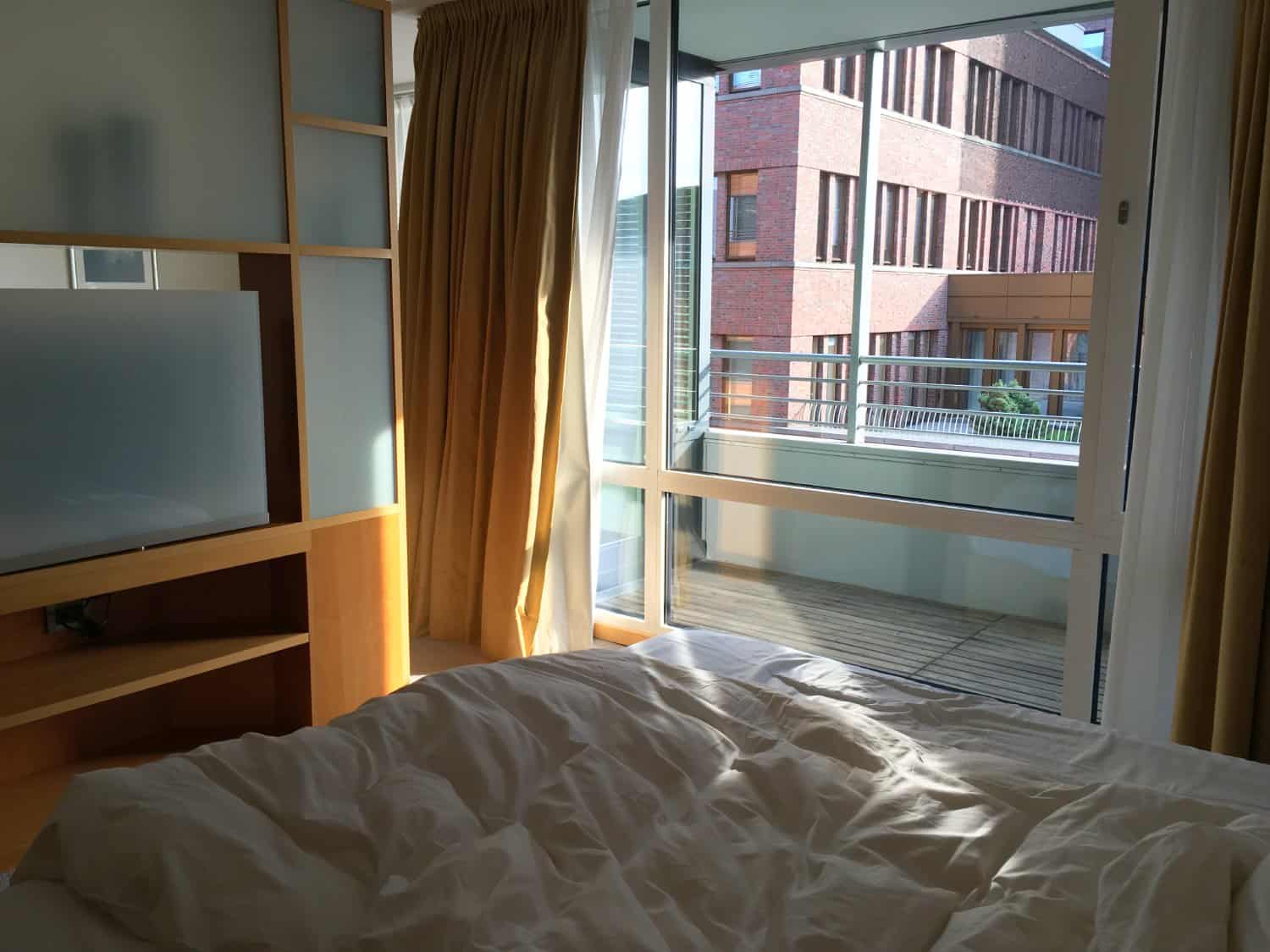
The Cost of Accommodation in Germany
Munich – Jugend- und Familienhotel Augustin ( €133 per night) : Where do I even start with this fantastic hotel? I originally chose it because of its great reviews, but even then it exceeded my expectations. It’s in a great location, right in the heart of the Schwanthalerhöhe district, easily walkable to Theresienwiese for Oktoberfest and nice and close to downtown. It’s clean and modern without feeling generic or sterile, which isn’t easy, and the staff always seemed only too happy to give advice or help with any queries I had. The bed was super-comfortable, and I loved the view over the garden from my room: it was very quiet and peaceful, especially considering the area. The complimentary breakfast was tasty and filling, and the bar and restaurant were relaxed and well-priced when I didn’t feel like going out one evening. Unsurprisingly, I’ll be staying there again next time I’m in Munich!
Frankfurt – The Flag Oskar M. (€164 per night) : Everything, and I mean everything, in this stylish hotel felt modern and fresh. The studio honestly seemed more like a mini-apartment, complete with its own kitchen and fridge, living room, and balcony to sit out on and enjoy the sunshine after a big day out in the city. Not that it was exactly difficult to get out and explore, mind you: the hotel is right in the heart of Frankfurt’s Old Town, so I spent most of my time walking or biking around. The breakfast options were good, but if they’re not included in your room rate, there were loads of great restaurants to choose from nearby instead.
Berlin – Numa Nook Apartments ( € 167 per night ): If you want to live like a local during your visit, Numa is the way to go. In fact, the chic décor and simple pops of colour will have you living like a classy local, and in a great area to boot. This spacious self-contained apartment is clean, modern, and bathed in natural light thanks to all of the floor to ceiling windows. I loved having a kitchen to use when I didn’t feel like going out to eat, and made heavy use of the large balcony whenever the sun came out! While there’s a metro station nearby, I often found myself walking between attractions: it’s only a couple of minutes’ to the designer shopping hotspot of Hackescher Markt, and a 15-minute stroll to the famous TV Tower. Along the way, there were so many cafes and restaurants that I found it hard to choose between them all!
Heidelberg – Hotel Heidelberg Astoria ( € 125 per night) : What a jewel! This cozy bed and breakfast is in a restored turn of the century villa that’s full of old-fashioned charm. There are only a few rooms, and mine was super-clean and comfortable, with freebies like Wi-Fi and parking that many hotels charge for. It’s in the lovely upscale neighbourhood of Neuenheim, which is safe and quiet while still being close to both the city center and Heidelberg Castle (they’re both less than a half-hour walk away). One end of the famous Philosophers’ Way is just a two minute stroll from the hotel, and the river is barely a minute further: I found its banks to be a lovely, peaceful place to wander in the evening. There’s an excellent onsite bar as well, with a great terrace that offers up unreal views of the city!
Cologne – Zur Guten Quelle ( € 102 per night): An easy walk to the city’s bridges, cathedral, and old town, but with plenty of places to eat and drink nearby, this charming family-owned hotel is the kind of place I really like to stay. The huge rooms felt elegant and sophisticated, but not old-fashioned: all of the fixtures were modern, from the TV to the bathroom and shower. I really liked the food in the restaurant: breakfast is included and was more than enough to set me up for the day, but it’s worth visiting later in the day as well to try out the cider. It comes from the owner’s own orchard! The location was perfect for my three days in the city, and I’d return to this hotel in a heartbeat!
The Cost of Transportation in Germany
In Germany, public transportation is easily accessible and available in many forms, whether you’re travelling in small towns, large cities, or across the country. The modern infrastructure and easy-to-follow connections help ease the nerves of any newbie exploring the country. It certainly did for me.
I was all about the public transportation during my time in Germany. Except for biking around in cities like Munich and Berlin, which was, let’s be honest, more fun (and cheaper!) than sitting on a bus or a train.
In fact, cycling is arguably one of the most used forms of transport by locals, and the country’s bike-friendly vibe makes it easy for visitors to join in the fun. Berlin on Bike offers rentals starting at €15 for 24 hours, for instance, while Pedal Helden in Munich has a great collection of city bikes starting at €18 for eight hours or €25 for 24 hours.
Buses and trams are easy to use and a cheap, reliable way to see a city. Each city runs its transportation system slightly differently, but prices are fairly consistent throughout the country. In Munich you can get Munich Card that includes unlimited public transport within one of two zones, reduced admission fees at various attractions, and a range of other discounts. Passes last between one and five days: I went for a two-day pass and found it very convenient and a definite money saver. Prices start at €18.90 for a 24-hour pass that includes transport within the main metro area.
The Frankfurt Card is even cheaper, costing just €12 for an unlimited 24-hour public transport pass with various discounts on museums, zoos, and tours as well. It’s €19 for two days, and includes travel to/from the airport.
Railway System
S-Bahn, or Stadtschnellbahn (‘rapid train’ in German), is independently owned and services the central and metro areas of large cities such as Berlin, Frankfurt, and Munich. A single-trip ticket in Berlin is €3.50 , a 24-hour pass is €9.90 , and a 7-day pass is €41.50 .
U-Bahn, or underground railways, are the fastest way to get from place to place within big cities, and I’ve found the BVG apps and website to be the easiest way to plan journeys and buy tickets for them. Pricing in Berlin is the same as for the S-Bahn above.
When it’s time to leave one city and venture to the next, the process will likely be a smooth one. Intercity Express (ICE), Intercity (IC), and EuroCity (EC) all connect larger urban areas in a clean and safety environment. I usually use Trainline to quickly filter through the options to find the best way to get from A to B: helpfully, it automatically highlights the cheapest fare. Below are a few example prices for routes I’ve travelled in the past.
- One-way from Munich to Berlin – €69.90
- One-way from Berlin to Frankfurt – €37.90
- One-way from Cologne to Munich – €36.25
- One-way from Munich to Frankfurt – €35.90
The Cost of Food in Germany
If I was to pick two words to describe traditional German food, they’d be “simple” and “hearty”! Germans love their meaty and dense foods, with some of the most popular dishes including schnitzel, smoked pork, bratwurst, brezels (pretzels), Käsespätzle (their take on macaroni and cheese), and Kartoffelpuffer (potato pancakes). Oh, and of course, don’t forget the beer!
Although you can find many inexpensive options in restaurants and cafes, the cheapest way to eat in Germany is by doing your own shopping at the grocery store. You can get a litre of milk for about a euro , a dozen eggs for €2.50 , and a loaf of bread for €1.80 . If you drink alcohol, grocery stores are the cheapest place to buy it: expect to pay €7 for a mid-range bottle of wine and €1.50 for a 500ml beer.
Of course, if you’re looking to explore the culinary scene, not every meal should be prepared in your hotel room! German eats are too good to ignore. Bear in mind that in Germany, hosts and hostesses at a restaurant don’t typically seat patrons; you seat yourself, and sometimes that means dining at the same table as strangers.
Breakfast: A basic breakfast costs between €5-9 and might include a cappuccino ( €3.50 ) and a croissant or other pastry ( €2-4 ). For something larger, expect to pay around €14 for bread with ham, cheese, and/or boiled eggs, €7 for muesli or porridge, and €10 for a Bauernfrühstück (farmer’s breakfast) with a hearty mix of potatoes, bacon, and egg.
Lunch is traditionally the main hot meal of the day in Germany, and while there’s been a bit of a trend towards smaller options like sandwiches and wraps in recent years, you’ll find many people still tucking into a three-course meal in the middle of the day. It’s usually made up of a soup, a main dish, and a dessert, but the detail varies a lot depending on the restaurant and where you are in the country.
This is where you’ll often find the schnitzel, bratwurst, and other meaty dishes I mentioned earlier, although fish and vegetarian options aren’t uncommon. Each dish is typically offered a la carte, so you can pick and choose depending on your budget and hunger levels.
To give an idea of price, for one of my recent meals I paid €6 for a starter of tomato cream soup, while the main course of pork and potatoes cost €15 and a piece of cake to finish was €4.50 . If you budget around €25-30 for your meal (not including drinks), you shouldn’t be far off.
Traditionally, dinner is usually quite light, and not all that different from some of the breakfast options. It’s often made up of sausages, bread and cheese or cold cuts, and a small dessert, and averages around €14 .
While it’s traditional for locals to have a large meal at lunchtime and a smaller meal for dinner, that doesn’t mean that everyone does it, or that you have to! You’ll find plenty of places offering hearty dinners or light lunches, so if you prefer to move your mealtimes around to suit your schedule, go for it!
One German food tradition that I just have to mention is Kaffee und Kuchen . In the late afternoon, friends will often meet up at a cafe or bakery for, as the name suggests, coffee and cake! For locals it’s often a social occasion as much as a snack break, but feel free to incorporate it into your own travel experience. I mean, how can stopping for coffee and cake ever be a bad decision? It’ll probably set you back about €6-10 , depending on where you are and how many delicious slices of cake you consume!
When it’s time to drink, Germany knows how to get it done. While it’s known for overflowing steins, bars and restaurants don’t limit their offering only to beer. At a decent midrange bar, expect to pay €8-12 for a cocktail (look out for happy hours!), and about €6 for a glass of wine or a bottled beer. The cheapest way to drink is to limit yourself to the (often excellent) local beers that are on tap: they’re usually substantially cheaper, at around €3-4 a pint in pubs throughout the country.
And finally, don’t forget to tip! Rules about tipping in various European destinations are fuzzy, but in Germany good service should be reflected with a 15% tip at the end of the meal.
The Cost of Activities in Germany
The types of activities you’ll do in Germany will likely change a bit depending on what time of year you visit. No matter when that is, though, there’s a lot to see and do, and the countryside is stunningly beautiful in any season.
Let’s start with the castles. There are something like 25,000 of them in the country, and they stand as powerful reminders of Germany’s history and heritage. You’ve almost certainly seen photos of Neuschwanstein Castle in Bavaria, for instance — there’s one earlier in this article if you missed it! It looks like something out of a fairytale, and it’s hardly surprising that it’s a UNESCO World Heritage Site. Entry costs €20.50 : book well in advance , as tickets sell out quickly during busy periods. Day trips also run from various nearby cities that usually include a visit to other castles in the area as well: it’s not the easiest place in the world to get to, so these can be a good option.
Heidelberg Palace is one of the largest surviving castle ruins in the country, and it transforms during the summer months with its renowned Castle Festival. The historic fortress becomes a magnificent open-air stage, hosting theatre and orchestral performances under the stars. Ticket prices are relatively affordable, starting at €16: the ticket is also valid for public transport in the area up to four hours before the show. If you want to visit the castle at other times, entry costs €9 , plus €6 for a guided tour which is the only way to see the interior.
If you are a lover of Christmas, plan your trip during the month of December and the first week of January- the official Christmas season in Germany ends on January 6. Christmas markets pop up all over the country in honour of the holiday, offering sweet treats, hot cider, beer gardens, gifts, games, and rides. It’s free to roam the markets, but I guarantee you’ll spend some money while you’re there. If you can resist a lebkuchen (gingerbread biscuit/ €3 ) and a steaming mug of glühwein (traditional mulled wine/ €4.50 ) on a cold winter’s night, you have a lot more willpower than me!
This list of must-dos wouldn’t be complete without the mention of Oktoberfest. Despite the name, it actually kicks off in September of every year, and takes over Munich for 16 days. Six million people come for the festivities during the two-week span to celebrate the German tradition with music, games, rides, Bavarian eats and an all-around great time. There’s no cost to attend Oktoberfest itself, but beware: a single beer stein can cost up to €15 !
If you aren’t able to make it during Oktoberfest, don’t fret, the legendary Hofbraeuhaus Munich is open year-round. Marketing itself as “the most famous tavern in the world”, if you have a vision of what a Bavarian beerhall might look like, this place doesn’t disappoint. Overflowing steins, gigantic shared wooden tables, and traditional German songs abound in this oversized restaurant, making it basically impossible to do anything but clink the stranger’s stein beside you. Spilt beer is a thing here, but it’s totally worth it.
The Berlin Wall is one of the nation’s biggest tourist, attractions but don’t expect to find much of it left. Much of it was knocked down and carted away in the chaotic days after the border reopened, and what’s left has morphed into a canvas for artists and taggers alike. If you’re a history buff, though, don’t write it off just yet: the importance of this place can’t be overstated.
The East Side Gallery is the largest remaining segment of the wall, and is easily accessible for tourists to stroll along and take in the significance. While you can visit by yourself for free, virtually all city tours include some time here in their itinerary, and you’ll learn a lot more from a local guide than just wandering around by yourself. You don’t have to pay a lot: a half-day walking tour will only set you back €20.
Germany is a country that is a delight to visit, with cities full of personality, a countryside full of heritage, and prices that by the standards of other nearby countries, are relatively affordable. Combine that with an extensive public transport system, and you’ve got no excuse not to explore this amazing country widely and well.
The Cost of Travel Insurance in Germany
If you’ve read any other posts on Never Ending Footsteps, you’ll know that I’m a great believer in travelling with travel insurance. I’ve seen far too many Go Fund Me campaigns from destitute backpackers that are unexpectedly stranded in a foreign country after a scooter accident/being attacked/breaking a leg with no way of getting home or paying for their healthcare. These costs can quickly land you with a six-figure bill to pay at the end of it.
In short, if you can’t afford travel insurance, you can’t afford to travel.
Travel insurance will cover you if your flight is cancelled and you need to book a new one, if your luggage gets lost and you need to replace your belongings, if you suddenly get struck down by appendicitis and have to be hospitalised, or discover a family member has died and you need to get home immediately. If you fall seriously ill, your insurance will cover the costs to fly you home to receive medical treatment.
I use SafetyWing as my travel insurance provider, and recommend them for trips to Germany. Firstly, they’re one of the few companies out there who will actually cover you if you contract COVID-19. On top of that, they provide worldwide coverage, don’t require you to have a return ticket, and even allow you to buy coverage after you’ve left home. If you’re on a long-term trip, you can pay monthly instead of up-front, and can cancel at any time. Finally, they’re more affordable than the competition, and have a clear, easy-to-understand pricing structure, which is always appreciated.
With SafetyWing, you’ll pay $1.50 a day for travel insurance.
How Much Does it Cost to Travel in Germany?
Accommodation: €140 per day for double rooms ( €70 per person) Transportation: € 27 per day Food: € 39 per day Activities: € 43 per day
Total amount spent per day: €179 per person
Related Articles on Germany 🌈 15 Best Things to Do in Berlin, Germany 🧭 23 Things to Do in Frankfurt, Germany 🏰 The Absolute Best Things to Do in Munich, Germany ⛪️ The Best Things to Do in Cologne, Germany 💣 Exploring a Berlin Air Raid Shelter as a New Zealander
Lauren Juliff
Lauren Juliff is a published author and travel expert who founded Never Ending Footsteps in 2011. She has spent over 12 years travelling the world, sharing in-depth advice from more than 100 countries across six continents. Lauren's travel advice has been featured in publications like the BBC, Wall Street Journal, USA Today, and Cosmopolitan, and her work is read by 200,000 readers each month. Her travel memoir can be found in bookstores across the planet.
Related Posts

The Cost of Travel in Mauritius: My Detailed Budget Breakdown

The Cost of Travel in Thailand: My Detailed Budget Breakdown

2023: My Travels in Review

The Cost of Travel in South Korea: My 2024 Budget Breakdown

What’s it Like to Travel in Liechtenstein?

What to Take On the Camino Primitivo: My Detailed Packing List
25 comments.
Great post! It looks like Germany is very affordable for Western Europe, which is lovely to hear. And the photos are stunning! Who knew that Germany had such beautiful countryside? I didn’t! Right, time to look at some flights ;-)
Flights to Germany? If so, yay! You’re going to have the best time , Amelia! Visit all the castles and eat all the food :-)
Nice post. Finding the balance between ultra budget and ideal comfort isn’t always easy but it looks like you’ve nailed it with those hotel recommendations. I spent three months living in Berlin and your price ranges are spot on.
I’m so happy to hear that! It always makes my day when a local, or semi-local, confirms that everything I say is legit, haha.
Perfect timing. Berlin is one of my oversights in Europe and I really want to visit it next year. I’m relieved to find out it probably isn’t going to be as expensive as my recent trips to London and Paris.
You can continue to relax — Germany is inexpensive in comparison to much of Western Europe, and definitely not as expensive as either London or Paris! Have a wonderful trip, Erica!
Berlin is definitely on my list of top places to go in Europe so I’m glad to hear that you like it a lot. I’m a Cold War-era buff and so it’s definitely a place I have to go – the lower prices are just an added bonus.
In that case, you’re going to love it! There’s so much history to dive into and learn about. And when you’re not in the museums, you can sip cold beer in the sunshine, which makes it a winning destination in my eyes.
I have a question about your backpacking days! I’m planning on spending two weeks in Germany while spending as little money as possible… where are the cheapest destinations for me to go?
To be honest, I find the big destinations to have the lowest prices because there’s simply more options available. So the bigger the city, the cheaper you can travel! In Berlin, for example, you’ve got dozens of hostels to choose from, across a whole range of prices (and quality, haha), and so many restaurants in the city — again, so many options that you can find much cheaper prices.
In the more remote areas, where you don’t encounter tourists, you’d expect prices to be lower, but it’s usually the opposite.
So I’d recommend hopping from city to city and eating all of the street food while staying in the cheapest hostels.
That makes sense. Thanks Lauren!
What a useful resource! It puts my travel blog to shame. Love Germany though and especially hiking around the Black Forest. I prefer the scenic countryside to the cities I think.
Thank you! That’s a tough call! I think I’d go for the cities over the countryside, but ask me again tomorrow and I’ll probably have changed my mind.
Nice post! It’s always fun and interesting reading your reflections, and I’m glad that you enjoyed your time in Germany. I have been to Berlin six times over the last decade and always had a fun time. As always, looking forward to reading more :)
That’s so kind of you to say! Thank you :-)
I have a fun tip for you. I recommend trying blablacar.de in Germany. It’s similar to Uber – it’s a rideshare with locals app – but so affordable, and with it, you’ll be able to travel from one city to another for roughly €20-25. I used it all over my time in Germany and saved a lot of money while bringing more comfort to my life. I recommend checking for rides while you’re already in the city, as most of the offers are last-minute ones. It’s a great way to meet the locals and so much fun!
That’s a great tip, Garcia! I’ll add it to my blog post to ensure my readers see your advice.
Dear Lauren First, I must say that I love your blog and your writing style! It inspired me to start a blog of my own (once I find the right topic to write one on^^) . I am from berlin, so I was happy you wrote something on my country! Germany is really great for budget travelers, in fact, it’s one of the cheapest Western European countries to travel to. And Berlin, especially, can give travelers all the flair for half of what you would pay in Paris or London or Rome.
I wholeheartedly agree! What a wonderful and inexpensive country. You’re lucky to call it home!
Good for you! It sounds like you loved your time in Germany. Will you write about what you did in Berlin?
Yep! I’ve already published a huge post on the best things to do in Berlin , which covers all of my favourite activities in the city!
Just a note to say I’m so glad you didn’t sell out and get a comped hotel stay in Germany like 95% of other travel bloggers would have done! The fact you always pay for everything out of your own pocket gives your blog so much more integrity. Thank you!
Thanks so much, Sam! I always want to show my readers that travel is affordable and attainable and I can’t do that if I don’t pay for everything myself :-)
Hi Lauren! I am from Berlin and I am so happy that you enjoyed your many trips in Germany. Next time you’re in Berlin, I recommend you to just stroll around Prenzlauer Berg especially Kastanienallee and enjoying a beer in a Biergarten. Recommend you the very girly pink beer which actually tastes more like rasberries than beer, its called Berliner Weiße (i love it :) ), or a Radler, beer mixed with sprite.
I’ve definitely had a Radler before, but the raspberry beer sounds right up my alley! I’ll have to make my way back soon :-)
Leave a reply Cancel reply
Your email address will not be published. Required fields are marked *
Meet Lauren Juliff
Germany Trip Cost: Pricing for Flights, Food & Accommodation
Plan your Germany trip with our guide on flights, food, & accommodation costs. Get expert budget tips for a memorable stay without overspending.

Germany is the home of carnivals, festivals, cathedrals, monuments, castles, palaces, beer, and sausages. The legal drinking age is 16, and over 2 million gallons of beer are consumed during the Oktoberfest carnival. There's so much that Germany offers locals and visitors alike. But what does it cost to travel to Germany?
The average cost of a 7-day fun trip to Germany from North America is $1800 per person. This budget covers your $800 round-trip flight tickets from most major airports and leaves you $130 to spend daily. The $130 daily average covers $50 for accommodation, $20 for transportation, $30 for food, and $30 for activities and attractions.
Germany is a slightly expensive European country, but it's well worth the money. There are so many things to do and see that you'll never be bored throughout your stay in Germany.
The rest of this article will try to cover a German travel budget. It'll also cover tips and tricks to help you save money on your trip. Let's go!
How Much Money Should You Take On A Trip To Germany

$1800 is enough to take you to Germany and afford a mid-range hotel, transportation, food and drinks, and activities. The median cost for flight tickets to Germany is $800.
With this budget, you will enjoy more paid activities and visit many more locations. You can stay in a private Airbnb room or a mid-range hotel for $50 per night. This lodging comes with a complimentary breakfast and clean facilities.
The available complimentary breakfast means that $30 daily will be enough for lunch and dinner. You can eat at restaurants and enjoy a few drinks without exceeding your budget. However, if your budget is quite low, you can mix eating out with cooking your food or enjoying street food such as sausages and bratwurst .
Luxury travels afford you more flexibility, and the budget is not limited. $350 daily will afford better lodging options, fine dining experiences, and any activity you want.
Traveling To Germany On A Tight Budget

The best thing about Germany is that it caters to every type of traveler. Backpacking in Germany is easy without breaking a sweat. The average cost of a 7-day trip on a tight budget is $820 .
Germany is a major European country, and you will always find flight deals from several airlines. You need $400 or less for round-trip flight tickets if you book in advance and travel during the off-peak season.
With some adjustments, you spend an average of $60 daily on travel expenses. Germany's hotels cost $10-$20 per night with complimentary breakfast and Wi-Fi. Couchsurfing saves money on lodging, and the locals give insights into the country outside tourist trails.
Most hostels have kitchen facilities you can use to cook your meals. You can get cheap meals from outdoor vendors for $2-$4 or eat Turkish/Middle Eastern cuisine for $5. Add $5-$10 to your budget for alcoholic beverages.
Germany's transportation system is advanced, and you can save a lot of money. You will need $3 daily for local transportation and $10-$20 for intercity travel. Rideshare services are also available, and hitchhiking is safe in Germany.
You can engage in mostly free activities such as hiking or free walking tours with a guide. Museums offer free admission on some days, and you can find this information on their websites. The average cost of other activities is $15 per day.
Basic Expenses On Your Vacation To Germany
It is easy to become stranded if you don't have a proper budget before traveling. But what should a proper budget contain? Here's a detailed breakdown of every expense in a typical German travel budget.
1. Flight Tickets

As usual, flight costs are the first and most significant part of your travel budget. Flight costs depend on the season, how early you book, and the flight day. The average price of a round-trip flight ticket from North America to Germany is $800.
This price can increase or decrease depending on the season. Summer months are peak travel seasons to Germany, and flight tickets increase to $1200 during this time. Late spring and Autumn see fewer people going to Germany, and flight tickets decrease to $500 or less .
Germany is a major European country that sees a lot of international flights. An unlimited number of budget airlines fly this route, making cheaper flights possible. So it's advisable to always check the airline's website for details about payment while preparing your budget.
2. Accommodation

There are many accommodation styles all over Germany, even in small towns. Accommodation is also affordable compared to most other European countries. Surely you'll find something that perfectly suits your budget. However, the accommodation cost also depends on the city you are visiting.
Hostels across the country cost $10-$20 for a bed in a dorm or $40-$60 for a private room. Most hostels have free Wi-Fi and complimentary breakfast. Wild camping is illegal so expect to pay $5-$10 per night for a campsite .
Mid-range hotels start at $30 per night and have standard facilities. There are Airbnbs scattered across the country, and a private room cost $30-$45.
Luxury hotels and vacation rentals are readily available in Germany. The average cost of a 4-5 star hotel is $350 per day. The price of vacation rentals per day starts from $100 and above.
3. Transportation

Germany has one of the most efficient transportation systems in the world. All the major cities and smaller towns are connected in a way that makes travel easy.
Public transportation in major cities includes buses, trams, and subways. A single ticket costs $3, a day pass $10, and a three-day pass costs $25.
Buses are perfect for intercity travel and usually have the cheapest rates. Although buses are relatively slow, they are punctual and have comfortable seats, free Wi-Fi, and air-conditioning. The average cost of a trip between cities is $25 .
According to Omio , a site that acts like a Journey planner, the train is the most efficient way to travel between cities, but it comes at higher costs. High-speed trains are faster and more expensive than regular trains, and the average price is $90 and $20, respectively. Last-minute train tickets are more costly so remember to book in advance.
4. Food & Drinks

Food and drinks in Germany are not known to be cheap, even for regular standard meals. Most accommodation types offer complimentary breakfast, leaving you with lunch and dinner costs.
Lunch and dinner would cost an average of $10 and $20 daily, respectively. Or you can spend $2-$4 on outdoor sausages and bratwurst. A cheaper option is eating Turkish or Middle Eastern cuisine at only $5.
Your daily food budget should be around $30-40$. Alcoholic beverages cost $5-$10, often increasing your food budget. Tap water in Germany is safe to drink, and there's no need to buy bottled water .
The average cost of a fine dining experience in upper-class restaurants is $50. Germany has a tipping culture, and the tips on meals are usually 5-10% of your bill.
5. Activities & Attractions

Germany is a travel destination with year-round activities. Entrance fees, specific tours, and special activities such as skiing or snowboarding cost an average of $30 per day.
There's no limit to sightseeing activities, for example visiting magnificent castles and palaces. The average cost of a ticket to see any of these fortresses is $15-$50. Entrance fees to museums cost an average of $5-$15, although some allow free entrance.
You can visit nature parks and walk the cities without spending money. Walking tours are a thing because of Germany's rich history, and they are usually free. However, tipping your tour guide $5-$10 is a nice gesture you'd enjoy trying.
Festivals are a year-round activity, for example, the festival of lights in October and Oktoberfest in late September to early October. These festivals provide an opportunity to meet new people and enjoy a time away from the bustles of the city.
You can also enjoy winter activities such as cross-country skiing trails in the black forests or ski resorts in Bavaria.
All German cities have a rich history and natural beauty. It is easy to lose track of your budget for activities and overindulge. But proper planning helps you to engage in the best activities without exceeding your budget.
6. Travel Insurance And Miscellaneous Bills

Missed flights, medical emergencies, and stolen or lost luggage are some of the reasons travel insurance is necessary. Always compare quotes from different agencies and choose the best option that includes everything.
Extra cash for souvenirs, tips, and unexpected expenses is a good idea. With an additional $100, you can pay for that random, last-minute ticket to a concert .
Tips To Save Money On Your Vacation To Germany
Germany offers visitors several ways to cut costs and still have a fulfilling experience . However, you'll need to know how to go about it. Remember how easy it is to overindulge and spend beyond your budget? Don't worry; we've provided you with some tips you can employ on your vacation. Take a look.
1. Travel Off-Peak Season

Summer is peak season in Germany, and as expected, the traffic into Germany peaks at this time. This leads to a hike in flights, lodging, and activities costs. You can expect to pay more for most things if you fix your trip within this time.
Winter, Spring, and Autumn months are the cheapest to visit Germany. Snowboarding, skiing, and tobogganing are winter activities you will enjoy at a reasonable cost and lesser crowds. You can enjoy medieval castles in Bavaria in spring or go on hiking excursions in Autumn .
The cost of accommodation during the shoulder season also decreases. You get the best option at a lesser price. Although Autumn is shoulder season, late September to early October is the Oktoberfest carnival. So you must still be careful, so these activities don't increase your expenses.
2. Book Flights & Accommodations In Advance

Booking flight tickets, accommodation, and train tickets way ahead will save you some money. Europe has a vast array of budget airlines that make finding cheap flights easy. Set departure dates 3-6 months earlier on the airline's website, and it will display the cheapest flying dates .
Likewise, more quality accommodation options that fit your budget are available when you book in advance. Visit travel sites to find accommodation websites. Go to their websites and search for good deals that suit your budget. If traveling long distances by train, booking ahead will save you a lot of money.
3. Save Money On Accommodation By House-Sitting

House-sitting is a great option for flexible and long-term travelers. You will stay in a house for free and take care of the owner's house while they travel or go to work .
This way, you cut down the cost of accommodation while enjoying the comfort of a home. It will also reduce feeding costs because you can buy groceries cheaper and prepare meals yourself. However, most homeowners may have rules they won't want you to break while in their homes.
4. Get A Tourism Card
A tourism card is handy when you are traveling to major cities. It is cheaper to get a tourism card than pay individually for each item .
It comes with unlimited transportation and discounts in restaurants. You will also get free entry into significant museums and attractions.
5. Cook Your Own Meals

Eating out will quickly eat into your budget while on vacation. Consider cooking your meals if your accommodation has kitchen facilities.
$40-$50 grocery shopping can feed you for up to a week in Germany . This amount will get you food items such as eggs, cheese, pasta, bread, chicken breasts, beef, sausages, etc.
Supermarkets usually offer discounts in the evening, especially on fresh products. Therefore, we recommend grocery shopping in the evening.
73 Basic Dutch Phrases for Your Next Trip to Netherlands 🇳🇱
Learn essential Dutch phrases for a smooth trip to the Netherlands. Perfect for travelers looking to connect with locals and enrich their experience.
Win a $500 Flight!
Embark on the adventure of a lifetime! Enter our Dream Journey Sweepstakes for a chance to win a $500 travel voucher, redeemable with any major US airline. Whether it's sandy beaches, bustling cities, or tranquil mountains, your dream destination is just an email away!*

Is SunExpress Safe? Unveiling the Truth Behind Your Flight Fears
When you're planning your next sunny getaway, the airline you choose can make or break your experience. That's where SunExpress comes into play. You've probably wondered, "Is SunExpress safe?" It's a valid question, especially in today's travel climate where safety is at the forefront of everyone's minds.

Is Eurowings Safe? Unveiling the Truth Behind Your Flight Fears
When planning a trip, safety is always at the top of your mind. And if you're considering flying with Eurowings, you're probably wondering just how safe it is. After all, you want your journey to be as smooth and worry-free as possible.

Is Lufthansa Safe? Discover What Sets Their Safety Standards Apart
When you're jetting off to your next destination, safety is always at the forefront of your mind. And if you're considering flying with Lufthansa, you're probably wondering just how safe it really is. Well, you're in the right place to find out.

Uncover Hidden Gems: Best Places to Visit in September for a Perfect Escape
September's the sweet spot for travel. It's when the summer crowds thin out, but the weather's still nice. You get the best of both worlds: fewer people and great days to explore. Imagine walking through a city or hiking a trail without bumping into tons of tourists. Sounds awesome, right?

December Delights: Europe's Coziest Villages for a Magical Winter Escape
December in Europe is like stepping into a holiday card. Picture this: snowflakes gently falling, bright lights, and the sweet smell of hot chocolate. It's a magical time to explore, with each city offering its own winter wonderland. Whether you're dreaming of cozy markets or breathtaking snowy landscapes, Europe's got you covered.

November Wonders: Top European Spots & Events to Explore
November's a cool month to explore Europe. It's not too cold yet, and the summer crowds have gone home. You get to see a different side of places, with cozy vibes and fewer people around.

February Gems: Top Unspoiled Destinations for Your Winter Escape
February might seem like a sleepy month, but it's actually a great time to explore some cool spots around the world. While some folks are still shaking off the holiday buzz, you could be packing your bags for an adventure. Whether you're into sunny beaches or snowy mountains, there's a perfect February destination waiting for you.

Ultimate Guide: Top Places to Live in Germany for Every Lifestyle
Thinking about moving to Germany or just curious about the best spots to call home? You're in the right place. Germany's got a mix of vibrant cities, quaint towns, and stunning landscapes that cater to just about every taste. Whether you're after the hustle and bustle of city life or the quiet charm of countryside living, there's a spot in Germany waiting for you.

Best Time to Visit Germany: Beat the Crowds & Savor Seasonal Splendors
Deciding when to visit Germany can be a bit tricky, but don't worry, we've got you covered. It's all about what you want to see and do. Whether you're into exploring castles, enjoying festivals, or just soaking in the beautiful scenery, there's a perfect time for you.

Best Time to Visit Munich: Seasonal Secrets for an Authentic Experience
Planning your trip to Munich? You're in for a treat! This city is packed with cool stuff to see and do, from amazing festivals to beautiful parks. But when's the best time to visit? Let's break it down so you can make the most of your trip.

Best Time to Visit Berlin: Unlocking Seasonal Secrets for an Ideal Trip
Deciding when to visit Berlin can be tricky. You want the weather to be nice, but you also don't want to bump into too many tourists. Lucky for you, there's a sweet spot where you get the best of both worlds.

Cologne Safety: Am I Safe to Travel to Cologne, Germany in 2024?
Planning a trip to Cologne raises safety questions. With its iconic cathedral and rich culture attracting millions, how safe is the city for tourists?

Hamburg Safety: Am I Safe to Travel to Hamburg, Germany in 2024?
Planning a trip to Hamburg? Safety is crucial for a memorable visit. Discover how this bustling, culturally rich German port city ranks in safety.

Frankfurt Safety: Am I Safe to Travel to Frankfurt, Germany in 2024?
Planning a trip to Frankfurt, prioritizing safety is key. As Germany's financial hub, it's bustling yet raises questions about safety among its skyscrapers.

Munich Safety: Am I Safe to Travel to Munich, Germany in 2024?
Planning a trip to Munich? Safety is key. Explore its history, culture, and beer gardens with peace of mind. How safe is this Bavarian capital for visitors?

Berlin Safety: Am I Safe to Travel to Berlin, Germany in 2024?
Planning a trip to Berlin raises the question: "Is it safe?" Despite its rich history and vibrant culture, attracting millions, safety concerns exist.

72 Basic German Phrases for Your Next Trip to Germany 🇩🇪
Learn 72 essential German phrases for your trip to Germany, from greetings and ordering food to shopping and emergencies. Master the basics and impress locals with this ultimate guide to German language and culture.

9 Best Historical Places to See in Berlin
Explore 9 top historical sites in Berlin, from the Berlin Wall Memorial to the iconic Brandenburg Gate. Perfect for travelers eager to experience history.
You may also like...

Best Time to Visit Lithuania for Seasonal Adventures & Local Festivals
Planning a trip to Lithuania and wondering when's the best time to go? You're in the right place. Lithuania, with its stunning landscapes and rich history, offers a unique experience no matter the season. But, if you're looking to make the most of your visit, timing is key.

Best Time to Visit Hungary: Seasonal Secrets for an Authentic Experience
Deciding when to visit Hungary can be tricky, but don't worry, we've got you covered. This beautiful country shines in every season, but knowing the best time to go can make your trip even more special.

Best Time to Visit Estonia: Discover a Winter Wonderland Like a Local
Deciding when to visit Estonia? You're in for a treat, no matter the season. But if you're looking for the best experience, timing is key. This Baltic gem offers something unique with each season, from white winters to sunny summers.

Best Time to Visit Armenia: Winter Wonderland & Cultural Fests Unveiled
Deciding when to visit Armenia? You're in for a treat! This hidden gem has got it all - from cool, snowy winters to warm, sunny summers. But to get the best out of your trip, timing is key. Let's dive into when's the perfect moment to pack your bags for Armenia.

Best Time to Visit Havana: Seasonal Guide for Cultural Festivities
Planning your dream trip to Havana? You're probably wondering when's the best time to pack your bags and go. Well, you're in luck because we've got the inside scoop to help you make the perfect choice.

Best Time to Visit Oaxaca: Uncover Seasonal Secrets & Local Celebrations
Deciding when to visit Oaxaca? It's all about finding the perfect balance. You want great weather, fewer crowds, and lots to do, right? Well, you're in luck because Oaxaca has got it all, but timing is key.
The travel site inspired by travelers and locals alike. Find amazing destinations, unique trip ideas, the best hotels, and most comfortable resorts.
- EN - English
- PT - Portuguese
- ES - Spanish
- How it works
- Become a Host
- Download the app
Top Destinations
- United States
- United Kingdom
What type of experience are you looking for?
- Non-Profit School
- Permaculture project
- Eco Village
- Holistic Center
- Guest House
- How Worldpackers works

Learn from the most experienced travelers of the community
Traveling with worldpackers, planning and budgeting for travel, make a living while traveling as a lifestyle, travel with worldpackers.
- Using Worldpackers
- Work exchange
- Social impact
Plan your trip
- Women traveling
- Budget travel
- Solo travel
- Language learning
- Travel tips
- Get inspired
- Digital nomads
- Travel jobs
- Personal development
- Responsible travel
- Connect with nature
Top destinations
- South America
- Central America
- North America
- More destinations
- WP Life WP Life
- Exclusive discounts Discounts
- Europe travel tips
Germany on a budget: a guide with the best tips and the cheapest places to visit
The ultimate guide to traveling Germany on a budget! Includes budget travel tips, cheap places to visit, interesting work exchanges to try, and more!
Gabrielle Budget Travel With Gabby
Apr 08, 2024
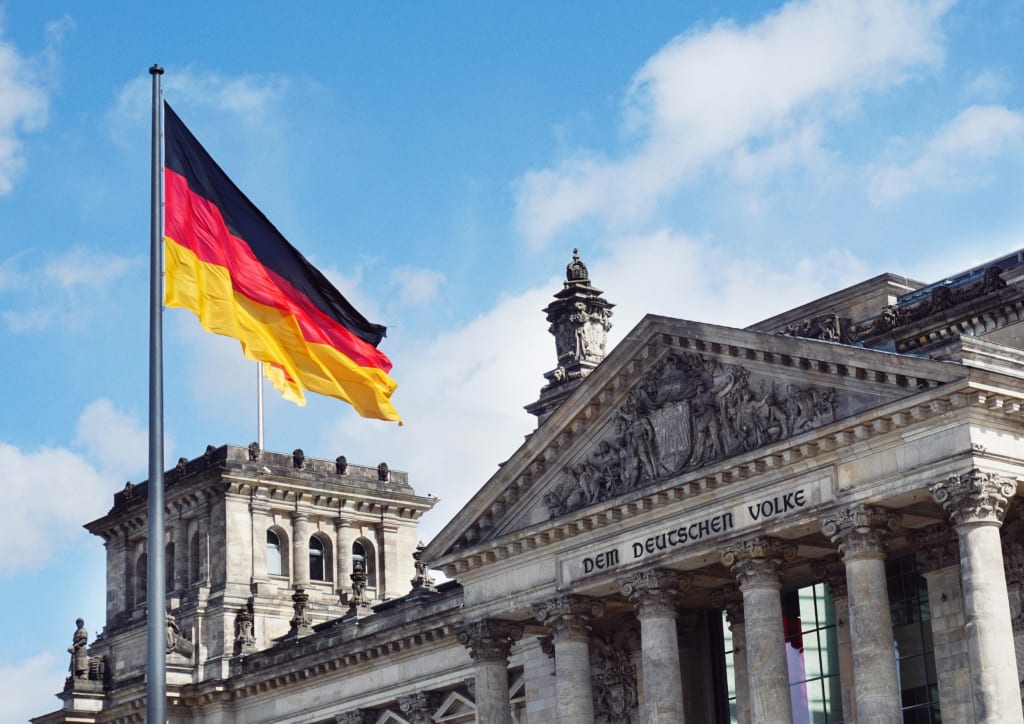
Germany is one of the best places to visit in Europe ! With plenty of history, architecture, culture, food, and nature to experience, there is no shortage of things to do in Germany.
From festive Christmas markets, to majestic castles, to cosmopolitan cities, to beaches, forests, charming towns, and more, there is something for everyone in Germany.
And due to its central location in Europe, it is very easy and convenient to visit while backpacking around the continent . Being a country that's wedged right in the center of Europe, the cost to travel there is pretty average. The affordability is great!
Because Germany is centrally located on the continent, it is more expensive than eastern countries like Romania or Bulgaria, but it is cheaper than pricey western countries like France or Spain .
If you want to travel Germany on a budget, it can definitely be done! You just have to know the right budget travel tips to make your stay cheaper. That’s where this article will come in handy!
We will cover everything you need to know for how to travel Germany on a budget! From cheap places to visit, to affordable accommodation and work exchanges , to extra budget travel tips, you can easily plan a visit to Germany with very little money.
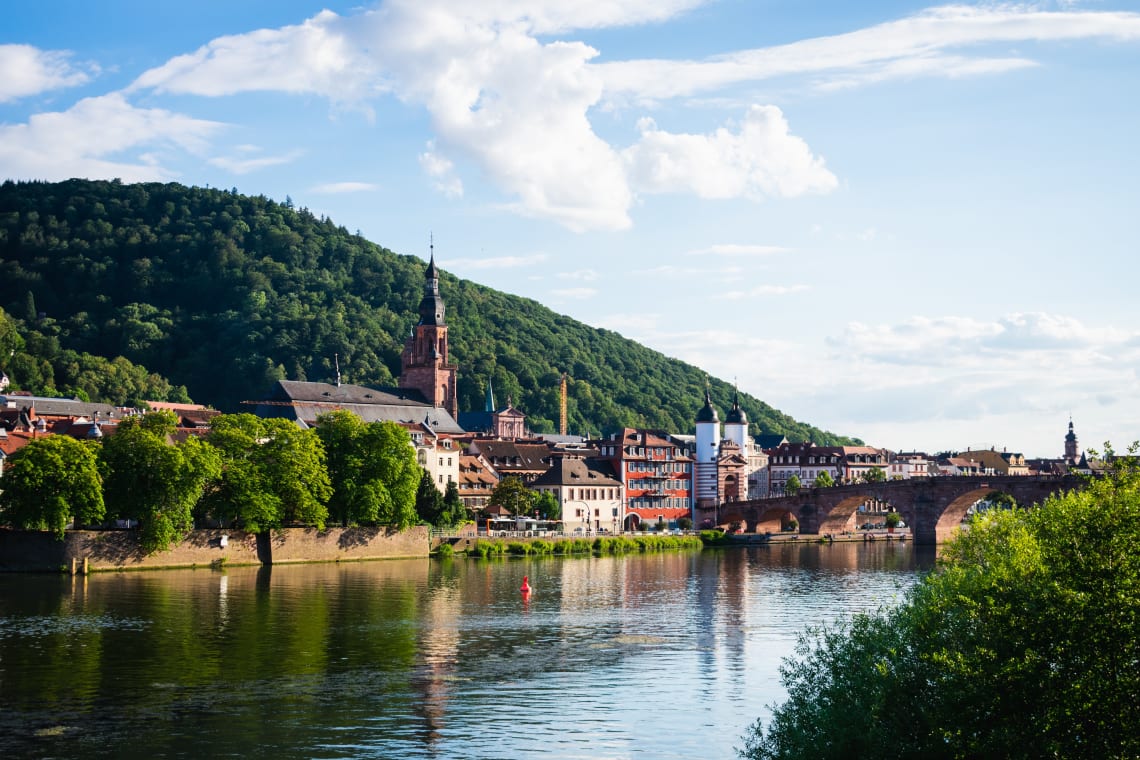
How to travel to Germany on a budget?
Despite Germany being one of the most expensive countries in Europe, it is very possible to explore this fascinating country cheaply.
Here's a quick overview of traveling to Germany on a budget and how you can make the most of your time with little money.
Find cheap transport with budget airlines and rail passes
Europe is full of budget airlines that offer incredibly cheap flights around the continent. Airlines like Ryanair, Wizzair, Norwegian, and Easyjet have flights around Europe for as cheap as 20 Euros one way! If you’re flying into Germany, check budget airlines to see if they have any cheap flights.
If you’re traveling Europe by land, you can enter Germany by train or bus . Germany has an amazing public transport system, and buses are really cheap for traveling to Germany. Trains are a bit more expensive, but if you book your train tickets a week in advance the prices may be cheaper . Also, look into Eurail passes if you’re going to be doing a lot of train travel!
Visit Germany in the winter
The months of December, January, and February are winter in Germany, and they are the cheapest time to travel!
Winter can get very cold and there may be snow! Because of the cold, sightseeing is slightly less enjoyable and therefore fewer people visit Germany in winter .
Since winter is off-season for travel , flight prices drop significantly during this time. Accommodations and tours may also offer cheaper prices. Just avoid the school holidays times around Christmas, as everything gets really crowded.
So just pack warm clothes, book a cheap winter flight, and get ready to explore Germany on a budget!
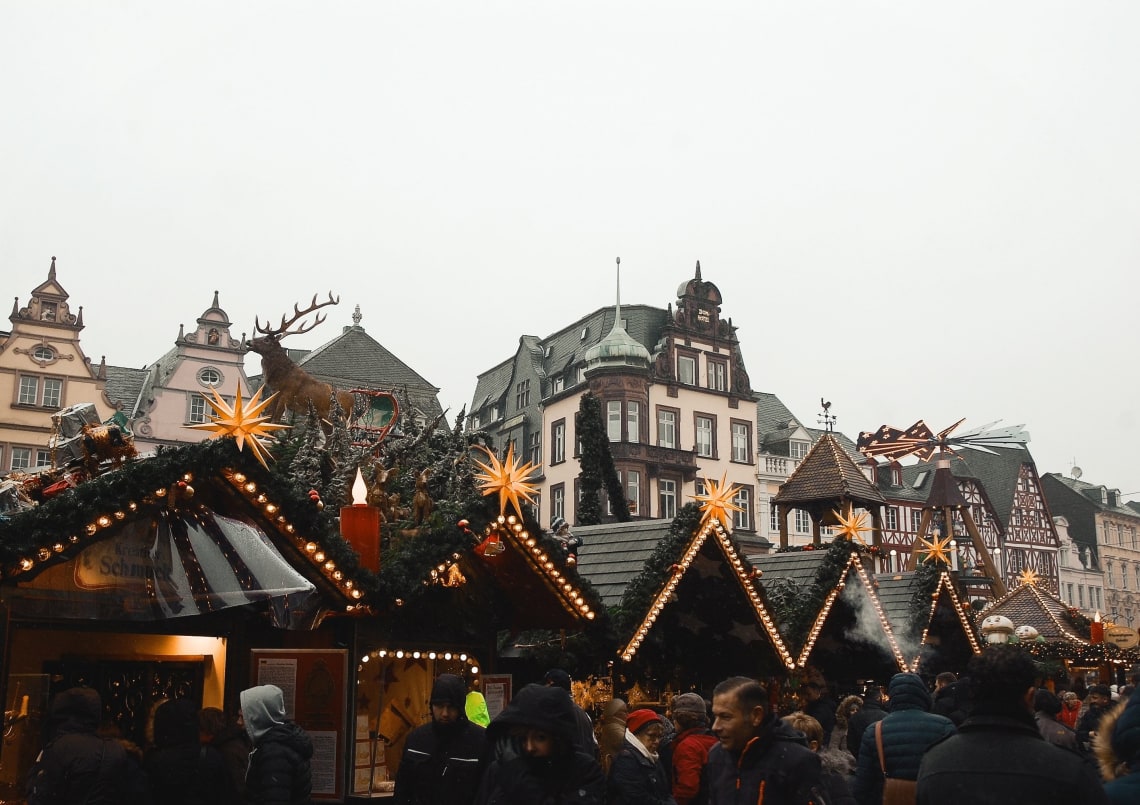
Stick to mainly free or cheap attractions
One of the best ways to enjoy Germany on a budget is by prioritizing the free or cheap attractions. There are lots of fun things to do in Germany that cost very little money, or no money at all !
Exploring nature is one of the best things to do for seeing Germany on a budget. Hiking, cycling, or even just hanging out in a city park are all great ways to enjoy Germany for free.
In bigger cities, you can also often find free walking tours ! Many landmarks are free, and many museums have free admission on certain days or times so definitely look into that. If you’re visiting Germany in winter, wandering around Christmas Markets is an affordable activity.
Find cheap accommodation or do a work exchange
Another essential way to save money in Germany is finding cheap accommodation! Hostels are located in most major tourist cities around Germany, such as Berlin, Munich, Frankfurt, Hamburg, and Cologne. They are also in smaller cities like Leipzig, Nuremberg, Dresden, Heidelberg, and Dusseldorf. Hostels in Germany cost around 16-30 Euros per night for a dorm bed.
For even cheaper accommodation than a hostel, consider a work exchange ! Working in exchange for accommodation not only saves you money, but it also allows you to stay in one place for longer. That way, you can meet and bond with locals, learn some valuable skills, learn more about the culture, and just have a unique and memorable experience.
Some examples of work exchanges in Germany include:
- Learning about organic farming at an eco-village in Sammatz
- Helping with gardening on a potato farm-hotel in northern Germany
- Working on restoring a winery in the Middle Rhine Region
- Volunteering at an organic cafe at an eco-village in northern Germany

Cheapest places to visit in Germany
There are lots of amazing and cheap places to visit in Germany, from small towns to big cities. For travelers who are new to Germany, here are a few of the top cities to visit in Germany. These places are generally cheap for travelers because they have lots of budget accommodation options and free attractions.
When traveling Germany on a budget, you will most likely begin your journey in Berlin, the nation’s capital city. If you’re flying into Germany, there are lots of cheap flights into Berlin, so this is a great place to begin. This city is a melting pot of cultures and cuisines!
Berlin truly has so much to see and do , and many of the best attractions are free. From seeing the colorful murals at the Berlin Wall , to seeing majestic landmarks like the Berliner Dom and the Brandenberg Gate , to visiting historic sights, memorials, and parks , you can explore much of Berlin for very little money!
This charming city in western Germany is another incredible place to visit if you’re looking to save money. Cologne is a gorgeous place with some stunning landmarks such as the impressive Cologne Cathedral . Climb up to the top for the best views of the city! Also check out the Old Town for delicious food , fun bars, and lots of colorful, antique architecture.
A fun and unique work exchange you can try in Germany is volunteering at a small hostel that needs help taking care of its alpacas! That’s right, this hostel in Boppard, just 1.5 hours away from Cologne, has 4 alpacas and they need help from travelers to take care of them!

Another wonderful place to visit in Germany on a budget is Frankfurt. This city is famous for having one of Germany’s best skylines , and it’s also a city of great diversity. There is modern industry that includes shopping and entertainment, but there is also a historic side with an Old Town and lots of museums and galleries.
The best way to stay in Frankfurt on a budget is by working in a hostel! You can volunteer in this hostel and work in exchange for free accommodation. Not only will you save money, but you’ll also get an in-depth experience in the city and get to live like a local.
Munich is a gorgeous area of Germany that is located in the scenic state of Bavaria. Most travelers head here during the world-famous Oktoberfest so they can dress up in fun outfits and drink beer!
This festival is on many travelers’ bucket lists, but if you want to visit Germany on a budget it would be wise to avoid this time as many accommodations and flight prices increase dramatically.
Outside Oktoberfest, Munich is actually quite affordable, and it’s one of Germany’s most beautiful cities . There are lots of accommodation options to choose from that may suit your budget. Wander through the Old Town and admire the intricate, historic buildings, or indulge in some hearty Bavarian cuisine at a local restaurant.
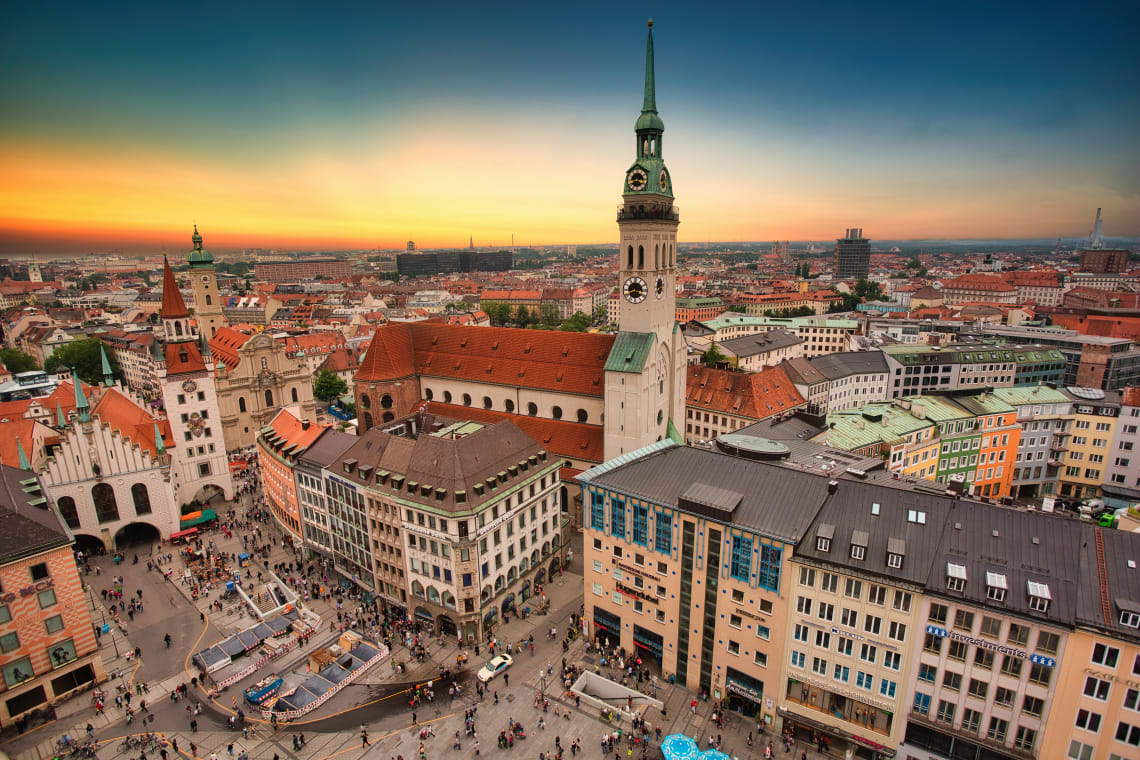
Located in eastern Germany, Dresden is another city that is amazing for touring Germany on a budget.
Dresden is the capital city of the state of Saxony, and it’s one of the country’s most populous cities. The city was destroyed by bombings in WWII, but the historic city center has been rebuilt and nowadays there are lots of gorgeous buildings of Baroque and Rococo architecture to check out.
To save money while traveling in Germany, consider this work exchange which is in Forst, about 1.5 hours away from Dresden. You can work for a nonprofit local project and help out with content writing, photography, videography, and more. In exchange, you will get free accommodation and free meals !
If you’re going to Germany on a budget, stop in Dusselsorf! This city in western Germany is located on the Rhine River and has lots of art, music, and culture to offer travelers. The east bank of the Rhine is home to the picturesque Old Town, whereas the west bank of the river is home to the more modern part of the city.
Most travelers hang out in the Old Town, also known as the Altstadt. Here you can find an abundance of cool sights and attractions, as well as countless pubs, bars, clubs, and entertainment venues that will keep you entertained for days.
Hamburg is a fun and affordable city that is often skipped by tourists in Germany. But that means it’s full of locals and you can have a cheap and authentic experience here. Visit the museums, stroll along the canals, check out the historic landmarks, and live it up at the many clubs, bars, and restaurants.
For a peaceful cultural experience that will also save you money on accommodation, you can volunteer at a yoga retreat . Test your cooking skills by helping out in the kitchen with preparing healthy meals. This work exchange is located in Göhrde, a town about 1 hour away from Hamburg.

Extra tips for budget travelers in Germany
Here are some extra tips that will help you save money in Germany. If you travel to cheap cities, try some work exchanges to get free accommodation, and follow these tips, you can easily have an epic adventure through Germany on a budget!
Choose the bus over the train
Train travel is often much more attractive than bus travel, but in reality, it is much more expensive. Trains in Germany can be pricey, and buses are cheap , so travel long distances by bus if you want to save money.
Take public transport
When you’re staying in a city, avoid taking taxis as they can be super expensive. Public transport such as metros, trams, and public buses are all very reliable and modern in Germany. But always remember to validate your ticket before you get on the train or bus , otherwise, you could get fined!
Get a city pass
If you’re a huge fan of museums and galleries, it’s worth buying a city pass for places like Berlin or Hamburg. Entry fees for museums can add up, so paying for a city pass can save you money on attractions in the long run.
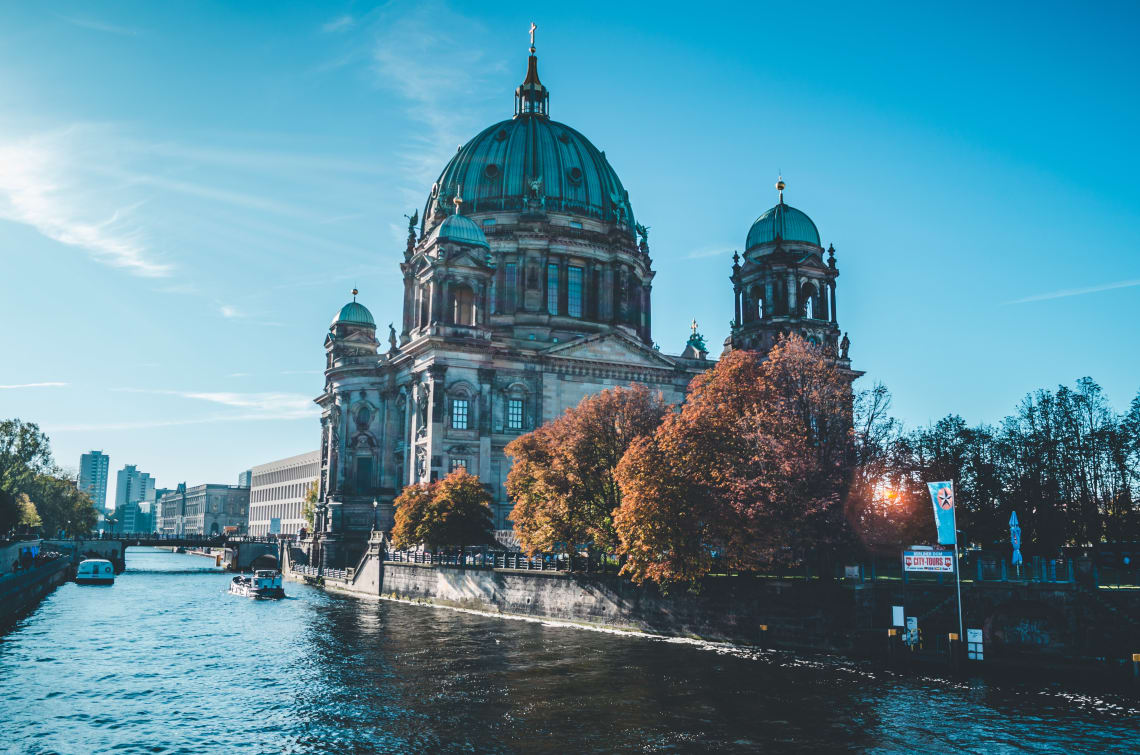
Bring your student ID card
If you’re a student , always have your student ID card with you! Many attractions throughout Europe offer discounted entry fees for students if they have a valid ID.
Eat and drink like the locals
For eating and drinking out in Germany, stick to the less-touristy, local restaurants and bars. The touristy areas often have overpriced food and drink that is catered towards foreigners. Ask around to some of the locals about the best places to eat and drink on a budget!

Thanks for reading our guide to Germany on a budget!
- Want to learn more about planning your trip? By subscribing to the WP pack plan you have unlimited access to +120 courses at Worldpackers Academy, the travel school made by travelers!
Join the community!
Create a free Worldpackers account to discover volunteer experiences perfect for you and get access to exclusive travel discounts!
Gabrielle Boucher
Budget Travel With Gabby
Hello! I am a 25 year old from the USA with a knack for traveling on a budget. I fell in love with traveling while studying in Europe, and that love grew even more when I started volunteering abroad in South America. Since then, I've worked odd jobs and volunteered all over the globe while cultivating passions for hiking, wildlife photography, food, wine, animals, permaculture, and more!
Be part of the Worldpackers Community
Already have an account, are you a host, leave your comment here.
Write here your questions and greetings to the author
Jan 03, 2023
Hello everybody i want to join in this activity ; but i want to help me how can i join with you .
Jan 28, 2023
Hi my name Omar Ahmed
Jan 31, 2023
هلاو. تعرف عربي
نعم اتكلم عربي
Mar 11, 2023
I spoke English
Jan 30, 2023
Feb 19, 2023
02001092772046
May 10, 2023
my name is Arslanbek I need a job I can assemble furniture can you help me
May 11, 2023
Hi my name is Tillo
May 14, 2023
Hi my name is abdullo
May 27, 2023
i also start using this App called ATM Fee saver to save some money on fees oer there, its just super expensive, and this app shows you atms around with low fees for withdrawing money.. can recommend it highly =)
Jun 27, 2023
My name driss
Dec 07, 2023
Jan 12, 2024
I am interested and I want to volunteer
More about this topic

Best way to travel Europe: all you need to know to plan your trip
Backpacking through europe: all you need to know
Eurail global pass coverage, the ultimate guide: what is it, how much and how to get one, how do worldpackers trips work.
As a member, you can contact as many hosts and travel safely as many times as you want.
Choose your plan to travel with Worldpackers as many times as you like.
Complete your profile, watch the video lessons in the Academy, and earn certificates to stand out to hosts.
Apply to as many positions as you like, and get in contact with our verified hosts.
If a host thinks you’re a good fit for their position, they’ll pre-approve you.
Get your documents and tickets ready for your volunteer trip.
Confirm your trip to enjoy all of the safety of Worldpackers.
Have a transformative experience and make a positive impact on the world.
If anything doesn’t go as planned with a host, count on the WP Safeguard and our highly responsive support team!
After volunteering, you and your host exchange reviews.
With positive reviews, you’ll stand out to hosts and get even more benefits.
- Application process for Germany VISA
- Germany Travel Health Insurance
- Passport Requirements
- Visa Photo Requirements
- Germany Visa Fees
- Do I need a Visa for short stays in Germany?
- How to Get Flight Itinerary and Hotel Booking for Visa Application
- Germany Airport Transit Visa
- Germany Business VISA
- Guest Scientist VISA
- Germany Job Seeker Visa
- Medical Treatment VISA
- Tourist & Visitor Visa
- Trade Fair & Exhibitions VISA
- Training or Internship VISA
- Study Visa for Germany
- Working (Employment) VISA
- German Pronunciation
- German Volabulary
- Requirements
- Health Insurance
- Trend & Living
- Free Assessment Form
- Privacy Policy
Exploring Germany on a Budget: A 15-Day Itinerary

Germany is a country that is rich in history, culture, and natural beauty. It is a dream destination for many travelers, but it can also be quite expensive. However, with some careful planning, it is possible to explore Germany on a budget without missing out on its most famous attractions. In this article (Exploring Germany on a Budget), we will provide you with a 15-day itinerary that covers some of the best destinations in Germany while keeping the costs low.
Our 15-day itinerary (Exploring Germany on a Budget) covers some of the most popular destinations in Germany, including Berlin, Dresden, Leipzig, Munich, the Romantic Road, and Frankfurt. We have included travel costs, accommodation options, and suggested activities to help you plan your trip.
By following this itinerary (Exploring Germany on a Budget), you can experience the vibrant culture, delicious food, stunning landscapes, and historic landmarks that Germany has to offer without breaking the bank.
Table of Contents
Exploring germany on a budget.
Itinerary for a 15-day budget-friendly trip to Germany, including travel costs, places to visit, where to stay, and travel details. (Exploring Germany on a Budget A 15-Day Itinerary)
Day 1-3: Berlin
Berlin is the vibrant capital city of Germany, and a great place to start your trip. You can fly into either Tegel or Schönefeld airport and take public transportation or a taxi to your accommodation. The central Mitte district is a good place to stay, as it is close to many of the city’s landmarks and attractions. You can find a range of budget-friendly hostels and hotels in this area.
During your time in Berlin, you can visit famous landmarks such as the Brandenburg Gate and Checkpoint Charlie, explore the trendy neighborhoods of Kreuzberg and Neukölln, and take a free walking tour to learn about the city’s history. Berlin is also known for its nightlife, with many bars, clubs, and music venues to choose from.
Day 4-6: Dresden
Dresden is a beautiful city in the eastern part of Germany, known for its baroque architecture and cultural heritage. You can take a train from Berlin to Dresden, which takes approximately 2 hours. The Altstadt (Old Town) district is a great place to stay, as it is close to many of the city’s landmarks and museums.
During your time in Dresden, you can visit the stunning Frauenkirche church, explore the Zwinger Palace and its museums, and take a stroll along the river Elbe. The city also has many parks and gardens, such as the Grosser Garten and the Pillnitz Palace and Park.
Day 7-8: Leipzig
Leipzig is a hip and vibrant city in the eastern part of Germany, known for its music scene and cultural diversity. You can take a train from Dresden to Leipzig, which takes approximately 2 hours. The city center is a good place to stay, as it is close to many of the city’s landmarks and attractions.
During your time in Leipzig, you can visit the famous St. Thomas Church where Bach was the cantor, explore the trendy Plagwitz district with its street art and indie shops, and try the local specialty, Leipziger Allerlei (a vegetable and seafood dish). Leipzig also has many parks and green spaces, such as the Rosental Park and the Clara Zetkin Park.
Day 9-11: Munich
Munich is the capital city of Bavaria, in the southern part of Germany, and is known for its beer halls, museums, and historical landmarks. You can take a train from Leipzig to Munich, which takes approximately 4 hours. The Altstadt (Old Town) district is a good place to stay, as it is close to many of the city’s landmarks and attractions.
During your time in Munich, you can visit the famous beer halls such as Hofbräuhaus and Augustiner-Keller, explore the beautiful Nymphenburg Palace and its gardens, and take a stroll in the English Garden park. Munich is also known for its museums, such as the Deutsches Museum of science and technology, and the Pinakothek art museums.
Day 12-13: The Romantic Road
The Romantic Road is a scenic route through Bavaria, with many picturesque towns and villages to visit along the way. You can rent a car in Munich and drive along the route, which takes approximately 2-3 days. Some of the towns along the route, such as Rothenburg ob der Tauber and Dinkelsbühl, have budget-friendly hotels and guesthouses.
During your time on the Romantic Road, you can visit the charming medieval towns, such as Nördlingen and Harburg, explore the beautiful countryside, and sample the local cuisine and wine. You can also visit the famous Neuschwanstein Castle, which is said to have inspired the Disney castle.
Day 14-15: Frankfurt
Frankfurt is a bustling city in the western part of Germany, known for its skyscrapers, museums, and international airport. You can take a train from the Romantic Road or drive to Frankfurt, which takes approximately 3-4 hours. The Bahnhofsviertel district is a good place to stay, as it is close to the train station and many budget-friendly accommodations.
During your time in Frankfurt, you can visit the famous Goethe House and Museum, explore the modern art museum Städel, and take a walk along the river Main. Frankfurt also has many restaurants and cafes serving traditional German dishes, such as schnitzel and sausages.
Travel Costs: – Exploring Germany on a Budget
- Flight to Berlin: $500 (round trip)
- Public transportation in Berlin: $50
- Train from Berlin to Dresden: $50
- Train from Dresden to Leipzig: $20
- Train from Leipzig to Munich: $50
- Car rental for Romantic Road: $200
- Gas for Romantic Road: $50
- Train from Romantic Road to Frankfurt: $50
- Public transportation in Frankfurt: $30
Total travel costs: $1000
Accommodation Costs: – Exploring Germany on a Budget
- Berlin: $30-50/night
- Dresden: $40-60/night
- Leipzig: $30-50/night
- Munich: $50-80/night
- Romantic Road: $50-80/night
- Frankfurt: $30-50/night
Total accommodation costs: $900-1400
Food and Activities: – Exploring Germany on a Budget
- Daily food budget: $30-40
- Free walking tours: Berlin and Leipzig
- Museums: $10-15/entry
Total food and activities costs: $600-800
Overall, this itinerary offers a diverse range of experiences and sights throughout Germany, while still staying within a budget. By staying in budget-friendly accommodations, using public transportation or a rental car, and eating at affordable restaurants, you can enjoy all that Germany has to offer without breaking the bank.
Here are some additional tips to help you plan a budget-friendly trip to Germany:
- Book your flights and accommodations in advance to get the best deals.
- Use public transportation or rent a car to save money on transportation costs.
- Visit museums and other attractions during their off-peak hours or on free days to save on entrance fees.
- Look for free walking tours or other free activities to explore the cities on a budget.
- Eat at local markets or street food stalls to save money on food costs.
- Consider staying in hostels or Airbnbs to save money on accommodations.
- Purchase a travel card or pass for public transportation to save money on individual fares.
By following these tips and using the suggested itinerary (Exploring Germany on a Budget) as a guide, you can have a budget-friendly and memorable trip to Germany.
Conclusion – Exploring Germany on a Budget
Germany is a country that offers something for every type of traveler, from bustling cities to scenic countryside, from ancient history to modern art, and from hearty meals to world-class wine. By following our 15-day itinerary, you can explore some of the best destinations in Germany while staying within a budget. With some careful planning and a willingness to try new things, you can have an unforgettable trip to Germany that won’t break the bank.
More articles
From india to germany: a guide to traveling across continents, germany travel guide for first-time visitors, discovering munich: a 3-day travel itinerary with popular attractions, activities, and dining options, leave a reply cancel reply.
Save my name, email, and website in this browser for the next time I comment.
Difference between ein, eine, einen, and einem in the German Language
Some cheap and expensive things in germany, german essays on my family: meine familie, german universities where we can apply, without uni-assist, latest article, 56 tuition free master’s programs in computer science in germany – explore your options today, your gateway to germany: 20 universities where you can apply without uni-assist, navigating the german language: a comprehensive starter vocabulary, expanding your software company in germany: a step-by-step guide, faqs: money transfer, jobs, and travel from india to germany.

Plan For Germany
© Plan for Germany. All rights reserved.
Sister Sites
Popular category.
- German Language 39
- Lifestyle 35
- Trend & Living 30
- Level A1 23
Editor Picks

We're Not In Kansas Anymore!
travel inspiration!
The Ultimate Guide to traveling Germany on a budget! (2024)
So, you’re headed to Germany but you want to do Germany on a budget? Well, good news because you’re in luck! Germany, a popular destination in Western Europe, is actually a very economical place to travel to!
In this article we’ll discuss proven ways to save money on your next trip so you can spend less time worrying about money and more time enjoying beautiful, amazing Deutschland!

Table of Contents
It’s probably cheaper than what you are used to!
I’m by nature a frugal person but I skip my way around Germany (and many other European countries) saying “wow, this is cheap!” From food to accommodations, to attractions, things are just less expensive. If you are traveling from the United States, you’ll find this to be especially so.
A while back I did a price comparison and created some illustrations to show just how much more reasonable prices are for tourists to European Countries. Of course, there are some exceptions to this, like Norway and Switzerland but Germany is not one of them!
Let’s compare one of the most recognizable sites in all of Europe: Neuschwanstein Castle, with the Laura Ingalls Wilder House in Missouri. Guess which was more???
Traveling soon? Rookie mistakes people make when traveling in Germany

*Disclosure: This post may contain affiliate links at no additional cost to you, I may earn a small commission. I only recommend products I would use myself and all opinions expressed here are my own.
Here are the absolute best proven tips and tricks for traveling to Germany on a budget:
My top tip for getting the cheapest flights, and the best deals on car rentals and accommodation is to book early. Last-minute deals are a thing of the past and if you wait too long, you may miss out on the best deals. I try to book at least 6 months out.
Pro tip: DON’T stop there! Once booked your airfare rate is probably locked in but you can still monitor the prices on your accommodations and rental cars! I try to always book options that offer free cancellation. Once a month I will go back and check rates on my rental car and rooms and if the rates go down, I rebook!

The cheapest time to travel to Germany
The short answer: the best time for travelers who are on a budget to visit Germany is during the off-season.
Summer is considered high season in Germany and that’s when you will experience the highest rates on everything from rental cars to accommodations to flights, although comparably still not bad!
Winter, (apart from the Christmas market season) is off season. This is when you will find the best rates on flights, hotels, and rental cars HOWEVER, many attractions close for winter.
( Winter in Germany is a magical time, but get your itinerary set early and carefully check your everything on your itinerary to be sure that everything you want to see will be open.)

shoulder season
If you are looking for a happy medium then shoulder season is your best bet. It’s the perfect balance between lower prices and finding attractions open. Shoulder season in Germany is approximately April and May and again in September and October.
Other benefits of shoulder season:
- fewer crowds: you’ll find fewer tourists and crowds compared to high season
- temperate weather: the weather tends to be better than in the heat of the summer and chill of the winter months!

destination matters
Bigger cities tend to be more expensive than small towns. Budget minded travelers can save more by skipping big cities like Munich and Berlin in favor of small historic cities like the fairy tale town of Rothenburg or small towns in the Black Forest .
The city center of German cities tends to be more expensive than outlying neighborhoods. Pick a place outside of the city center and use inexpensive buses, subways, and trams to get around affordably. main cities.
The small town of Rothenburg ob der Tauber is a destination all in itself! Their Imperial City Festival just happens to occur during shoulder season and best of all it’s free!
transportation
When it comes to traveling in Germany on a budget, transportation is a significant factor to consider.
Airfare is often one of the most expensive travel expenses. Here are some strategies for saving money on flights:
Flights to Germany: My strategy for finding good deals on airfare is to search flight options on Google Flights. Be sure to set up a price tracker and they will let you know when prices change.
Pro tip : Once you have found a cheap flight and are ready to book, go to the official website of the airline and book there to avoid any issues with 3rd party booking.
In my experience, Frankfurt International Airport is generally the cheapest place in Germany to fly into.
cheap flight notifications
My TOP TIP for snagging flight deals is to sign up for GOING (Formerly Scott’s Cheap Flights.) You simply give them your email address, tell them your home airport, and they will periodically email cheap flight deals to your inbox! Simple AND Free! sign up now !
FREE FLIGHTS !
We fly to Germany for free with points. Find out how you can fly to Germany for free !
Cheap flights in and around Europe: There are many low-cost airlines that operate in Germany, such as Ryanair, EasyJet, and Eurowings. These airlines offer affordable fares to various destinations in Germany and other parts of Europe. However, it is crucial to note that budget airlines often charge extra fees for baggage, seat selection, and other services.
public transportation
Another way to save money while traveling to Germany is to take advantage of public transportation . Germany has an extensive rail network and bus system that is efficient and affordable. Perfect for a day trip to the European cities of your choice! Seamlessly plan your bus and train routes in German with either the Deutsche Bahn app or Rome2Rio .
Trains The German railway system, Deutsche Bahn, offers several types of train services, including regional, intercity, and high-speed trains. Regional trains are the most affordable option, but they are slower than intercity and high-speed trains. High-speed trains zip you around in a flash but they cost more. Travelers can save money by booking their train tickets in advance and by purchasing a German Rail Pass, which allows for unlimited train travel if they plan to travel extensively.
Buses Traveling by bus is the most affordable way to get around Germany. Bus tickets are often cheaper than train tickets, but travel times can be longer. Flixbus is the most popular bus company in Germany, and they offer services to various destinations across the country. Some bus companies may charge extra fees for baggage.
Taxis are affordable in Germany. Companies are heavily regulated, so you don’t need to worry about getting ripped off or short changed.
If you’re a free spirit like me and don’t like to be tied to a schedule, you may want a car. I find that car rentals in Germany are typically cheaper than other European countries. The motorway in Germany is called the autobahn and it is toll free.
Potential extra costs for driving:
- Insurance: Some credit cards offer rental car insurance when you book your rental on the card. Check with your card provider. If not, you will need to purchase insurance. (Our Chase Preferred covers this)
- International Driving Permit: you may need an International Driving Permit to drive in Germany, get one at your local AAA office around $30
- other drop off locations : there are significant fees for dropping off a car at a different location
- boarder crossing fee: there is generally a small fee associated with crossing a country border in a rental car.
- navigation system: Most companies charge if you want to use the GPS navigation system. If you don’t have any other way to navigate, I highly recommend it for convenience. We have this Garmin Unit , that we bring when we travel. (European maps cost extra)
- DO NOT BREAK TRAFFIC LAWS. There are cameras everywhere and the drivers license that the rental car company requires you to show is associated with the license plate of the rental car. If you break a traffic law while driving in Germany, you may get a ticket in the mail after you return home!
- Parking in larger cities: This is one place where Germany is right on par with the rest of the world. Parking in a busy city center is expensive, around $25 per day. If you plan to spend most of your time in an area like this, skip the car.
accommodation
Your two biggest expenses when planning a trip to Germany are generally going to be airfare and accommodations. There are a few ways for the budget minded to save on accommodations. (and don’t forget to book early!)
Get outside of the tourist core
Sometimes you only have to get a few blocks away from the busy tourist core of a town to find cheaper rates. Look for accommodations just outside of town that are on the bus route into the city center.
I often consider my accommodations part of the experience. I like to book unique options like castle stays, historic buildings, places with old world charm. I try to avoid chains and sterile accommodations (some of you consider that modern decor and clean lines ha ha.) You get the idea. For that reason, I’m kind of a middle of the road girl, willing to pay a bit more for the experience. That considered, I don’t usually pay more than $250 a night for even my favorite stays! Most places we stay at are about $150 per night based on double occupancy but you can find better rates.
If you want to check the best rates you can find them on Booking.com. Simply sort your results by the lowest prices, but don’t forget to check guest ratings and reviews because a bad experience may not be worth the money you save on a cheap stay!
Solo travelers
Something you almost NEVER find in the US and something I really love about Germany is that single travelers get a break on hotel room rates! Generally, you can get a private room for a solo traveler for a discount off the regular rate! WUNDERBAR!
Hostels are very popular in Europe and a popular option with travelers on a tight budget. Hostels can be a significant savings over a hotel and aren’t just for young people either. There are often private rooms available with a range of amenities such as shared kitchens, laundry facilities, and common areas. Be sure to read the hostel policy (as well as reviews on places like Booking.com and Google Reviews) carefully to be sure it’s something you will be comfortable with. They aren’t for everyone. Hostels in Germany typically charge between €20-€40 per night, depending on the location and time of year.
Some of the most popular hostel chains in Germany include A&O Hostels, Meininger, and Generator Hostels. These chains have multiple locations throughout the country and offer a consistent level of quality and service. My favorite hostel option is located in a castle !
Vacation Rentals
Vacation rentals are great options for larger families or groups, or travelers looking to save money by cooking their own meals. You can book anything from a private room to an entire house.
Check vacation Rental rates on VRBO now !
I hear a lot of negative feedback on Airbnb. I wouldn’t recommend them or personally use them unless I really wanted to stay at a property and Airbnb was the only place it was being offered. I don’t really hear any negative feedback on VRBO so it would be my first option for vacation rentals.
Vacation Rental prices in Germany vary depending on the location and type of accommodation. In general, prices are higher in major cities such as Berlin, Munich, and Hamburg. However, travelers can often find affordable options in smaller towns and rural areas.
IMPORTANT: READ THE REVIEWS: always read the reviews on a property before you book and choose a host with a good reputation. Search options on VRBO
Search Hotels, Hostels, Vacation Rentals now!
(if you use this link to book your hotels I’ll get a small commission that helps me fund this website!)
Camping is another budget-friendly option for travelers in Germany. The country has a well-developed network of camping sites, ranging from basic tent sites to fully-equipped caravan parks. Camping is particularly popular in the summer months, when the weather is warm and sunny.
Camping fees in Germany vary depending on the location and facilities provided. Basic tent sites can cost as little as €5-€10 per night, while fully-equipped caravan parks can cost up to €30-€40 per night.
House and Pet sitting
Sign up for services like Trusted House sitter and you can stay for free! These services match up people who are looking to house and or pet sit and in return you get a free place to stay.
Food and Drink
Germany is known for its delicious food! And in general, I find it quite inexpensive! However, it can add up if you’re eating out every night. Here are a few ways to save on food and drink.
First time in Germany and don’t know what to eat??? Check out my article on the Best Mouthwatering German Food !
it’s cheaper than almost everything else including water and cola.
free breakfast
Many of the hotels and Gasthauses, my favorite type of stay in Germany, offer a free breakfast. German breakfasts are HEARTY! If I fill up on breakfast, I often find I’m not hungry until well after noon. By that time, I can have an affordable meal like Schnitzel and won’t need to eat again that day! We’re talking around €10-€15. ($13 USD) per day for one meal! CHEAP!
Street Food
You don’t want to miss the street food from street vendors in Germany. It’s so good! And is a great option for shoe-string budget travelers. Here are some of my favorite street foods:
- wurst : In Germany, wurst is where it’s at! There are literally hundreds of types of wurst or sausages. My favorite is Currywurst is a popular street food in Germany, made of a sliced sausage covered in curry ketchup. It’s a filling and delicious meal that can be found for around €3-€5.
- Doner kebab is another popular street food in Germany, made of meat cooked on a vertical spit and served in a pita bread with salad and sauce. It’s a great option for a quick and cheap meal, costing around €3-€4.

supermarkets
Supermarkets and grocery stores are a great option for budget travelers who want to save money on food. Aldi and Lidl are two popular discount supermarket chains in Germany, offering a wide variety of food and drink at affordable prices. Visitors can find bread, cheese, cold cuts, and other snacks for a fraction of the cost of eating out. It’s also a great way to try local specialties, such as German beer and sausages, without breaking the bank.
Sightseeing: inexpensive and free things to do
In general, most of the attractions in Germany are quite affordable so don’t let your desire to save money prevent you from doing the fun stuff! I mean you really do only live once, and you’ve been dreaming of being here so just enjoy!
Some of the best things to see and do in Germany are free! Here are some ideas for inexpensive and free things to do to fill out your itinerary:
free attractions
- Find a beer garden and enjoy some live music. Did I mention that beer is cheap? Plus, food at these places is cheap too, think pretzels and brats.
- Churches, Cathedrals, and Abbeys: Germany has some of the best in Europe and they are most often free!
- Museums can be a great way to learn about Germany’s history and culture, but they can also be expensive. However, many museums in Germany offer free admission on certain days or during specific hours. It’s important to check the museum’s website or call ahead to confirm their free admission policy.
Famous Landmarks: many of the most famous landmarks in Germany are reasonably priced or free. Here are just a few ideas but be sure to check out my full list of Famous Landmarks in German y!
- Brandenburg Gate in Berlin
- English Garden in Munich
- Porta Nigra in Trier
The Parish Church of St. Sebasian Ramsau is one of my favorite Landmarks in Germany and it’s FREE
It’s free to explore! take in the architecture in Germany’s most beautiful medieval towns , or head to the city for some of the worlds best modern architecture! Make your way down a winding trail, perhaps in the Black Forest and soak up the atmosphere that inspired fairy tales from the Brothers Grimm.
To find information about both guided and self-guided tours check the local Tourist Information office.
Guided Tours A Guided tour can be a great way to learn about a new city, but they can also be expensive. Fortunately, there are many free walking tours available in Germany. These tours are typically led by a local knowledgeable tour guide who is passionate about their city and its history.
Self-guided tours In addition to free walking tours, there are also many self-guided tours available. These tours can be found online or in guidebooks and can be a great way to explore a new city at your own pace. Download free audio guide tours before you leave home.
money matters
Credit cards.
Call ahead to be sure that your credit card doesn’t access foreign transaction fees on purchases. We use our American Airlines card to earn points for free flights, but I also like the Chase Preferred cards because not only does it not have any foreign transaction fees, it also has built in travel protection.
Getting money (ATM)
The easiest and best way to get Euros for your Germany trip is at a reputable ATM. I usually hit one at the airport upon arrival. If I need more, I look for an ATM either in or attached to a bank during business hours. That way if the machine snatches my card I have a good chance of getting it back. This is how you’ll get the best exchange rate and ATM fees are minimal. Don’t forget to refuse the Dynamic Currency Conversion. You want to be charged in Euros not dollars because they will charge you more to convert the money.
Note: Be sure you use your debit card to withdraw money from an ATM. Credit cards consider this a cash advance and that can be very costly!
How much cash do I need?
Really that depends on you. We use our credit cards for almost everything because that’s how we earn free flights. You should have some Euros on you at all times… if nothing else so you have money to use the bathroom because you often have to pay to use the restroom!
Euro to dollar / dollar to Euro exchange rate
Check current exchange rates here.
protect your investment
If your budget minded then you probably don’t relish the thought of losing money! Travel Insurance is a good way to protect yourself. While it is an extra expense, if really pays off if something goes awry. I shop at Travel Insurance for the best policy for my needs.

shopping for gifts and souvenirs
As with most things in Germany, your average souvenirs are reasonable. Consider saving up for a quality purchase in Germany, like an authentic handcrafted cuckoo clock or nutcracker.
I have a whole guide to help you choose the very best Germany Souvenirs but here are some ideas for dirt cheap things to buy in Germany :
- Food items (like Chocolate and other candies)
- Postcards, pretty postcards, are very inexpensive. Start an album when you get home!
where to shop for inexpensive gifts and souvenirs
For bargain shopping search out:
- Flea Markets
- Farmers Markets
staying connected on a travel budget
It’s important to be able to stay connected when we travel. Most cell phone companies offer rates for international travel, but it can be costly, around $10 per day. Check your provider for rates and policies on using your phone in Europe and to find out exactly what your charges will be.
These are some low cost or free options for staying connected:
getting free wi-fi
You’ll either need cell phone service or wi-fi to use these options. Most hotels offer free wi-fi and you can find it at different places around town, such as near the Tourist Information Center.
Is an app where you can make calls, send texts, and video chat through a wi-fi connection. Your contact will need to download Whatsapp so that you can connect.
Facebook messenger
Make calls and video chat with your friends at home who are also on Facebook.
Purchase a phone or a SIM card upon arrival
You can pick up an inexpensive phone when you get to Germany. Alternatively, you can purchase a SIM card to replace the one in your phone. This is an inexpensive option, you can probably get by for under $30 for your entire trip. There are cell phone stores in airports, and almost every town on your itinerary, that can assist with these options.
Wi-fi calling
Find the “allow wi-fi calls” setting on your cell phone. Even though we don’t have cell service in Germany, we are able to make and receive phone calls from the US when connected to wi-fi. We were not able to get this to work for calls within Germany though.
Guest cards and discount passes
Inquire at your hotel, guesthouse, or other accommodations about discount passes and guest cards that may be available to you.
Guest Cards
Often overnight visitors to a town or region are eligible for discount passes that offer free or reduced admission to many area attractions as well as free use of local public transportation.
Discount Passes
You may be able to purchase a single or multi day pass that could save you money depending on how many attractions you plan to visit. To be certain this will save you money, add up the cost of a single ticket entry fee for each attraction and compare it against the cost of the discount pass. It may not be cheaper.
Frequently Asked Questions
What is the cheapest way to travel in germany.
The best option for cheapest way to travel in Germany is generally by bus. You may be able to save even more by purchasing day, week, or month passes.
How much should a trip to Germany Cost?
The cost of a trip to Germany can vary greatly depending on your travel style and itinerary. On average, budget travelers can expect an average cost of around 50-70 euros per day on accommodation, food, and transportation. However, this can be reduced by staying in hostels or signing up for house or pet sitting opportunities.
What are the cheapest months to travel to Germany?
The cheapest months to travel to Germany are typically during the winter months of January and February. However, be prepared for colder weather, reduced opening hours or attractions that have temporarily closed, and shorter daylight hours.
What is the cheapest way to get from the US to Germany?
The cheapest way to get from the US to Germany is by booking in advance and being flexible with your travel dates. Budget airlines such as WOW Air and Norwegian Air offer affordable flights to Germany from major US cities. Alternatively, consider booking a flight with a layover or flying into a nearby European city and taking a train or bus to Germany. I’ve found that there are often good deals to fly into Paris.
How can I travel around Germany by train on a budget?
Consider purchasing a rail pass if you plan to travel extensively throughout the country. Purchase online or at the train station. Regional trains are cheaper than high-speed trains and can be a good option for shorter distances. Booking in advance and traveling during off-peak hours can also help save money.
trip planning resources
Planning a trip to Germany? The first thing you should do is purchase a Germany Travel Guide from Rick Steves . It’s the ultimate guide for planning travel anywhere in Europe ! You’ll get the scoop on the best places worth visiting, from big cities to hidden gems!
check out my Ultimate Guide to Traveling in Germany !
Why you should book Klavze 28 (hidden gem photos!)
The best 100 + travel captions for couples, romantic, funny, legendary rock of cashel castle, how to see it (2024), how to see burg rheinstein castle germany (2024).
Great Post, I am always amazed how cheap Germany can be. I agree with everything here. I always tell people that drinking wine and beer is nearly cheaper then water. I also am a fan of Döner Kebab, such a delicious and quick meal.
Hi there, this is a great article, thanks for much for the tips. May I also share some tips that is useful for travelling Germany on a budget, particularly with regards to ATMs and money. Hi there, great article, thanks, very very helpful. I also do these things when travelling on a budget: 1. Germany ATMs charge low to very high fees. So I try to find the low fee ATMs – I use the ATM Fee Saver mobile app for this – it gives a list of ATMs with its fees for foreign card holders along with withdrawal limits. May you can try it out too! 2. Get fee-free cards from home. I get a bunch of such cards because most of them have limits on how much you can withdraw free in 1 month. 3. Avoid withdrawing cash from credit cards as the cash advance fee is very high 4. Withdraw maximum amount ATM gives me in 1 transaction if I need it. Of course only from bank ATMs. 5. Book directly with hostels/hotels to avoid extra commissions
Thanks for sharing amazing information and tips for choosing cheap places to stay in Europe. Regards: Aston Apartments UK
Leave A Comment Cancel reply
Your email address will not be published. Required fields are marked *
Save my name, email, and website in this browser for the next time I comment.
Yes, add me to your mailing list
Nomadic Matt's Travel Site
Travel Better, Cheaper, Longer
Berlin Travel Guide
Last Updated: July 29, 2023
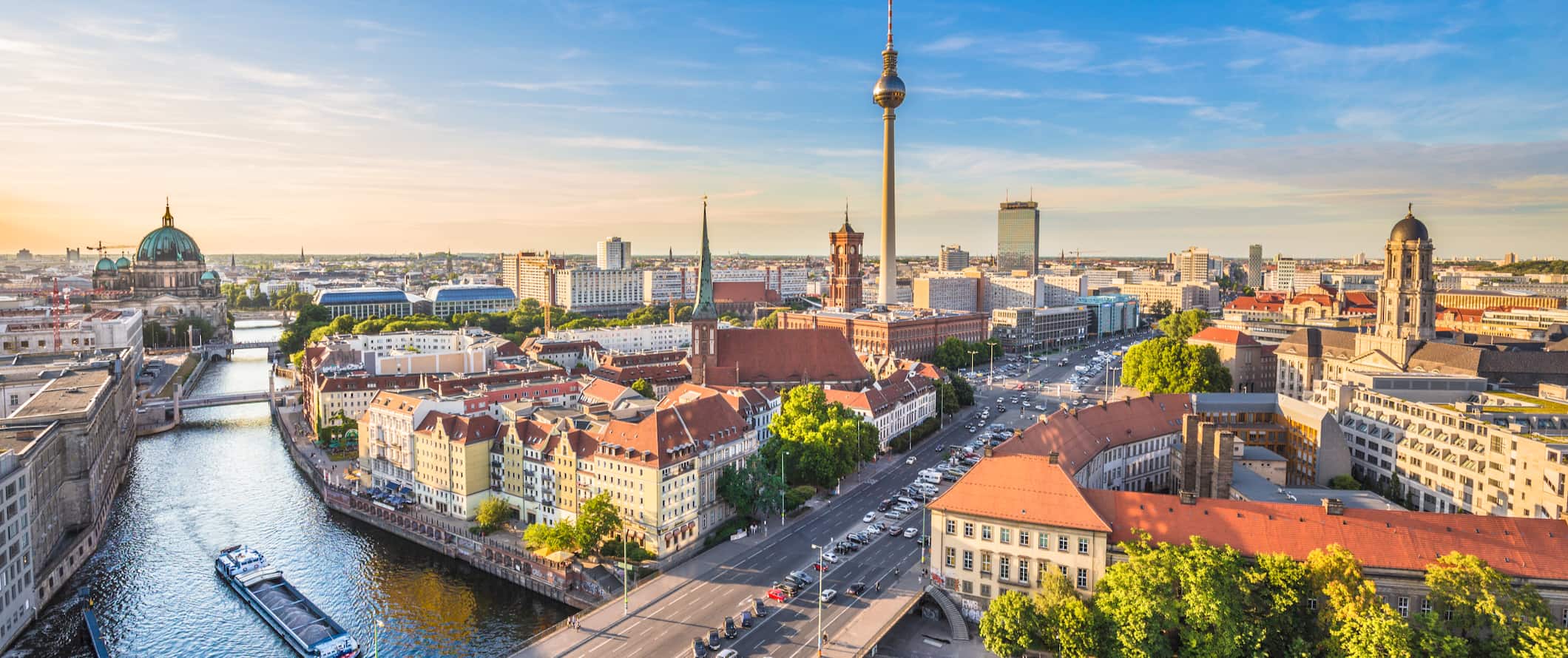
Over the past decade, Berlin has become incredibly popular with students, artists, writers, and creatives. They’ve been drawn to the city’s cheap rent and anything-goes spirit. There’s a constant sense of motion in Berlin.
This city is one of the most vibrant on the continent. It’s also huge, so don’t try to see it in just a couple of days. Extend your stay, take your time, rent a bike, and don’t rush. There’s a lot to see.
This travel guide to Berlin can help you plan your trip, save money, and ensure you have an amazing time in this lively metropolis.
Table of Contents
- Things to See and Do
- Typical Costs
- Suggested Budget
- Money-Saving Tips
- Where to Stay
- How to Get Around
- How to Stay Safe
- Best Places to Book Your Trip
- Related Blogs in Berlin
Top 5 Things to See and Do in Berlin
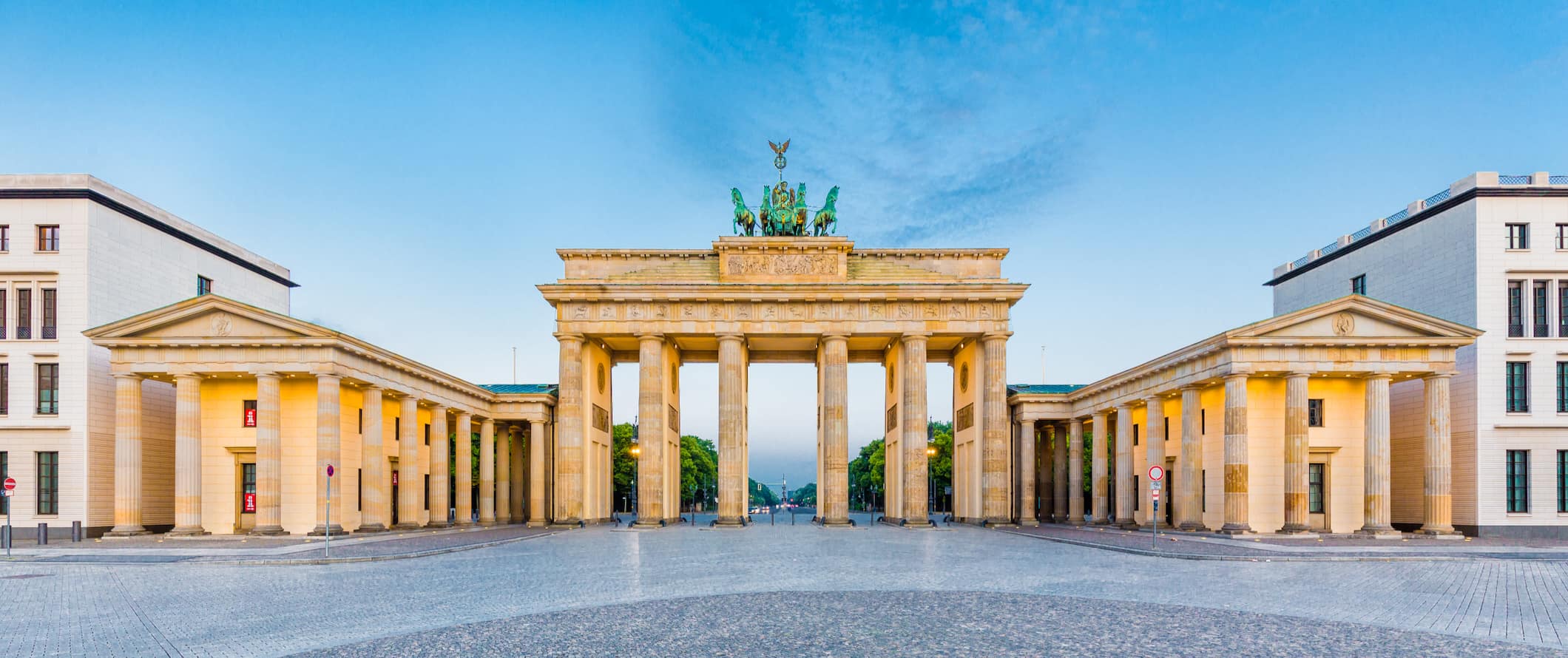
1. Visit the Memorial to the Murdered Jews of Europe
This outdoor memorial is a tribute to the millions of Jews that died during World War II. It’s made up of 2,711 large rectangular stones, which are all different sizes. You can walk between the stones and reflect on the Holocaust and the millions of lives that it claimed.
2. See the Brandenburg Gate
Built in 1791, Brandenburg Gate is the city’s best-known landmark. During the Cold War, the Brandenburg Gate was in no man’s land behind the Berlin Wall. When the Wall fell, everyone came to celebrate here and it has remained a symbol of a unified Germany ever since.
3. See the Berliner Dom
The Berlin Cathedral was originally built in 1905 as a royal court church, but now it’s also a museum and concert hall. While most visitors just stop by for photos, the ornate interior is decked in marble and onyx, with a 7,269-pipe organ and royal sarcophagi. Admission is 9 EUR.
4. Visit the East Side Gallery
This open-air art gallery features 105 paintings by artists from all over the world on a section of the Berlin Wall in Friedrichshain-Kreuzberg. Most of the paintings are political in nature. Signs fill in the history along the way so you can learn about the wall and art too.
5. Hang out in Treptower Park
This park is near an abandoned amusement park. Bike, relax in one of the beer gardens, or rent a boat and paddle down the Spree River. It’s my favorite park in the city. Visit the Inselgarten beer garden with its giant bar swings and random tango classes.
Other Things to See and Do in Berlin
1. hang out in potsdamer platz.
In the 1920s, Potsdamer Platz was the busiest square in Europe but it was destroyed during World War II and then divided by the Berlin Wall. After German reunification, it became the largest building site in Europe. It was transformed into a showpiece for the “new Berlin,” with modern architecture like skyrises, hotels, cinemas, shopping centers, and the massive central plaza.
2. See the famous Reichstag
The seat of the German Parliament is one of Berlin’s most historic landmarks. It has a clear dome (to promote “transparency” in the government) and draws some of the biggest crowds in Berlin. You can visit the dome (it’s free), but you have to make a reservation ahead of time. From the dome, you can enjoy panoramic views over the city and learn about the parliament’s history from the interior exhibitions. (Bring your passport as it’s required for entry!).
3. Enjoy the view from Fernsehturm TV Tower in Alexanderplatz
Germany’s main city square contains the iconic 368-meter-high Fernsehturm TV Tower. You can visit the tower’s observation deck for dazzling views of the city. Tickets start from 25.50 EUR. Otherwise, Alexanderplatz is an exciting hub of activity as people come to shop, eat, and hang out.
4. Tour the German Historical Museum
This museum covers everything from prehistory right up to the present day. There are numerous in-depth exhibits here, so schedule a few hours to see it all. It’s one of my favorite history museums in the world because it is very, very detailed. Highlights include a 3.5-meter-tall coat of arms column from 1486, Napoleon’s hat from the battle of Waterloo in 1815, and a personal computer from East Germany. Admission is 8 EUR. Note: the permanent exhibitions are closed for renovations until 2025. Temporary exhibitions are still accessible.
5. Head to Grunewald Forest
If you are looking to escape from the city, the grand expanse of Berlin’s largest forest is the perfect destination for hiking, picnicking, and biking. On hot summer days, head to Kuhhorn Badestrand, which has a cove and beach where Berliners come to swim and lounge. In the northernmost part of the forest, you’ll find Teufelsberg, a man-made hill standing 120 meters high. You can hike up here for views over the city as well as to see the abandoned tower that was used as a listening station by the US during the Cold War. Admission to Teufelsberg is 8 EUR. Guided tours in English are 15 EUR and take place on Sundays at 3pm.
6. Go to Zoologischer Garten and Aquarium
First opened in 1841, this is Germany’s oldest — and Europe’s most popular — zoo. There are giraffes, elephants, gorillas, and Germany’s only giant pandas, as well as nearly 1,300 other species. The aquarium is equally as impressive and is home to fish, coral, jellyfish, sharks, and more. A combination ticket for the zoo and aquarium is 23 EUR.
7. Visit the Deutsche Kinemathek
More commonly referred to as the Film Museum, this museum hosts festivals throughout the year. However, it’s also worth visiting for its fascinating interactive exhibits on German film. You can learn about German movie history, try out historical filmmaking instruments, explore the ins and outs of cinematic storytelling, watch Nazi propaganda films, and play your own role in front of a green screen in the museum’s studio. The museum theater also offers regular showings of foreign and historic films. Admission to the museum is 9 EUR with a free audio guide available and tickets to see a film are 8 EUR. Entrance is free on the first Sunday of the month.
8. Check out Mauerpark’s market
This enormous flea market is held every Sunday, with vendors selling all sorts of vintage furniture, antiques, artwork, books, and more. Local artists also set up shop to sell their paintings and handicrafts, and there’s no shortage of food and beer to go around. Don’t forget to join the karaoke session in the outdoor theater.
9. Relax in Tempelhof Field
Located in the southern part of the city, this park is actually the site of an old airport that was used during the Berlin Airlift (when the Soviets tried to blockade the city). While the airport closed in 2008 and was transformed into a park, there are still a lot of plaques where you can learn about the old airport. The 951-hectare park is a favorite with Berliners, with lots of people running, working out, and cycling here. In the summer, people take over the barbecue pits. The entrances are open from sunrise to sunset.
10. See the DDR Museum
This museum focuses on life in East Berlin during Communist rule. Exhibits are interactive and divided to cover the various aspects of daily life in East Berlin. There’s even a section dedicated to how the East Germans rebelled against Communist rule by flocking to nude beaches to be “free.” Tickets are 12.50 EUR.
11. Visit Checkpoint Charlie
Dividing Berlin’s most well-known post-war border crossing was Checkpoint Charlie. The original border post on Friedrichstraße between former East and West Berlin remains, complete with a soldier’s post and border crossing sign. The museum has exhibits on the history of the Berlin Wall along with displays about people who attempted to escape to the West. Admission is 14.50 EUR. Audio guides and photo permits are an extra 5 EUR.
12. Take a bike tour
Berlin is a great city to explore by bicycle. There are plenty of themed tours run by operators like Fat Tire Tours that showcase the city, highlighting its history, food, and culture. Prices vary depending on the tour but expect to pay 30-70 EUR per person.
13. Go underground with the Berliner Unterwelten-Museum
This is not a museum in the traditional sense (though there is an exhibition), but rather a guided tour into bunkers, air raid shelters, and tunnel systems beneath the city, in Gesundbrunnen U-Bahnhof. You’ll see East Germany escape tunnels, ammunition findings, and even archaeological treasures. You can also descend into the basement of the BerlinerKindl brewery and sample some of the beers after the tour. Tours cost 15 EUR.
14. Explore the Jewish History Museum
This museum traces the arrival of Jews in Germany, and their contributions throughout German history, hardships faced as a people, and Jewish culture in general. Like most museums in Germany, the museum is huge and requires a few hours to properly explore. It doesn’t go too much depth on the Holocaust, as there is a separate museum for that (The Topography of Terror). Admission is free, with temporary exhibition tickets costing 8 EUR. Due to COVID, they ask that you book a time slot in advance.
15. Visit the Topography of Terror
This museum is on the spot where the SS and the Reich Security Main Office were located during World War II. It documents the terror and horror of the Nazi regime with harrowing video interviews with survivors, historical documents, photographs, and more. It also consists of excavated prison cells that were located under a remaining stretch of the Berlin Wall. Admission is free.
16. Relax in Tiergarten
Berlin’s central park is one of the most beautiful city parks in all of Europe. Founded in 1527 as a private hunting ground for Germany’s ruling class, Tiergarten first opened to the public in 1740. Unfortunately, the park was significantly damaged during World War II; most monuments and bridges were destroyed, thousands of trees were cut down to use for firewood, and war debris piled up. Today, the park covers 520 acres and visitors can visit war monuments, grab a beer in the beer garden, and go out on the lakes in a pedal boat (or ice-skate in the winter).
17. Take a boat tour
The Spree River flows through Berlin, meaning there are lots of canals and waterways on which you can take a boat tour. It’s quite relaxing on a warm day and provides a new perspective of the city. Tours start at 19 EUR for a one-hour cruise.
18. Hang out in Friedrichshain’s Markthalle Neun
If you’ve had your fill of Berliner currywurst and döner kebap and you’re looking for more variety, this huge food hall is a cool place to hang out during the day as it carries fresh produce, deli items, and handmade bread, pasta, and more. There are also various international-themed eateries as well. The regular weekly market is open Tuesday to Sunday until 6pm. Thursdays they have special street food where you can get Tibetan momos, British pies, tacos, Kässpatzen (dumplings with cheese), and more. They even have a selection of craft beer, wines, coffee, and other items to drink.
19. Rent a DDR Trabant Car
At Trabiworld, you can rent one of the old DDR gear shift Trabant cars and take a spin around Berlin on a “Trabi Safari” (the cars were manufactured in East Germany). Cruise around on a planned route by the sites of the East Side Gallery part of the former Berlin Wall. Plus, you even get to keep your “Trabi license” as a souvenir at the end. Rides cost 59 EUR for and last 75 min.
For more information on other cities in Germany, check out these guides:
- Cologne Travel Guide
- Frankfurt Travel Guide
- Munich Travel Guide
Berlin Travel Costs
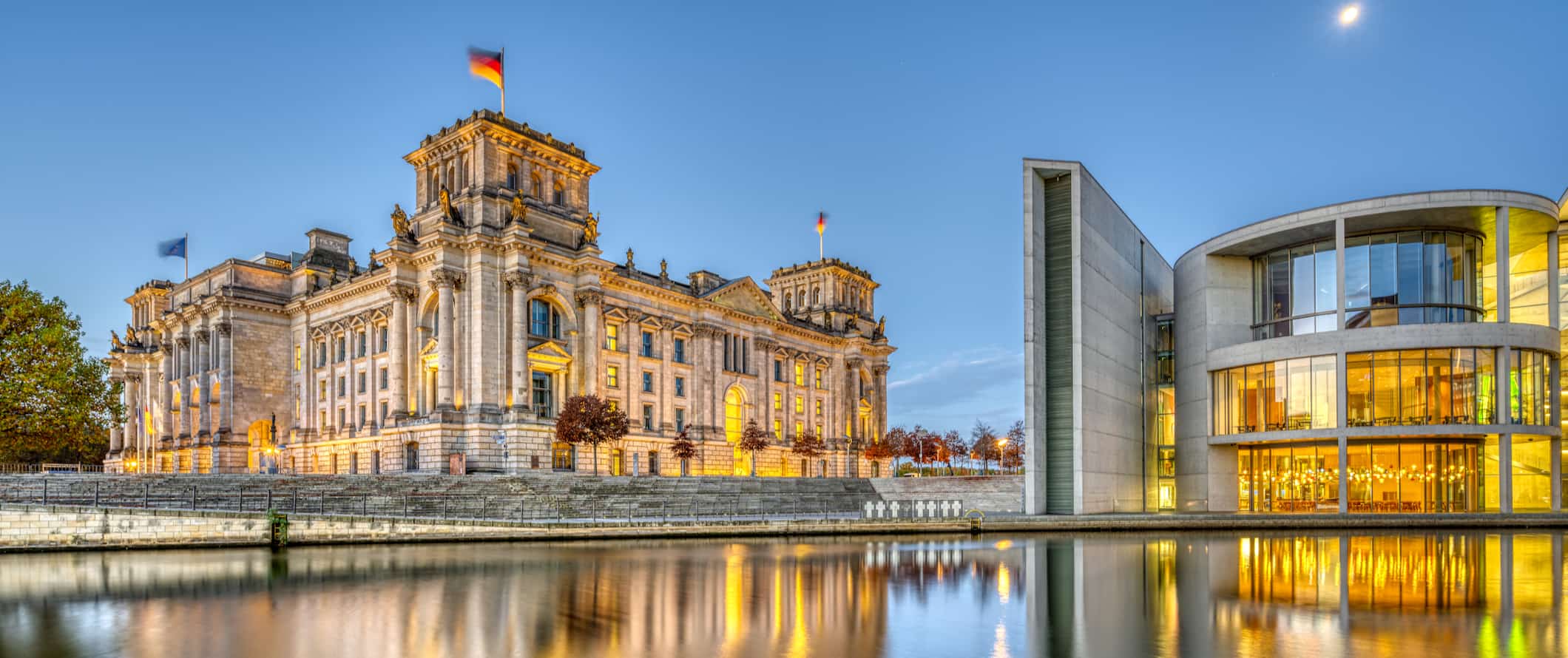
Hostel prices – Dorms cost 17-25 EUR per night while private rooms for two cost around 45-56 EUR per night. Free Wi-Fi and lockers are standard in all hostels in Berlin. Most hostels also offer free coffee/tea and have a kitchen and bar on site. Only a few hostels offer free breakfast, but many offer a breakfast buffet for an additional 5-8 EUR.
Many hostels also offer bike rentals for 10-15 EUR per day and some offer free walking tours. In a sign of the times, a few hostels even offer free COVID-19 testing.
Budget hotel prices – Budget hotels cost between 50-65 EUR per night. Free Wi-Fi, flat-screen TVs, and private bathrooms are standard, while free breakfast is not. Many hotels offer a breakfast buffet for 8-12 EUR.
Airbnb is available everywhere in Berlin, with private rooms costing about 30-45 EUR per night while full apartments start around 75-100 EUR per night in spring and 50-90 EUR in winter.
Food – Food in Germany is very cheap (and hearty). Meat is a staple of most meals, especially sausages; there are over 1,500 different kinds of sausages in Germany (sausages here are known as “wurst”). Stews are also a popular traditional choice, as are potato dumplings and sauerkraut. Breakfast is usually composed of bread, cold cuts, cheese, and boiled eggs.
Generally, eating out in Berlin is incredibly affordable. Currywurst, kebabs, and quick pizzas are all under 5.50 EUR. For the best kebabs, go to Mustafas. You’ll get a filling, delicious meal for around 5 EUR.
Eating out at one of the many Indian, Thai, or Turkish restaurants is the cheapest way to enjoy a sit-down meal in Berlin. A lunch meal at a Vietnamese restaurant is about 5.50 EUR while a main dish at an Indian restaurant is around 6.50-9 EUR.
For more cheap eats, check out Thai Park (Preußen Park). During the summer, Thai locals come to the park to cook up delicious and affordable Thai food. It started as just a small Thai community gathering but now it’s a huge food market with awesome eats for under 10 EUR.
At fast-casual eateries, a plate of schnitzel is around 6-8 EUR, pizza is 8-10 EUR, and a burger is 5-8 EUR. A combo meal at McDonald’s costs 9 EUR.
Expect to pay around 35 EUR for dinner for two. A meal at a higher-end restaurant costs about 15-17 EUR for a pasta entree, while a steak is around 23 EUR.
For drinks, a beer costs about 4 EUR at any bar or beer garden, a glass of wine is around 4.50 EUR, a cocktail is 7-10 EUR, and a cappuccino is 3.50 EUR.
Some of my favorite places to eat are Mustafa’s Gemuse Kebap, Konnopke’s Imbiss, Cocolo Ramen, Burgeramt, Markthalle Neun, MOM’S, and Nah am Wasser.
If you cook for yourself, you can spend as little as 45-50 EUR on groceries per week. This gets you basic staples like bread, eggs, rice or pasta, seasonal produce, and some meat. The cheapest places are Lidl, Penny, Netto, and Aldi.

Backpacking Berlin Suggested Budgets
If you’re backpacking Berlin, expect to spend about 55 EUR per day. This assumes you’re staying in a hostel, limiting your drinking, cooking all your meals, using public transportation to get around, and doing mostly free activities like walking tours and relaxing in the parks.
On a mid-range budget of 110 EUR per day, you can stay in a private Airbnb room, eat out for a few meals, rent a bike to get around or take the occasional taxi, enjoy a couple of drinks, and visit more attractions, such as the Berliner Dom or the Reichstag.
On a “luxury” budget of 200 EUR per day or more, you can stay in a budget hotel, eat out for all your meals, drink as much as you want, take taxis to get around, and do all the tours you want! This is just the ground floor for luxury though. The sky is the limit!
You can use the chart below to get some idea of how much you need to budget daily, depending on your travel style. Keep in mind these are daily averages — some days you’ll spend more, some days you’ll spend less (you might spend less every day). We just want to give you a general idea of how to make your budget. Prices are in EUR.
Berlin Travel Guide: Money-Saving Tips
Berlin is an incredibly affordable city, which is why so many people try to move here. You can easily visit the city on a budget without doing much work. Things just don’t cost a lot of money unless you try to splash out. If you want to save even more money, here’s how to cut costs in Berlin:
- Use your student card – Student ID cards can come in handy to purchase meals, drinks, accommodation, and visit museums at a discount. Always ask if there is a student discount.
- Eat the street food – Berlin’s street food scene is epic. There is a currywurst stand or fast-food stall on every corner, especially around markets and parks. You can get filling sausages and burgers for just a few euros, especially at busy places like Mauerpark, Markthalle Neun, and the Turkish Market.
- Eat Asian/Turkish food – You can get a kebab or falafel for as little as 3 EUR. On weekends, Thai Park (at Preußen Park) offers the best cheap Thai food outside of Thailand!
- Take a free walking tour – New Europe Tours run daily walking tours that cover the main highlights. They also run tours around various historic themes (communism, Nazism, Jewish history, etc.) for great low prices, if you have a more specific interest. You can also take the Alternative Berlin tour, which showcases the artsy side of Berlin.
- Get the lunch specials – There are lunchtime specials during the week in Oranienburgerstr. For example, you can get a starter and main course in very nice restaurants for around 6 EUR. It’s a great deal if you want to eat out.
- Stay at a hostel that includes breakfast – If you want to cut costs, stay at one of the city’s hostels that includes breakfast. You can expect different kinds of fresh bread, müesli, cheeses, cold cuts (like ham, turkey, and salami), maybe a boiled egg, and fresh fruit and coffee. It’s filling and will save you money.
- Get a transportation pass – A day ticket with unlimited travel in city center zones costs 8.80 EUR, and a week pass is 36 EUR — much cheaper than paying per ride. You can use your tickets across the train, tram, and bus network, saving you a fortune if you plan on seeing a lot of the city.
- Get the Berlin Welcome Card – The Berlin Welcome Card offers free public transportation, discounts on over 200 attractions, and free entry into many of the paid museums. It can be a good deal if you’re going to a lot of museums. A two-day card is 24 EUR, while a three-day card is 39 EUR. You can get a card for up to six days for 50 EUR.
- Grab a beer on the go – You can enjoy a beer just about anywhere in Berlin. Pick up a large beer from the supermarket or Späti (a corner store) for as little as 0.80 EUR and head to the park to lounge the day away.
- Stay with a local – If you want to cut down your travel costs while also getting some local insight into the city, use Couchsurfing. Not only will you save money but you’ll meet locals who can help get you off the beaten path. Since Berlin is a popular city, be sure to send your requests in advance (especially in the summer!).
- Bring a water bottle – The tap water here is safe to drink so bring a reusable water bottle to save money and reduce your plastic use. LifeStraw is my go-to brand as their bottles have built-in filters to ensure your water is always clean and safe.
Where to Stay in Berlin
Berlin has hostels all over the city, so it’s really a matter of finding a neighborhood that suits you best. These are my suggested and recommended places to stay in Berlin:
- Meininger Berlin Tiergarten
- Heart of Gold Hostel
- Circus Hostel
- EastSeven Berlin Hostel
- Pfefferbett Hostel
- Minimal Hostel Berlin
- St. Christopher’s
How to Get Around Berlin
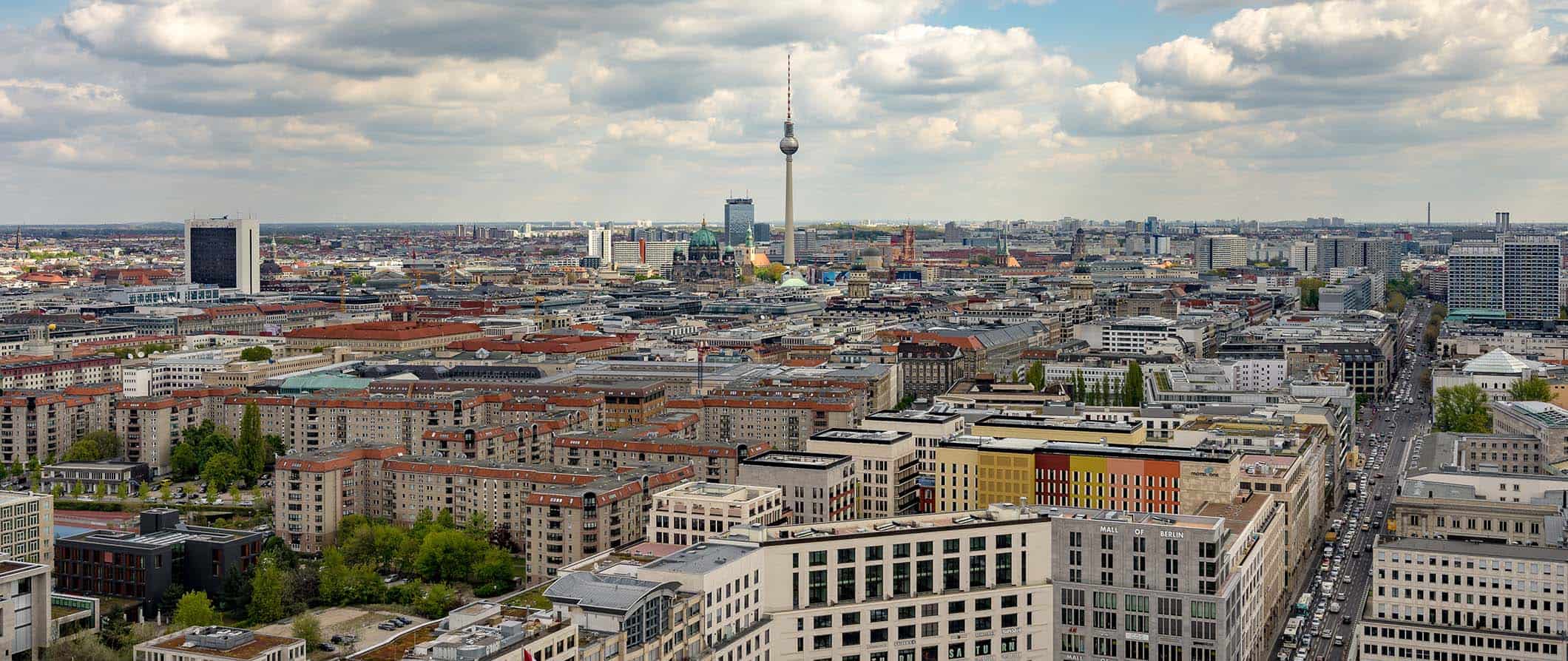
Public transportation – Berlin is a sprawling city, but it’s incredibly well connected by its subway (U-Bahn) and above-ground train system (S-Bahn). You can even get to the outlying neighborhoods quickly. A single ticket is 3 EUR and is good for up to 90 minutes. If you’re outside the AB zone, the ticket price increases. For example, a ticket to Brandenburg Airport is 3.80 EUR.
You can purchase tickets on the platform or via the BVG app. Always keep your ticket on you as random checks on the train are common.
A day ticket with unlimited travel in Zones AB (Berlin city proper) costs 8.80 EUR, and a week pass is 36 EUR. You can use your tickets across the train, tram, and bus network, but be sure to check your route ahead of time.
There are a handful of tram lines around Berlin’s central neighborhoods, but they’re not as fast or efficient as the trains. Ticket prices are the same as the train.
There are also over one hundred bus lines around Berlin that get you anywhere you need to go, especially on weeknights after the trains shut down. Ticket prices are the same as the trains and trams.
Bicycle – Berlin is incredibly easy to cycle around, with well-marked bicycle lanes. Most bicycle rentals start at 5 EUR per day. Bike-sharing programs like Donkey Republic, nextbike and Call a Bike offer rentals for 1 EUR per 30 minutes or 9 EUR for the day. Nextbike also offers day passes for 3 EUR with which you get the first 30 minutes of each rental free. A week pass offering the same is 15 EUR.
Taxi – Taxis are not cheap here, but you’ll rarely need to use one. The base rate is 4 EUR, and it’s an additional 2 EUR per kilometer afterward. Skip them if you can.
Ridesharing – Uber is available in Berlin, but you shouldn’t need to use it much, if at all, as the public transportation here is fast and reliable.
Car rental – Car rentals start at 30 EUR per day for a multi-day rental, however, you won’t need one unless you’re leaving the city. Even then, the bus and train system can likely get you where you need to go for cheaper. Renters need to be at least 21 years old.
When to Go to Berlin
Spring and summer are peak seasons in Berlin (especially May-September). The whole city comes alive as people get out to enjoy temperatures in the 30s°C (high 80s°F). This is really when Berlin’s parks and markets come alive so I’d try to visit during this time if you can. Just book your accommodation in advance.
While winters are dark and cold with temperatures dropping to 0°C (32°F), Berlin doesn’t get a lot of snowfall and the Christmas season is magical — mostly due to the city’s many Christmas markets. You avoid the tourist crowds during this time as well.
How to Stay Safe in Berlin
Berlin is pretty safe, but like all big cities, there is petty crime (such as pickpocketing). Be careful on busy public transit and around crowded tourist attractions, especially in Alexanderplatz. ATM scams are unfortunately also a problem here. Whenever possible, withdraw money from inside a bank where you know there are security cameras and/or guards.
Violent crime is rare but avoid certain areas of town like Kottbusser Tor, Görlitzer Park, Neukölln, and Volkspark Hasenheide after dark if you’re traveling alone. The area around Warschauer Straße station is a natural nightlife hub where ridiculously drunk people always end up. Be mindful of your whereabouts and your belongings, as this place is a hotspot for pickpocketing and sometimes even assault.
It’s no secret that drugs are big in Berlin. Much of the drug exchange happens at Kottbusser Tor – if you’re walking through here, do so with caution.
When out at the bar, always keep an eye on your drink and never leave it unattended. Additionally, never walk home alone if intoxicated, especially if leaving a club late at night.
If you’re worried about getting scammed you can read about common travel scams to avoid here.
If you experience an emergency, dial 112 for assistance.
The most important piece of advice I can offer is to purchase good travel insurance. Travel insurance will protect you against illness, injury, theft, and cancellations. It’s comprehensive protection in case anything goes wrong. I never go on a trip without it as I’ve had to use it many times in the past.
Berlin Travel Guide: The Best Booking Resources
These are my favorite companies to use when I travel. They consistently have the best deals, offer world-class customer service and great value, and overall, are better than their competitors. They are the companies I use the most and are always the starting point in my search for travel deals.
- Skyscanner – Skyscanner is my favorite flight search engine. They search small websites and budget airlines that larger search sites tend to miss. They are hands down the number one place to start.
- Hostelworld – This is the best hostel accommodation site out there with the largest inventory, best search interface, and widest availability.
- Booking.com – The best all around booking site that constantly provides the cheapest and lowest rates. They have the widest selection of budget accommodation. In all my tests, they’ve always had the cheapest rates out of all the booking websites.
- HostelPass – This new card gives you up to 20% off hostels throughout Europe. It’s a great way to save money. They’re constantly adding new hostels too. I’ve always wanted something like this and glad it finallt exists.
- Get Your Guide – Get Your Guide is a huge online marketplace for tours and excursions. They have tons of tour options available in cities all around the world, including everything from cooking classes, walking tours, street art lessons, and more!
- The Man in Seat 61 – This website is the ultimate guide to train travel anywhere in the world. They have the most comprehensive information on routes, times, prices, and train conditions. If you are planning a long train journey or some epic train trip, consult this site.
- Rome2Rio – This website allows you to see how to get from point A to point B the best and cheapest way possible. It will give you all the bus, train, plane, or boat routes that can get you there as well as how much they cost.
- FlixBus – Flixbus has routes between 20 European countries with prices starting as low 5 EUR! Their buses include WiFi, electrical outlets, a free checked bag.
- SafetyWing – Safety Wing offers convenient and affordable plans tailored to digital nomads and long-term travelers. They have cheap monthly plans, great customer service, and an easy-to-use claims process that makes it perfect for those on the road.
- LifeStraw – My go-to company for reusable water bottles with built-in filters so you can ensure your drinking water is always clean and safe.
- Unbound Merino – They make lightweight, durable, easy-to-clean travel clothing.
- Top Travel Credit Cards – Points are the best way to cut down travel expenses. Here’s my favorite point earning credit cards so you can get free travel!
- BlaBlaCar – BlaBlaCar is a ridesharing website that lets you share rides with vetted local drivers by pitching in for gas. You simply request a seat, they approve, and off you go! It’s a cheaper and more interesting way to travel than by bus or train!
Berlin Travel Guide: Related Articles
Want more info? Check out all the articles I’ve written on backpacking/traveling Germany and continue planning your trip:
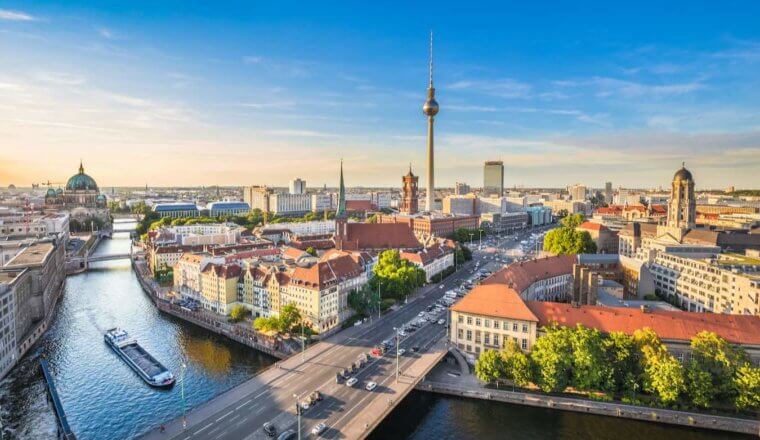
Where to Stay in Berlin: The Best Neighborhoods for Your Visit

How to Survive Oktoberfest
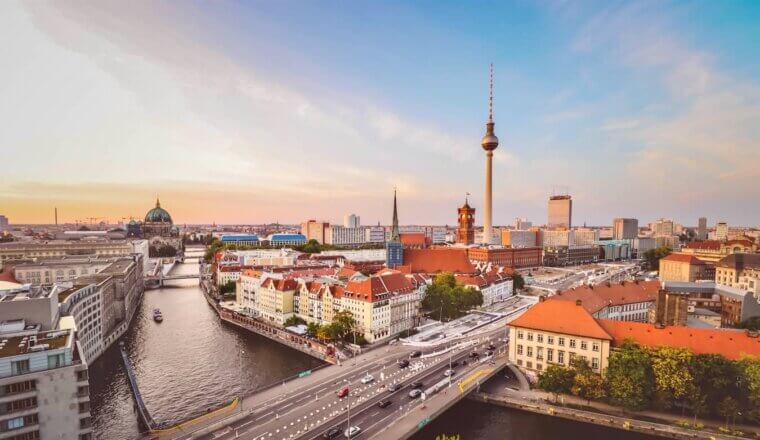
The 18 Best Things To Do in Berlin
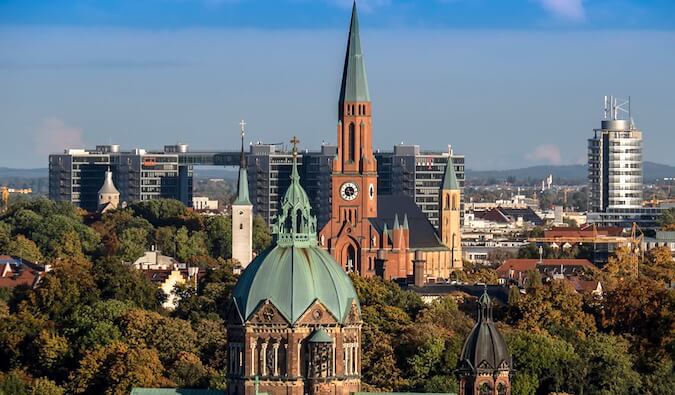
Munich is Better than Berlin
Get my best stuff sent straight to you, pin it on pinterest.
- Where To Stay
- Transportation
- Booking Resources
- Related Blogs
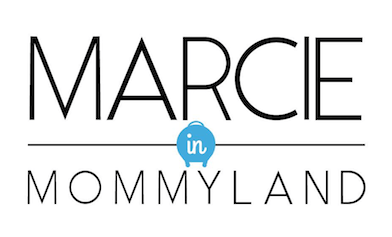
Germany on a Budget: Advice for Dirt-Cheap Travel + 4 Fantastic Tips
Posted on Last updated: November 1, 2023
Home » Destinations » Europe » Germany » Germany on a Budget: Advice for Dirt-Cheap Travel + 4 Fantastic Tips
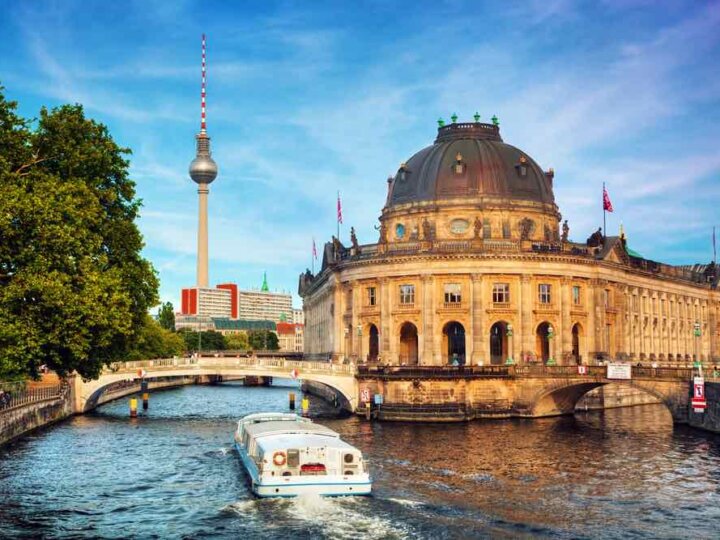
Sharing is caring!
Are you planning a trip to Germany on a budget? Don’t miss out on the top advice for frugal Germany travel! Keep reading for all the details.
This post about planning a trip to germany on a budget was co-written by family travel expert marcie cheung and contains affiliate links which means if you purchase something from one of my affiliate links, i may earn a small commission that goes back into maintaining this blog..
Guest post by Emma Erichsen of Emma Adventures
Germany is a fairytale-like country nestled in Western Europe that truly has something for everyone. It’s a family-friendly destination with plenty of things to see and do with so much history, art, culture, and good food.
There are castles and gorgeous little towns to explore, but it can be a little on the expensive side. The good news is that you can travel to Germany on a budget by being savvy!
Below I’ll share what I’ve learned during my extensive travels across Europe and give you my top 4 tips for budget travelers.
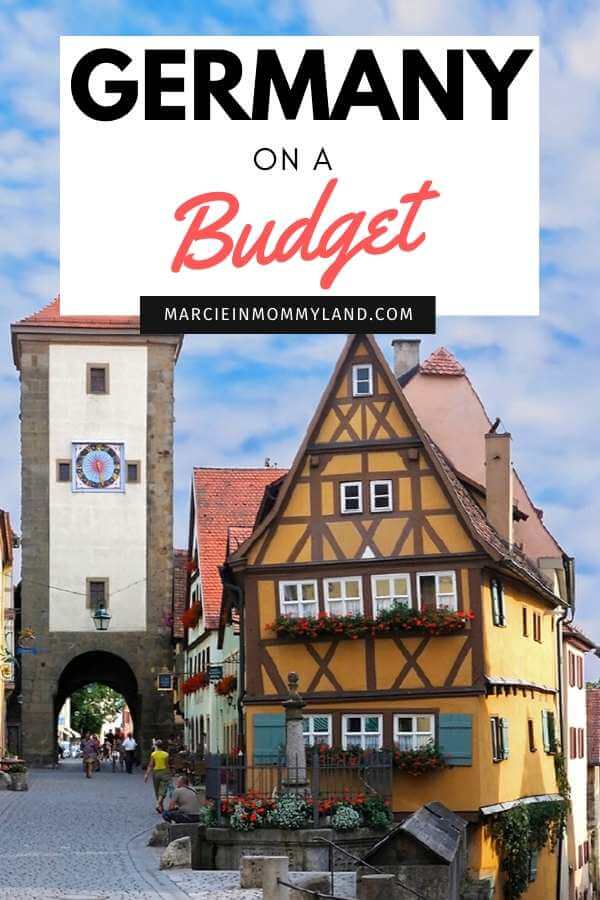
Priceless Advice for Traveling Germany on a Budget
Your money matters.
The currency in Germany is the Euro (EUR), much like most countries in the European Union.
Credit and debit cards are accepted most places these days. But it’s wise to always carry some cash, especially for smaller purchases, such as markets and food stalls.
ATMs are common in all central areas in Germany but be aware that some banks may charge fees for foreign transactions.
And it’s a good idea to notify your bank of your travel plans before you leave. This way you’ll avoid annoying issues with your card being blocked for suspicious activity!
Getting Around on a Budget in Germany
Getting from place to place is often the most expensive part of traveling. All the expensive internal flights can add up! Instead, save money by using Germany’s great regional trains, DB train line !
This is Germany’s excellent long-distance train system. They make getting around a whole lot cheaper and run between all major cities in Germany.
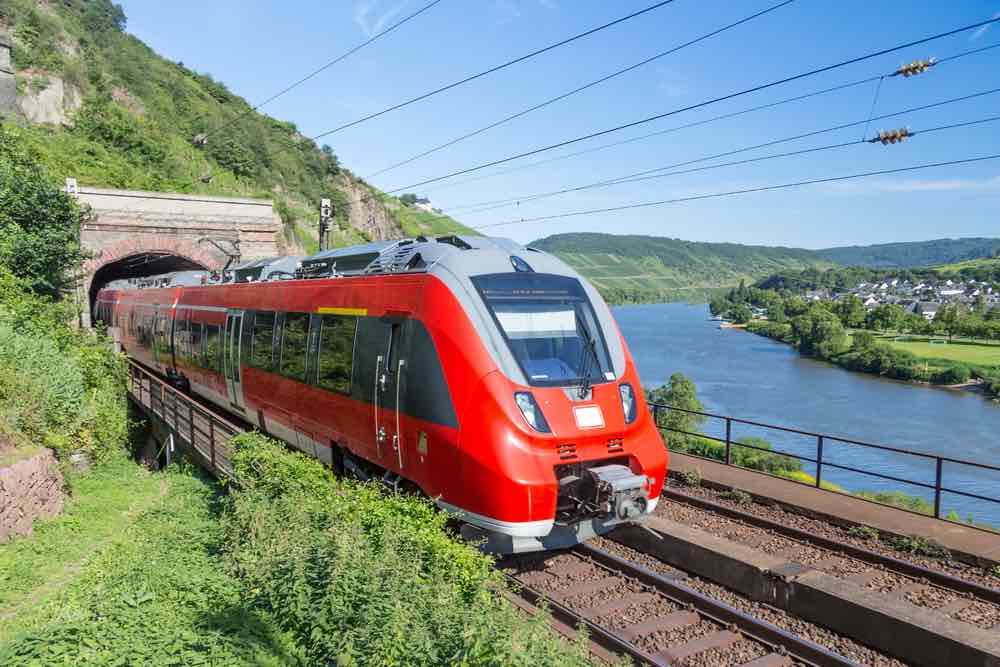
DB trains are cost-effective and time efficient too. You should book online in advance, and book standard tickets.
The carriages and seats have plenty of room and are comfortable. And for longer trips, just pick up some snacks from the local stores at the train stations.
Through the train system, you can do just about any route you like between major cities. For example, you could take Frankfurt to Cologne, Frankfurt to Munich, and Munich to Nuremberg.
Once you are in each city, there are plenty of options for getting around. Car rentals are popular but can be pricey. In the big cities, trams are the way to go! They’re fast, efficient, and only cost a few euros.
Trams are public transportation that runs on rails, similar to street cars in the US. Often tram stops are combined with bus stops in the cities and they’re easy to find.
They run frequently between the most popular spots and tickets are affordable. Plus, if you plan on using the tram to get between several places, you can buy multi-trip tickets to save some money.
In smaller cities, you’ll find most things are within walking distance. This is especially true if you opt to stay in accommodation that is centrally located.
Dining Out in Germany
When you visit Germany, you realize really fast that food and drink can get pricey, especially if you don’t know where to go. Often, restaurants and cafes in major tourist hot spots are extremely overpriced, and it’s easy to get sucked into these traps.
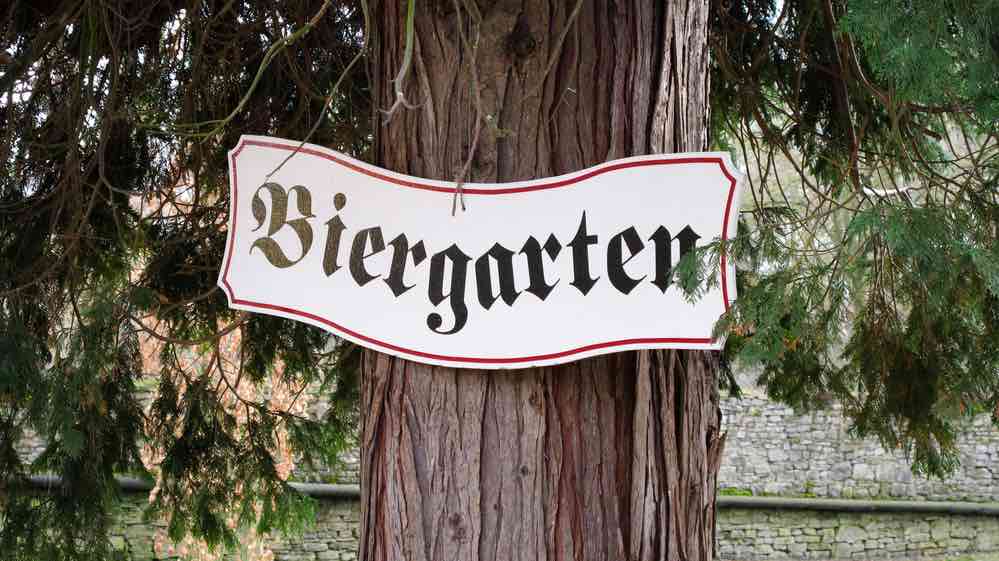
The best way to save money on your next dine-in meal is to venture a little out of the major tourist areas. Find places that are slightly off the beaten path.
I guarantee you’ll still get an excellent meal! But you’ll be saving money while also enjoying a more authentic experience.
Street food and market food are also great ways to eat for less without missing out. Market eats in Germany are amazing and cheap. And can get all the German street food favorites for half the price you would in a restaurant.
My suggestion is to make sure you book a hotel with breakfast included. Fill up on that before leaving your hotel in the morning and for lunch, stop for market food.
Then for a memorable dinner, pick a spot slightly out of the main tourist area!
Germany Accommodations
There’s just about any style of accommodation in Germany, with no shortage of options. Traditional hotels and hostels are the most popular, and you can find something at every price point!
If you’re looking for a legal vacation rental in Germany, you might be able to find them, but they’re rare. There’s been a debate for decades on whether it’s ethical to have short-term vacation rentals in the country because of housing shortages.
Even if the price is tempting, I don’t suggest them! Save yourself any potential headache! Especially when traveling with kids, go with a dependable hotel.
My recommendation for family-friendly accommodations without breaking the bank is a boutique-style hotel. They’re often just as nice as chain-style hotels, but cheaper. And they always have a breakfast included option.
Budget Sightseeing by City
German cities all have amazing and unique things to do! They each have their own personality and they all have different ways to save money.
It can be hard to decide where to go in Germany, with so many spectacular cities to choose from. They’re all so beautiful with their own history and points of interest.
Below you’ll learn some of the best free and budget-friendly things to do in some of the most popular cities in Germany.
Berlin on a Budget
The great thing about Berlin is that there are heaps of free things to do, as well as lots of ways to save money. Germany’s history-filled capital is incredible, and although it seems pricey, there are lots of ways to do it cheap.
Free things to do in Berlin include visiting East Side Gallery, Brandenburg Gate, the Holocaust Memorial, Berlin Wall Memorial and Check-Point Charlie.
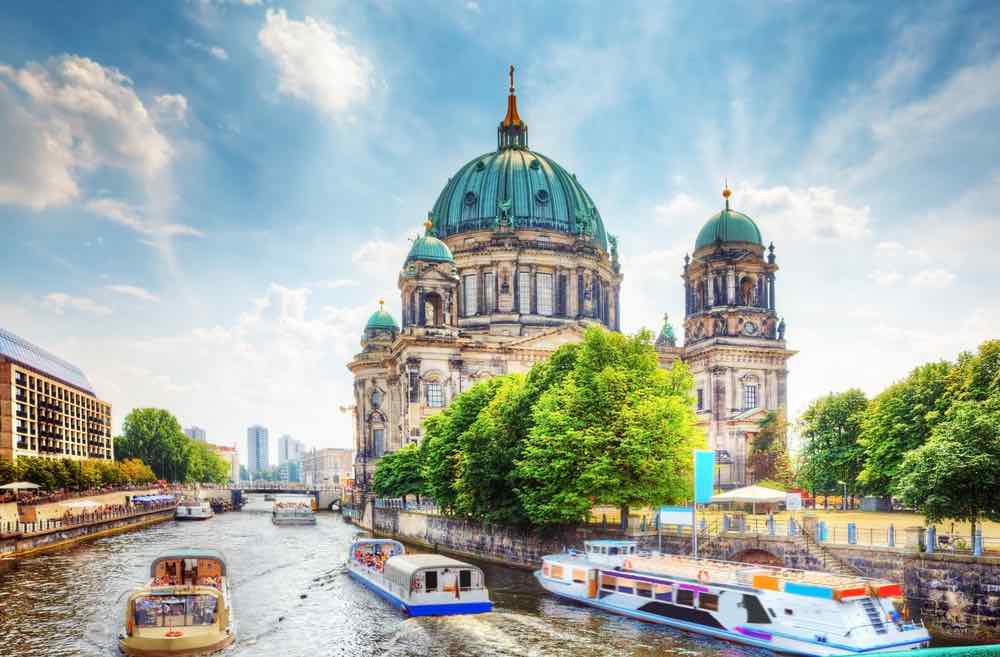
You can also save money by opting to admire some of Berlin’s architecture without going inside and paying admission fees. The Berlin Cathedral is a great option here, being absolutely beautiful from the outside!
Berlin also has some incredible museums, many of which offer free entry for kids under a certain age. And many have free museum days at certain hours during the week.
The Germany History Museum offers free entry for kids under the age of 18. Hamburger Banhof and Martin-Gropius-Bau both offer free entry for kids under the age of 16. These are just some of the many amazing things to do in Berlin with kids .
Munich on a Budget
Munich is the heart of Bavaria, and a must on any Germany trip. But because it’s a tourist hot spot, prices can be quite high.
So, I recommend avoiding eating out in the central spots (such as Marienplatz and the area around Hauptbanhof) to avoid increased prices on meals.
Instead, wander a couple of streets away from these busier areas. If you take the time to walk out a bit further, you’ll find plenty of amazing dining choices for better prices.
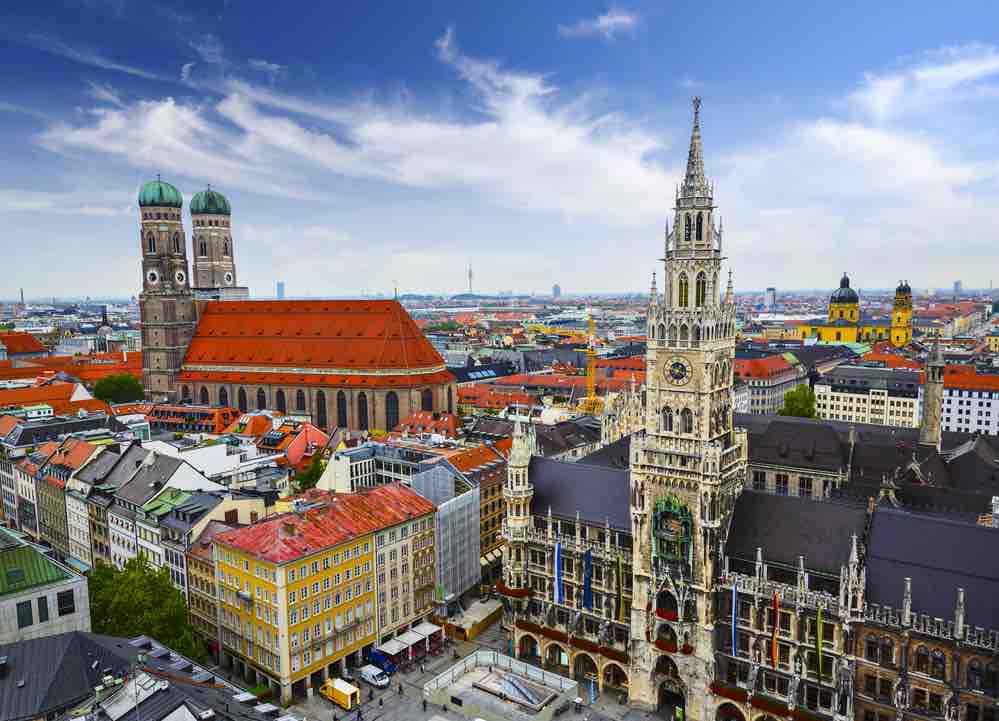
Munich is a larger city, so the cheapest way to get around without spending lots of money is to use local transportation, like train and trams.
The trams are cheaper for shorter distances. Plus, you can buy multi-trip tickets which will save you money if you plan to use the trams or trains frequently.
Munich also has lots of amazing things to do that are free or budget friendly. For free things to do, check out Marienplatz, Englischer Garten, and Olympia Park.
You can also enter Asam Church for free to see the gilded baroque interiors. Or take a trip to Nymphenburg Palace. Although you have to pay to get in, it’s only a few Euros, and kids under 17 are free.
This is one of my favorite things to do in Munich. Plus, you can admire the architecture and gardens without entering the palace, which is just as good!
Frankfurt on a Budget
Germany’s bustling transport and business hub is the heart of the action in west Germany. And it’s a great city with plenty of things to enjoy on a budget.
The city itself is a little cheaper than some of the bigger tourist hot spots in Germany. So, you’ll find that food and accommodation are slightly cheaper!
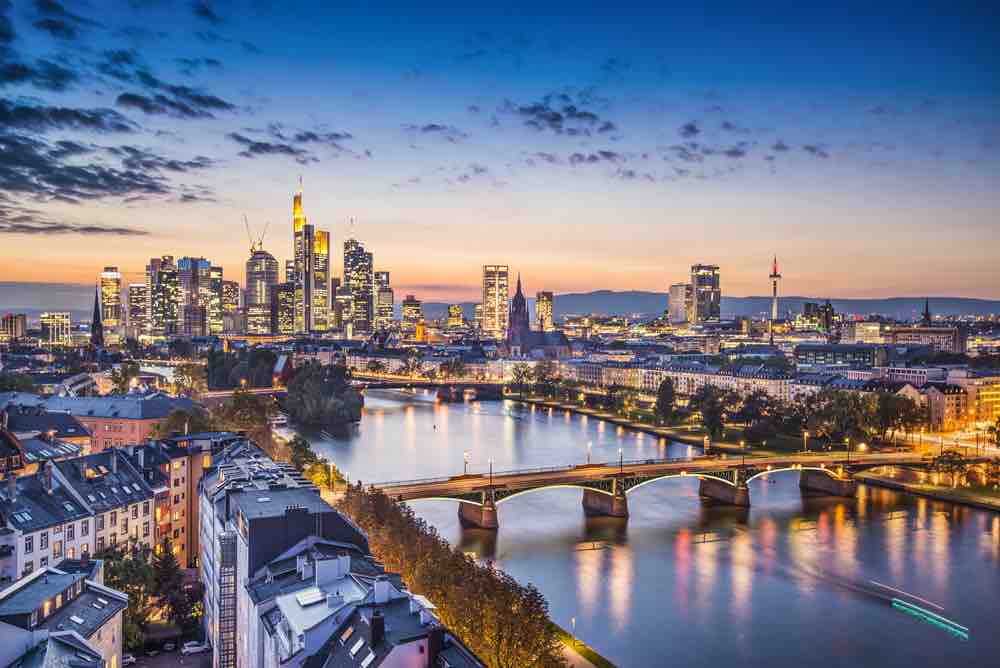
Frankfurt has excellent transportation systems in place. Both the tram system and train system in Frankfurt are great ways to get around quickly and cost less than if you used a car rental or cab.
Some of the best things that Frankfurt has to offer are free! I recommend exploring Romerberg and Hauptwache. You can walk along the River Main and admire Frankfurt Cathedral.
For amazing views of Frankfurt from above, get a family ticket for less and go up to the Observation Deck of Main Tower. Or check out the Frankfurt Transportation Museum and see vintage trams!
Cologne on a Budget
Cologne is a beautiful historical city just an hour north of Frankfurt. It’s a great place to get a feel for a traditional German town without breaking the bank.
Most things in Cologne are really close together. This is a big plus because you can easily walk between all the main attractions without having to pay for transport.
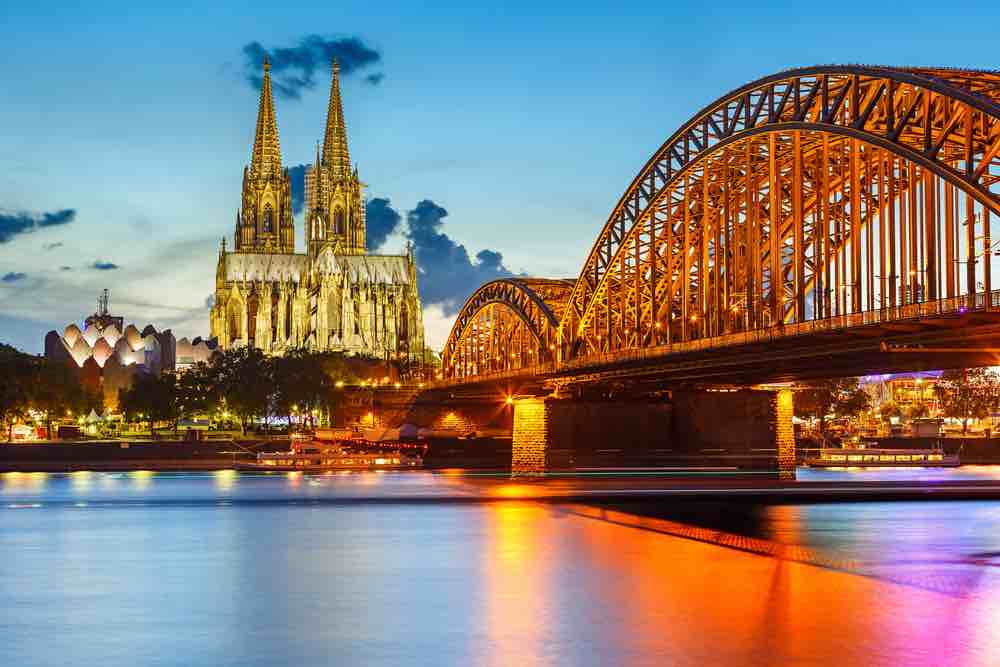
Cologne Cathedral is the city’s biggest attraction, and it’s incredible! Plus, it’s free to enter. Spend time admiring the cathedral from every angle outside before heading in to see the stunning interiors.
If you wish to climb to the top of the cathedral, the cost is only 3 Euro. However, you can definitely experience Cologne Cathedral without spending a cent!
You can also visit Hohenzollern Bridge (the famous love locks bridge), and explore the old town, both of which are completely free to do!
Nuremberg on a Budget
Nuremberg is a gorgeous medieval city with a whole lot of history. It’s located an hour north of Munich, which makes it worth a visit when you travel Germany.
Basically, all of the main attractions in Nuremberg are within walking distance of each other, so you’ll save tons of money on transport. The tram system is also excellent, and it’s cost-effective for traveling longer distances.
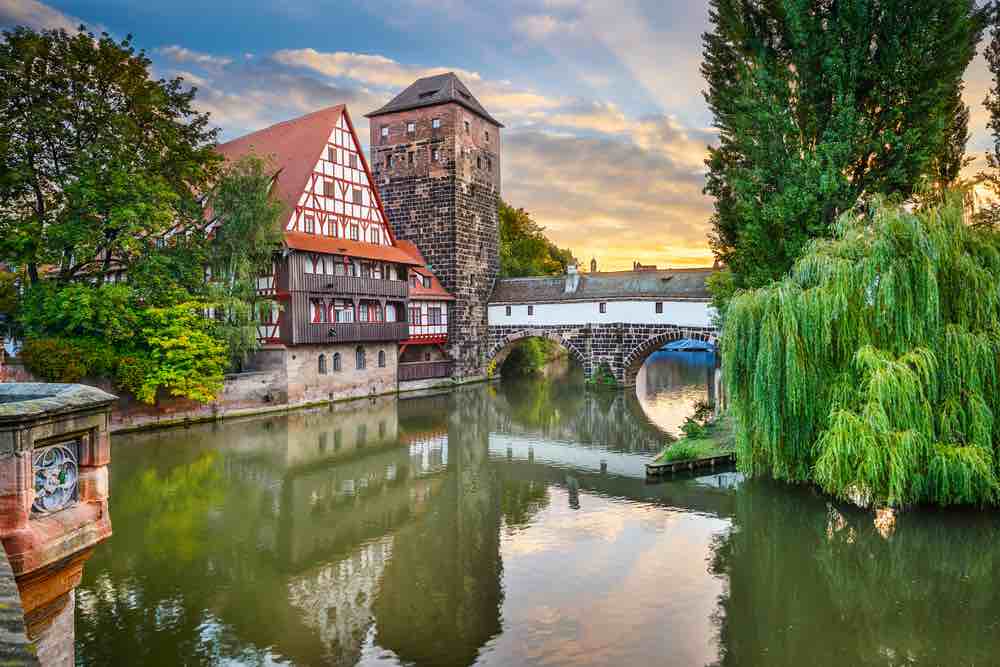
One of the best things about Nuremberg is all the quality cultural experience you can soak up on a budget! The city is packed with medieval architecture, history, and that traditional German feel visitors want.
One of Nuremberg’s top attractions, Nuremberg Castle, is free to visit. And there are stunning views across the city from the top. You can also wander the Old Town and Bridges for free and walk the Way of Human Rights.
But I think one of the best things to do in Nuremberg is just wander the Old Town and surrounding areas. There are hidden gems are around every corner, and the best part is, it’s completely free to do!
My 4 Top Money-Saving Tips for Traveling in Germany
Now you have solid advice from someone who has been all over the Germany countryside! But to make things super simple, here are my 4 most essential travel tips for saving money in Germany.
- Travel between destinations by the DB Trains. Hands down, this is the easiest and most affordable way to travel Germany.
- For a cheaper accommodation, go with a boutique-style hotel slightly out of the city center. And when booking, make sure you choose a listing with breakfast included.
- For cost-effective (and the yummiest!) food options in Germany, eat street food and always explore the popular outdoor food markets.
- Check for free museum visiting hours. Also, look for museums that have free admission for kids.
- When in doubt, look for historical sites. They’re the most likely attractions to be free. Historic squares in Germany are another great free option guaranteed to be full of German history and culture.
FAQ about Germany on a Budget
It’s true, flights to Germany can be mind-blowingly expensive! But there are a few ways to save. You’ll find the cheapest flights in the off-season, which is January through February and October through November. Also try to fly mid-week rather than the weekends for the best deals.
Frankfurt is definitely the most walkable big city in Germany! All the major sights you’ll want to see are around the Frankfurt Am Main, which can be easily walked. This city is great if you’re looking for free activities, like exploring historic squares. And the Frankfurt Cathedral is a must-see with the River Main close by.
Skip the car and save money by using the country’s quality public transportation system to get around. Most locals that live in the cities don’t even have a car! If you stick to the bigger cities, you can use trams and busses to get around. And the small towns are very walkable.
Visit Germany on For Less with Advice from a World Traveler
Germany really is the perfect travel destination, and I guarantee you’ll fall in love with it like I did! It’s both a family-friendly and budget-friendly place, if you know what to do.
For more ways to advice on what to do in Germany, check out these Germany travel tips !
Emma writes the travel blog Emma Adventures. Follow her on or Facebook .
This site uses Akismet to reduce spam. Learn how your comment data is processed .

Germany Budget Travel Guide 2023

Germany is a fascinating country to explore, with a rich history, diverse culture, and stunning scenery. The country is also a great destination for budget travelers, with many affordable options for accommodation, food, and activities.
In this guide, we’ll provide you with a detailed breakdown of how to travel Germany on a budget with tips on saving money, where to stay, what to eat, and what to do.
Budget Accommodation in Germany
One of the best ways to save money while traveling in Germany is to choose budget-friendly accommodation . Here are some options to consider:

Hostels are a popular option for budget travelers in Germany. They offer dormitory-style rooms with shared bathrooms and private rooms for couples or families. Hostels are often centrally located and have common areas where travelers can meet and socialize.
Airbnb is a popular accommodation option in Germany, especially for those who want more privacy and space than a hostel can offer. Airbnb apartments are available in all major German cities and can be a more affordable option than hotels.
Guesthouses
Guesthouses are another option for budget travelers in Germany. They offer basic accommodation with shared facilities, and are often family-run. They can be found in smaller towns and rural areas, and can be a great way to experience local culture and hospitality.

Germany has a great camping culture, and there are many campsites throughout the country. Campsites are often located in scenic areas, and can be a more affordable option than hotels or apartments.
Budget Transportation in Germany
Transportation costs can add up quickly while traveling in Germany, but there are ways to save money on transportation:
Public Transportation
Public transportation in Germany is efficient and affordable. Cities have extensive networks of buses, trams, and subways that are easy to navigate. Many cities also offer day or multi-day passes that can save you money on transportation.
- Regional Trains – Regional trains are a great way to travel between cities in Germany. They’re often cheaper than high-speed trains, and offer more flexibility in terms of scheduling. The Deutsche Bahn website offers discounts on regional train tickets if you book in advance.
- Car Sharing – Car sharing services like BlaBlaCar and FlixBus are popular in Germany, especially for longer journeys. They’re often cheaper than trains, and can be more comfortable and convenient for travelers with luggage.
- Bike Rentals – Many cities in Germany have bike rental schemes, which can be a fun and affordable way to explore the city. Bikes can be rented by the hour or day, and are often available at stations throughout the city.
Budget Food and Drink in Germany

German cuisine is hearty and filling, with many options for budget-conscious travelers. Here are some of the best options for affordable food and drink in Germany:
Street Food
Germany has a great street food culture, with many vendors selling affordable snacks like sausages, pretzels, and currywurst. Street food is often available in markets, festivals, and outdoor events.
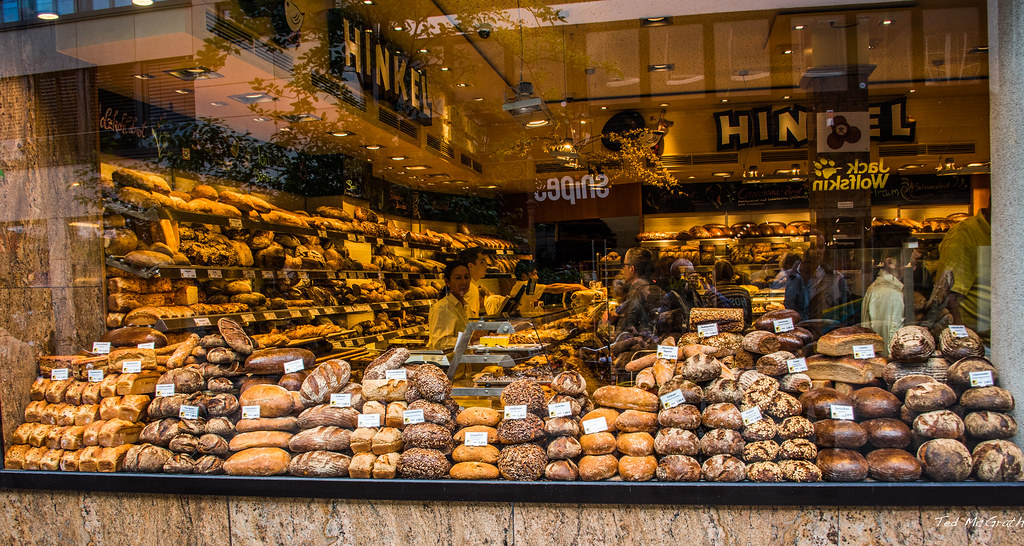
Bakeries are a great option for affordable breakfast or lunch in Germany. They offer a wide variety of bread, pastries, and sandwiches, and are often located throughout the city.
Supermarkets
Supermarkets like Aldi and Lidl are popular in Germany, and offer affordable options for groceries and snacks. They’re a great option for travelers who want to cook their own meals or pack a picnic for the day.
Beer Gardens
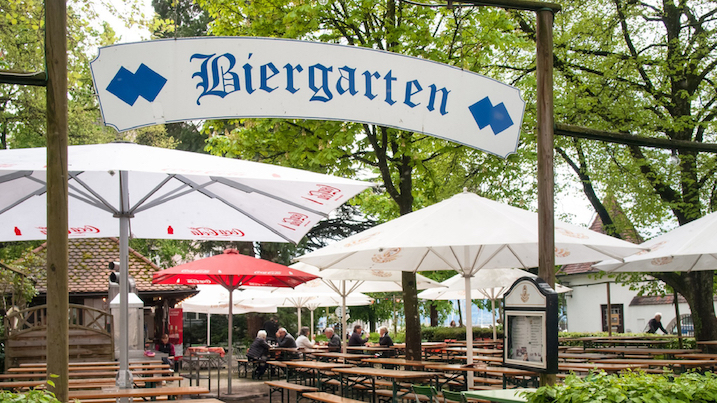
Germany is famous for its beer; beer gardens are a great place to enjoy a pint or two on a budget. Beer gardens are often located in parks and open spaces, and offer a relaxed and friendly atmosphere.
Budget Activities in Germany
Germany has a wide range of activities to offer budget-conscious travelers. Here are some options for affordable things to do in Germany:
Free Walking Tours
Many cities in Germany offer free walking tours, which are a great way to explore the city and learn about its history and culture. Locals lead the tours and are often available in multiple languages.
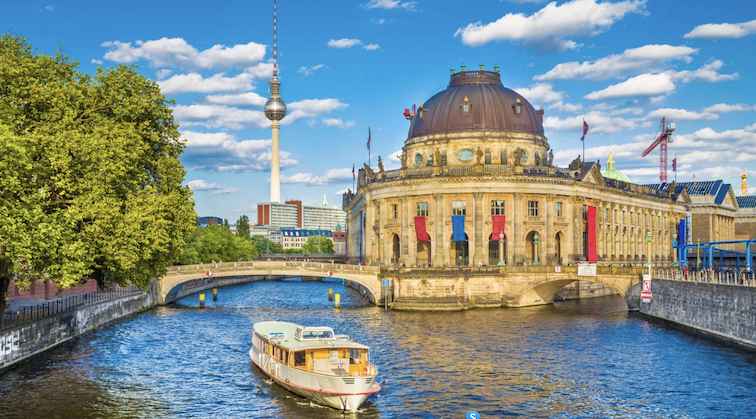
Parks and Gardens
Germany has many beautiful parks and gardens, which are often free to enter. They’re a great place to relax and enjoy the scenery; some even offer free concerts and events.
Hiking and Biking

Budget Tips for Traveling in Germany
Buy a travel pass.
Many cities in Germany offer day or multi-day travel passes that can save you money on transportation. It’s worth checking the city’s website or tourist information center.
Eat and drink like a local
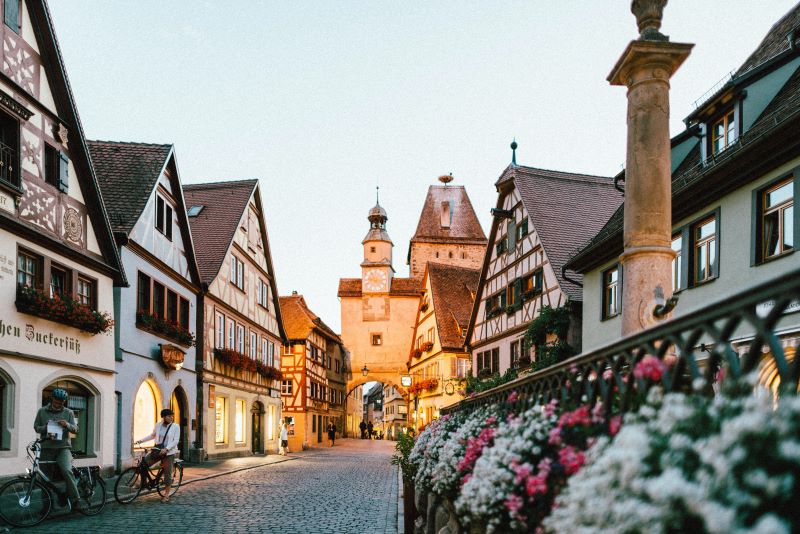
Local cuisine is often more affordable than international dishes, and can give you a taste of the local culture. Try traditional dishes like schnitzel, sausages, and beer.
Use free WiFi
Many cafes, restaurants, and public spaces offer free WiFi in Germany. It’s worth looking for WiFi hotspots to save money on data roaming charges.
Booking accommodation and transportation in advance can save you money, especially during peak travel season. It’s worth checking online for discounts and special offers.
Germany is a fantastic destination for budget-conscious travelers. With affordable accommodation, transportation, food, and activities, there are many ways to experience the best of Germany without breaking the bank.
By following these tips and planning ahead, you can enjoy a memorable trip to Germany without overspending.
Be sure to check out our vlog The Go To Family . Connect with us on Instagram , Twitter , and Pinterest !
Related posts

These Are Vietnam’s Best Must-Try Street Food Across Its Major Cities, From Hanoi To Ho Chi Minh

Mexico With Kids: 15 Best Family-Friendly Things To Do
This site uses Akismet to reduce spam. Learn how your comment data is processed .

How to Travel to Germany on a Budget: What to Know
Posted on Last updated: April 3, 2024
Germany is a beautiful place to visit year-round, but you must prepare properly to travel Germany on a budget . It’s a country of many different scenes, from big cities to wilderness and ski slopes, each with its own unique costs at different times of the year.
Whether you’re planning to visit Germany during the summer or the festive season, you’ll need to plan a good budget for Germany or at least inform yourself about different tendencies in Germany with money, costs, and spending as it can be different than what you are used to in other European countries
But that’s why I wrote this article – to help YOU be the most prepared to enjoy Germany to the fullest on a budget by planning ahead, knowing what to buy in advance, what transport to take, what accommodation to book, what to avoid, and knowing what cities are cheaper for anything from food to flights.

How To Budget For Your Trip To Germany
Below you’ll find some of the best tips and tricks to remember when planning a trip to Germany on a budget.
Consider The Cost Of A Tourist Visa
Germany requires most travelers to have a Schengen visa. The Schengen visa allows you to enter many countries and costs €80. However, if you’ve already obtained a Schengen visa for a previous trip, you will be able to use this visa for your trip to Germany (so long as the visa is still valid).
Applying for a Schengen visa is simple, and you can complete the application forms online for convenience. If you are not required to apply for a visa to travel to Germany, you may still require a visa waiver.
You will need to research the documents and information you need to fill in the correct forms, and you can find more information online to help you prepare for the application process.
Establish Your Budget Goals
Many people book their holiday based on recommendations before establishing their budget. However, you can find many unique places that could be cheaper than more famous spots.
So, establishing a clear budget for your German holiday will allow you to plan each facet of your trip with finances in mind. When choosing a hotel, destination, or flight, you will always be able to refer to your budget.
Many people become enthralled with hotels and places to visit when planning their trips. Creating a budget before you search means you can’t simply create a budget around a hotel or destination slightly out of your price range and that you make sure to stick to your Germany budget.

Consider Planning Your Germany Trip During The Off Season
When planning your trip, it’s essential to know that European countries and especially Germany are generally cheaper for travel in the off-season. Typically, Europeans have a vacation season during the summer, which is when they prioritize travel.
Times to Avoid When Traveling to Germany on a Budget
Schools generally break up for the summer, allowing parents to take their children on vacation. So, July and August are pretty much always busier and more expensive. Traveling to Germany around Oktoberfest (September in Munich is INSANELY pricey) and popular music festivals in certain cities will also make your trip more expensive.
Certain cities with famous Christmas markets may be more expensive during the holiday season in December. But other than that, most other months in Germany will be more affordable.
Planning your trip during the off-season will ensure you get a better deal due to the lower demand – and you might even have a little more room for negotiation.
Transportation in Germany on a Budget
There are some VERY important things to know about getting around Germany if you want to stay on a budget. Here they are!
Trains Can Be EXPENSIVE: Book Early or Opt for Other Transport
That’s right, the Deutsche Bahn (DB) train system is incredible, efficient, and high speed… but it comes at a price. If you need to take the train during your time in Germany, book your tickets as far in advance as possible. Trust me on this!
If you need to travel by train at the last minute (but have some time on your hands), consider taking the slower, more local trains to get to your destination. The info booth should be able to help you find more budget routes to your destinations.
For example, instead of taking a 2-3 hour direct train from Nuremburg to Berlin once, we took THREE different, slower, crowded trains for 7-8 hours that cost 1/4 the price. It’s all about what you prioritize!
DB also offers weekend tickets and saver tickets at certain times. Check for these during your trip!

Get Transportation Day Passes or Tourism Cards in Each City
Many/most German cities offer some kind of discount card for transportation or a tourism card that includes many of the main city attractions and transportation for a reduced fare.
When you know your destinations, check if they have any kind of day pass (you can often buy 24h, 48, or 72h passes that include certain things) or tourism cards that include the public transport.
The Berlin Welcomecard is one of the best examples of this and helps you save LOTS on pretty much all Berlin transport and top attractions in the city. The Munich CityTourCard also gets you discounts on 80+ different attractions, restaurants, and transport.
Opt for the Bus
In the last decade, Deutsche Bahn’s hold over German public transport was released, and more room has been made for budget bus companies to fill a long-missing void of cheap German public transport. To truly travel germany on a budget, travel by bus!
FlixBus is the most reliable budget bus company that has many routes throughout Germany. In fact, it touches down in DOZENS of German cities! This may be the cheapest and most convenient way to get around.
Try Rideshares like Blablacar
Ridesharing is very common in Germany and one of the best ways to save money while traveling in Germany. The app Blablacar allows drivers to upload their trips, and riders to search for trips along their routes. Drivers set the price and riders agree to pickup and dropoff points.
Blablacar is so common in Germany that there are nearly always a few cars going between big German cities, and it is often a similar price to a bus (or cheaper). And you get to meet interesting new people!
Rent a Bike
Bike rental is a fantastic option to save money in Germany in pretty much every city (or anywhere)! Bikes are cheaper than nearly every public transport option as you pay one fee for the whole day and can get around anywhere!
Try and rent a bike for the day rather than renting by the minute/hour to save more money. This way you also get a workout in, save money, AND see more of the city!

Flights to Germany
The best way to fly to Germany on a budget is to get there with European budget airlines that fly from all over Germany to all over Europe and beyond. Carriers like Ryanair, Easyjet, and Eurowings provide low-cost flights to and from Germany.
As with any flight, booking them as early as possible guarantees the cheapest price. There is also research to suggest that February is the cheapest month to fly into Germany and that Frankfurt and Berlin are the cheapest cities to fly into. Of course, this is in the off-season, but it will make everything else cheaper too!
Choose Red-Eye Flights
Many people prefer to travel during the day and spare themselves an excruciatingly early start. However, choosing a red-eye flight could get you a better deal on your plane tickets.
This option is particularly beneficial if you’re a solo traveler or your family sleeps easily on a plane. Many avoid traveling at night because they often arrive at their destination in the morning, having had no sleep.
If you’re not afraid of an early start and can sleep well on a plane, you could save a lot of money by choosing a red-eye flight.
Get A Travel Credit Card
A travel credit card is a great way to make your trip affordable on short notice. You can spend on your journey now, then pay later. But the way most people use travel credit cards is to rack up points to get free flights or other benefits later. Some cards offer extra points on travel – look into certain airline credit cards, Amex, or Chase Sapphire.
Additionally, when you invest in a travel credit card, you get event more benefits when traveling. For instance, the card might grant you access to special lounges before your flight – which can be a godsend if you get stressed in the bustle of a busy airport. If this sounds attractive to you, consider looking into Canadian credit cards with lounge access .
Some cards can also give you access to free travel insurance, giving you less to worry about during your trip planning!
Use Points + Miles
If you have ever wanted to give travel hacking a try, this would be the time! Many credit cards give you points and miles that you can redeem for travel or flights. Keeping track of and optimizing your points and miles is a great way to budget for Germany or anywhere else in the world too.
Food and Drink in Germany on a Budget
Here are some tips for saving money on eating and drinking during your trip to Germany.

Try to Eat Cheaply
Surprisingly enough, it is quite easy to eat cheaply in Germany and especially in cities such as Berlin. To make sure you are sticking to Germany on a budget, make sure not to eat out every night and to try and either cook your own food or buy cheap takeaway foods.
Surely Germany has some amazing restaurants which are worth trying, but you can get a 5-euro currywurst, doner kebab, or other cheap German takeaway meals on the fly to save money on most other nights. Also, hostels and airbnbs have kitchens, so you can go grocery shopping and cook your own food on other nights.
Drink Cheaply Too
It’s easy to drink cheaply in Germany, but it is also equally easy to spend tons of your Germany budget on drinks as well. Of course, the MOST cheap option would be to stop drinking alcohol if you are on a VERY tight budget for Germany.
But for those of us who want to try the local products (and the German bier of course), try to make sure to drink local products. Local German bier will be the most authentic and cheapest beer around, and there’s even German (and Austrian) wine that should be cheaper than wine from father away.
Head to the local pubs and try their tap beers, or explore around for happy hours in the cities (there are lots)! Drinking in Germany can be very affordable if you plan right.
Bring a Water Bottle: Tap Water Isn’t Free
Although tap water in Germany is very safe to drink, hardly any restaurants will serve it to you. Like many European countries, in Germany you will be charged for still or sparkling water at restaurants.
To get around this small charge that can add up over a course of days or weeks, try to bring your own water bottle everywhere with you while traveling in Germany. You can fill it up at any tap (even at taps in the restaurant if you want to be cheeky) and avoid paying for any water bottles.
Exploring Germany on a Budget
Here are some ways to make adventures a bit cheaper while traveling Germany.
Take the Free Tours in Bigger Cities
Most larger cities in Germany offer ‘free walking tours’ around the city where you can learn ALL about the city, its history, and things to do there and simply give the tour guide a tip at the end with what you thought the tour was worth. Free walking tours are one of the best ways to travel on the cheap and still learn a lot.
However, these guides live off tips, so make sure to tip them at LEAST 5 if not 10-15 euros, which is usually completely fair for a tour that lasts 2-3 hours.
Get a German SIM Card
Depending on where you are traveling from, you may want to get a German SIM card to save on international roaming and data charges. It’s always more convenient to have cell phone service, and getting a local SIM card with a prepaid data amount can help you save money on connectivity and make sure you have data at all times.
Check for Free Museum Days
That’s right, on certain days, many German cities offer FREE admission to museums. In Berlin, this is called ‘ museum Sunday ‘ on the first Sunday of each month, but the day varies depending on the city. Some Munich museums offer free admission on the first Thursday of every month.
Each city differs but usually has some great deals! Make sure to look them up before you go as you don’t want to miss out on a day of free museum admission that you would otherwise pay for.
Spend Time in the Parks
Germany is known for having AMAZING parks. Nearly every city has fantastic sprawls of nature even within the city, often with lakes, boat rides, remote-feeling trails, and grassy knolls. Make sure to spend some time exploring the beautiful parks in each city as it’s a completely FREE activity.

Accommodation in Germany on a Budget
Here are some tips for saving money on accommodation in Germany.
Stay in Hostels/ Budget Accommodation: hostel dorms 10-20 Eur up to 45-55 in peak X
The cheapest accommodation options in Germany are definitely hostels. In the off-season, you can get a hostel bed for as little as 10-20 euros per night! But keep in mind that the very same bed might increase by 3 or 4 times in the summer to 45-55 euros, which is another reason not to travel to Germany in summer.
Hostels are amazing for many reasons , and everyone has much to learn from communal living situations. I couldn’t recommend staying in hostels more for traveling in a budget-friendly and social way.
Book Hotels with Free Breakfast
If hostel life just isn’t for you, try to save money on accommodation in Germany by booking a hotel that includes free breakfast. Having the first meal of the day included in the price on your night’s stay saves you the cost of one whole meal.
Many German hotels offer free breakfast, so keep your eyes out for this as you travel and book.
Forego Housekeeping for Free Drinks + Snacks
Something that MANY German hotels have started doing recently is offering guests the ability to say no to housekeeping in their hotel room in order to receive a free snack or drink per person each day. This helps a LOT with traveling sustainably by saving power to wash lots of sheets and towels, and also gets you, the guest, free stuff!
Guest Houses Can be Cheaper and More Authentic
Oftentimes, guest houses are the most authentic places to stay in Germany as you stay with true locals hosting you in their properties. Guest Houses can also be cheaper than airbnbs as you save on crazy cleaning fees and unexpected charges!
Long-Term Stays in Germany
For those planning a long-term stay in Germany, considering alternative accommodation options becomes crucial. While hostels remain a cost-effective choice, especially during the off-season when rates can be as low as 10-20 euros per night, the dynamic pricing in summer and other peak times may pose a challenge for extended stays.
To ensure budget-friendly and social accommodations for an extended period, you might want to explore guest houses, which not only offer a more authentic experience by connecting with local hosts but can also be more economical than traditional lodging options like Rentola.
Additionally, for those seeking both savings and added perks, some hotels in Germany now provide guests the option to decline daily housekeeping in exchange for complimentary snacks or drinks, contributing not only to a more sustainable travel experience but also to an extra layer of hospitality for long-term guests. As you plan your extended stay in Germany, considering these alternatives can enhance both the affordability and cultural richness of your accommodation experience

Save In Advance
To ensure you can afford the best possible trip to Germany, you must plan your trip. Having a long build-up to the holiday will allow you to make some penny-pinching moves to save for your holiday .
For instance, if you could save $300 a month in the six months leading up to your holiday, you would have a budget of $1800. The longer in advance your planning, the more time you will have to save money and ensure your trip is within your financial means.
If you didn’t save in advance, you might need to stay in some hostels or make sacrifices in your spending on dining and activities during your trip. But either way, you will make it work!
When you plan early for your trip to Germany on a budget, it allows you to save and have the best possible trip. Having a budget before you make your bookings can stop you from overspending. You can also make cost-saving choices, like flying at night to make your travel cheaper!
Make sure to check out Vorarlberg or Graz in Austria if you enjoy Germany!
Privacy Overview
Free Walking Tour Berlin
When: Every day 10am & 12pm every day Where: The meeting point is in front of the ehemaliges Kaiserliches Postfuhramt Berlin, Oranienburger Straße, 10117 Berlin, Germany, next to the entrance. Price: Free
The Cost of Food in Berlin: A Comprehensive Guide for Budget-Friendly Dining
by Original Berlin Tours | Mar 7, 2024 | Original Berlin
Introduction
Are you planning a trip to Berlin and wondering how much you should budget for food? Whether you’re a backpacker on a tight budget or just want to keep your expenses in check, understanding the cost of food in Berlin is essential. From street food to trendy restaurants, Berlin offers a diverse culinary scene that caters to all budgets. In this guide, we’ll explore the average prices of food in Berlin, provide tips to save money while dining out, and highlight some must-try local dishes.
Understanding Food Costs in Berlin
1. eating out vs. cooking at home.
In Berlin, you have the option to eat out or cook your meals at home. Eating out can be a delightful experience, allowing you to explore the city’s culinary offerings. However, it is generally more expensive than cooking at home. If you’re looking to save money, consider staying in accommodation with kitchen facilities and preparing some of your meals.
2. Average Restaurant Prices
The cost of dining out in Berlin varies depending on the type of restaurant you choose. On average, a meal at an inexpensive restaurant or a fast-food joint will cost around 7-10 EUR per person. For a mid-range restaurant, expect prices to range from 15-25 EUR per person. If you’re looking for a fine dining experience, be prepared to spend 40 EUR or more per person.
3. Street Food and Snacks
Berlin’s street food scene is thriving, offering a variety of affordable and tasty options. You can grab a delicious currywurst or a döner kebab for around 3-5 EUR. Curry 36, Mustafa’s Gemüse Kebap, and Konnopke’s Imbiss are popular spots to try these iconic street foods. Additionally, you can find pizza slices, falafel wraps, and Asian noodles for reasonable prices at food stalls and markets scattered throughout the city.
Tips for Saving Money on Food in Berlin
1. explore local markets.
Berlin is known for its vibrant food markets, where you can find fresh produce, local delicacies, and affordable eats. One of the most popular markets is Markthalle Neun in Kreuzberg. Here, you’ll find an array of food stalls offering everything from artisanal cheeses to traditional German sausages. Exploring these markets not only allows you to sample local flavors but also provides an opportunity to interact with vendors and learn more about Berlin’s culinary culture.
2. Look for Daily Specials
Many restaurants in Berlin offer daily specials or lunch menus, often at discounted prices. Keep an eye out for chalkboard signs or ask the staff about any available deals. These specials are a great way to enjoy a quality meal at a lower price. Friedrichshain and Prenzlauer Berg neighborhoods are particularly known for their lunchtime deals.
3. Opt for Takeout
If you’re on a tight budget, consider getting takeout from restaurants rather than dining in. Many places offer special takeout prices or meal deals that can help you save a few euros. Grab your food and head to one of Berlin’s beautiful parks to enjoy a picnic while soaking up the city’s atmosphere.
Must-Try Berlin Dishes
1. currywurst.
No visit to Berlin is complete without trying currywurst, an iconic street food made from steamed and fried pork sausages smothered in ketchup and sprinkled with curry powder. You’ll find numerous currywurst stands throughout the city, each with its unique take on this classic dish.
2. Döner Kebab
Berlin’s large Turkish community brings with it the beloved döner kebab. Slices of succulent meat, typically chicken or lamb, are wrapped in warm flatbread and topped with fresh vegetables, garlic sauce, and spicy chili sauce. Mustafa’s Gemüse Kebap, located near the bustling Mehringdamm area, is renowned for its mouthwatering döner kebabs.
3. Berliner Pfannkuchen
Indulge your sweet tooth with a Berliner Pfannkuchen, a traditional German pastry similar to a jelly-filled donut. These delightful treats are typically dusted with powdered sugar and can be found in bakeries and street stalls across the city.
4. Königsberger Klopse
For a taste of Berlin’s rich culinary history, try Königsberger Klopse. These mouthwatering meatballs are made from a mixture of ground pork and beef, flavored with spices, and served in a creamy caper sauce. Pair them with buttered potatoes or traditional German egg noodles.
In Conclusion
Exploring Berlin’s food scene doesn’t have to break the bank. By having an understanding of the average food costs and following money-saving tips, you can enjoy a wide array of delicious meals while staying within your budget. Don’t forget to try the local specialties mentioned above to fully experience the flavors of Berlin. Bon appétit!
Table of Contents
Thank you for reading. If you're inspired by the stories of Berlin and want to delve deeper, why not join us on our Free Berlin Walking Tour ? It's a wonderful way to immerse yourself in the city's rich history and vibrant culture. We look forward to welcoming you soon.
WHAT TO EXPECT
- 3.5 hours walking tour
- Berlin’s major highlights
- Brandenburg Gate
- Reichstag and Berlin Wall
- Historical sites

Check out our other cities
Berlin tours.
- Original Berlin Tours
- Berlin Pub Crawl
- Pub Crawl Berlin
- Free Berlin Tours
- More Berlin Tours
- Cold War Tour Berlin
- World War Tour Berlin
- Sachsenhausen Tour
Barcelona Tours
- Free Barcelona Tours
- Barcelona Pub Crawl
- Pub Crawl Barcelona
Budapest Tours
- Free Budapest Tours
- Budapest Bar Crawl
- Pub Crawl Budapest
Madrid Tours
- Madrid Pub Crawl
- Pub Crawl Madrid
- Nice Pub Crawl
- Nice Bar Crawl
- Pub Crawl Nice
Amsterdam Tours
- Amsterdam Pub Crawl
- Bar Crawl Amsterdam
Paris Tours
- Pub Crawl Paris
Dublin Tours
- Pub Crawl Dublin
Warsaw Tours
- Pub Crawl Warsaw
Stockholm Tours
- Pub Crawl Stockholm
Other Links
- Original Pub Crawls
- Be Original Tours
- Original Free Tours
- E-Ticket Trail
Winter is here! Check out the winter wonderlands at these 5 amazing winter destinations in Montana
- Travel Destinations
How Much Should You Budget For A 5-Day Trip To Germany
Published: November 19, 2023
Modified: December 28, 2023
by Marla Kroll
- Budget Travel
- Travel Guide
Introduction
Planning a trip to Germany can be an exhilarating experience, as the country offers a rich blend of history, culture, and natural beauty. Whether you’re exploring bustling cities like Berlin and Munich, or immersing yourself in the picturesque landscapes of the Bavarian Alps or the Rhine Valley, Germany has something for everyone.
However, before embarking on your German adventure, it’s crucial to have a clear understanding of how much you should budget for your trip. This will help you make informed decisions about transportation, accommodation, food, sightseeing, and other expenses. By calculating your budget in advance, you can ensure a stress-free and enjoyable vacation.
Keep in mind that the cost of a trip to Germany can vary depending on factors such as the time of year, the duration of your stay, and your preferred level of comfort. This article will provide a comprehensive overview of the main expenses you should consider when budgeting for a 5-day trip to Germany.
From transportation to accommodation, food to sightseeing, and even miscellaneous expenses, we’ll break down the average costs and provide helpful tips to help you manage your budget effectively. So, let’s get started!
Transportation Costs
Getting around in Germany is relatively easy and efficient thanks to its well-connected transportation infrastructure. The most common modes of transportation for travelers are trains, buses, and flights.
If you’re flying into Germany, you’ll likely arrive at one of the major international airports such as Frankfurt, Munich, or Berlin. The cost of flights can vary depending on your departure location and the time of year. On average, you can expect to spend around $500 to $900 for a round-trip ticket from North America to Germany.
Once you’re in Germany, the most cost-effective way to travel between cities is by taking the train. The Deutsche Bahn (German Rail) offers an extensive network of trains that connect major cities and towns. Depending on the distance, a one-way train ticket can range from $20 to $100.
If you prefer the flexibility of renting a car, keep in mind that fuel prices in Germany are relatively high. Additionally, parking fees can be expensive, especially in city centers. On average, you can expect to spend around $60 to $100 per day on car rental, fuel, and parking.
Within cities, public transportation is reliable and efficient. A single ticket for a tram, bus, or subway ride typically costs around $2.50 to $4. If you plan on using public transportation frequently, consider purchasing a day pass or a multi-day pass for cost savings.
It’s also worth mentioning that Germany has an extensive network of bike paths, making cycling a popular and environmentally friendly mode of transportation. Many cities offer bike rentals, with prices ranging from $10 to $20 per day.
Overall, when budgeting for transportation in Germany, it’s advisable to allocate around $300 to $500, depending on the distance you’ll be traveling and the mode of transportation you choose.
Accommodation Expenses
When it comes to accommodation in Germany, you have a wide range of options to choose from, catering to different budgets and preferences. The cost of accommodation can vary depending on the location, the type of accommodation, and the time of year.
Hotels are a popular choice for travelers, offering a comfortable and convenient stay. In major cities like Berlin or Munich, the average cost of a hotel room per night can range from $100 to $200 for a mid-range hotel. If you’re seeking more luxurious accommodations, prices can go upwards of $300 per night.
For budget travelers, hostels are a great option, providing affordable and social accommodation. Hostel dorm beds can cost around $20 to $40 per night, depending on the location and amenities. Private rooms in hostels are also available at a slightly higher price point.
If you prefer a more homely experience, consider booking a vacation rental or an apartment through platforms like Airbnb. Prices vary depending on the size, location, and amenities of the rental, but on average, you can expect to spend around $80 to $150 per night for a comfortable apartment.
An alternative option is staying in guesthouses or bed and breakfast establishments, which are often family-run and offer a cozy atmosphere. Prices for guesthouses can range from $50 to $100 per night, depending on the location and facilities.
Lastly, if you’re open to a unique experience, why not try camping? Germany has numerous campsites located in scenic areas, and prices can range from $10 to $30 per night, depending on the facilities provided.
Regardless of your preferred type of accommodation, it’s advisable to book in advance, especially during peak tourist seasons when prices tend to be higher. Allocating around $500 to $800 for accommodation expenses for a 5-day trip to Germany is a reasonable estimate.
Food and Dining Costs
Germany is known for its delicious cuisine, from hearty traditional dishes to international flavors. When it comes to dining out, there are options to suit every taste and budget.
For budget travelers, street food and fast food options are a great way to enjoy a quick meal without breaking the bank. Currywurst, a popular German street food, can cost around $3 to $5. Doner kebabs, pizza slices, and bratwursts are also affordable options, ranging from $5 to $8.
If you’re looking for a sit-down meal in a casual restaurant or a beer garden, expect to spend around $10 to $20 for a main dish. German specialties such as schnitzel, sausages, and sauerbraten are popular options. Keep in mind that beverages, especially alcoholic drinks like beer, are usually not included in the menu price.
For those seeking a more upscale dining experience, fine dining restaurants in major cities can offer gourmet meals. Prices for a multi-course meal in a high-end restaurant can range from $50 to $100, or even higher for Michelin-starred establishments.
It’s worth mentioning that Germany is also famous for its beer culture. A local beer in a pub or beer garden can cost around $4 to $7 for a pint. Wine and cocktails tend to be slightly more expensive, with prices averaging around $8 to $15 per glass.
To save on dining expenses, consider exploring local markets and grocery stores. You can purchase fresh produce, bread, cheese, and other essentials for self-prepared meals or picnic lunches. This can be a fun and cost-effective way to taste local flavors while enjoying the beautiful parks and landscapes that Germany has to offer.
Overall, when budgeting for food and dining costs, allocating around $200 to $300 for a 5-day trip to Germany should be sufficient, assuming a mix of eating out and self-catering.
Sightseeing and Attractions
Germany is a treasure trove of historical sites, stunning architecture, and breathtaking natural landscapes. From iconic landmarks to charming small towns, there are plenty of sights and attractions to explore during your 5-day trip.
One of the must-visit attractions in Germany is the Cologne Cathedral. This Gothic masterpiece is awe-inspiring and offers panoramic views from its observation deck. Entrance fees are usually around $4 to $6.
In Berlin, don’t miss the chance to visit the Brandenburg Gate and the Berlin Wall Memorial. Both sites offer insights into the city’s history and significance. Most of the attractions in Berlin do not have entrance fees, but guided tours or audio guides may have additional costs.
If you’re a history enthusiast, a visit to the Dachau Concentration Camp Memorial Site near Munich is highly recommended. Entrance to this poignant site is free, but guided tours are available for a nominal fee.
The Neuschwanstein Castle in Bavaria is a fairytale-like castle that attracts visitors from all over the world. Entrance tickets cost around $20, and guided tours are available for an additional fee.
Germany is also famous for its beautiful natural landscapes. The Black Forest in the southwest offers enchanting forests, rolling hills, and charming villages. The Zugspitze, Germany’s highest peak, offers breathtaking views. Ticket prices for cable cars or scenic train rides in these areas can range from $20 to $40.
Aside from specific attractions, exploring the streets and neighborhoods of German cities can be an adventure in itself. Checking out local markets, museums, and parks is an excellent way to immerse yourself in the culture and history of the country.
When budgeting for sightseeing and attractions, it’s advisable to allocate around $100 to $200, depending on the number of paid attractions you plan to visit. Keep in mind that some attractions offer discounts for students, seniors, or pre-booked tickets, so it’s worth researching and planning in advance to save costs.
Shopping and Souvenirs
Shopping in Germany can be a delightful experience, with a wide range of options to suit different tastes and budgets. From high-end fashion to traditional crafts, there’s something for everyone.
If you’re a fashion enthusiast, cities like Berlin, Munich, and Hamburg are home to renowned fashion districts and designer boutiques. Prices for clothing and accessories vary widely depending on the brand and quality, but budgeting around $100 to $300 for shopping expenses is a reasonable estimate.
Germany is also known for its excellent craftsmanship and traditional arts. From intricate cuckoo clocks in the Black Forest to intricately painted ceramics in the Rhineland, there are plenty of unique souvenirs to bring back home. Prices for authentic crafts can range from $20 to $100 or more, depending on the size and intricacy of the item.
If you’re a fan of local food and beverages, don’t forget to explore the culinary offerings. German beer steins, wine, chocolates, and gourmet food items make excellent gifts or souvenirs. Prices for food and beverage items can vary widely depending on the quality and brand.
Germany is also famous for its Christmas markets, particularly during the holiday season. These markets offer a variety of handmade crafts, ornaments, and local delicacies. Budgeting around $50 to $100 for shopping at Christmas markets can allow you to pick up some unique gifts and festive souvenirs.
It’s worth mentioning that Germany offers tax-free shopping for international visitors. This means that if you spend a certain amount at a participating store, you can receive a refund on the Value Added Tax (VAT) at the airport before you depart. Keep in mind that there may be specific requirements and processes to follow, so be sure to check with the store and have the necessary documentation for the refund.
When budgeting for shopping and souvenirs, it’s essential to set aside around $100 to $300, depending on your shopping preferences and the quality of items you’re interested in.
Miscellaneous Expenses
In addition to transportation, accommodation, food, sightseeing, and shopping, there are miscellaneous expenses to consider when budgeting for a 5-day trip to Germany. These expenses might not fit into a specific category but are still essential to factor into your overall budget.
One such expense is travel insurance. It’s highly recommended to have travel insurance that covers medical emergencies, trip cancellation or interruption, and loss of personal belongings. The cost of travel insurance varies depending on factors such as age, coverage, and duration of your trip. Allocating around $50 to $100 for travel insurance is a reasonable estimate.
Another miscellaneous expense to consider is tipping. In Germany, tipping is customary but not obligatory. It’s common to leave a 5% to 10% tip at restaurants if you’re satisfied with the service. Tipping hotel staff, taxi drivers, and tour guides is also appreciated but not mandatory. Budgeting around $20 to $50 for tips throughout your trip should be sufficient.
It’s also important to account for any additional transportation costs, such as local transportation within cities or day trips to nearby attractions. These costs can vary depending on your itinerary, but allocating around $50 to $100 for miscellaneous transportation expenses is a good starting point.
Finally, don’t forget to include money for unforeseen expenses or emergencies. It’s always a good idea to have some cash on hand for small purchases or situations where credit cards may not be accepted. Allocating around $50 to $100 for miscellaneous and emergency expenses is a prudent approach.
Overall, when budgeting for miscellaneous expenses, it’s advisable to allocate around $200 to $400, depending on the level of coverage desired for travel insurance and the extent of additional transportation needs.
Total Budget Calculation
Now that we’ve discussed the various expenses involved in a 5-day trip to Germany, let’s summarize and calculate the total budget for your adventure.
Transportation costs will typically range from $300 to $500, depending on your choice of transportation and the distance you’ll be traveling. Accommodation expenses can vary from $500 to $800, depending on the type of accommodation and the location. Food and dining costs can amount to around $200 to $300, taking into account a mix of eating out and self-catering.
Sightseeing and attraction expenses can range from $100 to $200, depending on the number of paid attractions you plan to visit. Shopping and souvenir costs may range from $100 to $300, depending on your shopping preferences and the quality of items you’re interested in. Miscellaneous expenses, including travel insurance, tipping, transportation, and emergencies, may amount to around $200 to $400.
By adding up these estimated expenses, we arrive at a total budget range of approximately $1,400 to $2,700 for a 5-day trip to Germany. Keep in mind that these figures are estimates, and actual costs may vary depending on your personal preferences, travel style, and the specific choices you make during your trip.
It’s always a good idea to leave a buffer in your budget for unexpected expenses or opportunities that may arise during your trip. Remember to exchange currency into Euros before your journey or withdraw cash from ATMs as needed, keeping in mind any associated fees.
By planning and budgeting accordingly, you can have a memorable and enjoyable trip to Germany without breaking the bank. Take advantage of all the incredible experiences this beautiful country has to offer while staying within your financial means.
Planning a 5-day trip to Germany requires careful consideration of various expenses to ensure a well-balanced budget. By taking into account transportation costs, accommodation expenses, food and dining costs, sightseeing and attractions, shopping and souvenirs, as well as miscellaneous expenses, you can plan and manage your budget effectively.
Remember to research and compare prices for flights, train tickets, and accommodation to find the best deals. Consider booking in advance, especially during peak travel seasons, to secure better prices and availability.
When it comes to food and dining, balance your meals between restaurants and self-catering options to experience local cuisine while managing costs. Don’t forget to include tipping and factor in any additional transportation expenses for day trips or exploring cities.
For shopping and souvenirs, set a budget and prioritize items that truly capture the essence of Germany. Whether it’s traditional crafts, fashion, or food and beverages, allocate funds accordingly.
In conclusion, by calculating a budget of approximately $1,400 to $2,700 for a 5-day trip to Germany, you can have an enjoyable and memorable experience without overspending. Remember to keep some extra cash for miscellaneous expenses and emergencies, as well as to have travel insurance for peace of mind.
Germany offers a wealth of cultural, historical, and natural treasures waiting to be explored. With careful planning and budgeting, you can make the most of your trip and create unforgettable memories in this captivating country.

- Privacy Overview
- Strictly Necessary Cookies
This website uses cookies so that we can provide you with the best user experience possible. Cookie information is stored in your browser and performs functions such as recognising you when you return to our website and helping our team to understand which sections of the website you find most interesting and useful.
Strictly Necessary Cookie should be enabled at all times so that we can save your preferences for cookie settings.
If you disable this cookie, we will not be able to save your preferences. This means that every time you visit this website you will need to enable or disable cookies again.

FOR LANDLORD

Travelling in Germany on a Budget: 6 Important Things to Keep In Mind
- Christina Joshy
- October 31, 2023
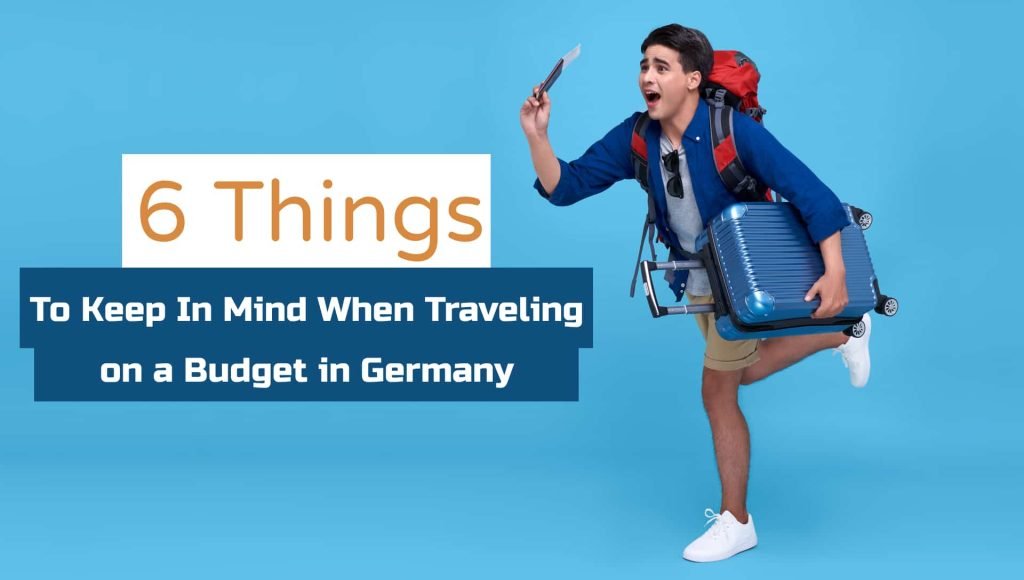
Willkommen in Deutschland, where fairy tales come to life, history echoes through cobblestone streets, and the scent of bratwurst lingers in the air. With its rich tapestry of experiences, Germany is a dream travel destination for many. From the medieval charm of Rothenburg to the pulsating energy of Berlin, this country has it all. And the best part? However, travelling in Germany need not be a thing to worry about.
There are a few things you need to consider before you plan your budget trip and allow us to introduce you to some of our secrets. We’re your personal budget wizards, revealing the enchanting secrets of travelling Germany without emptying your piggy bank.
Forget the notion that traveling through Germany requires deep pockets. We’re about to show you how to dine on schnitzel, dance through vineyards, and sleep in historic castles, all while keeping your euros in check.
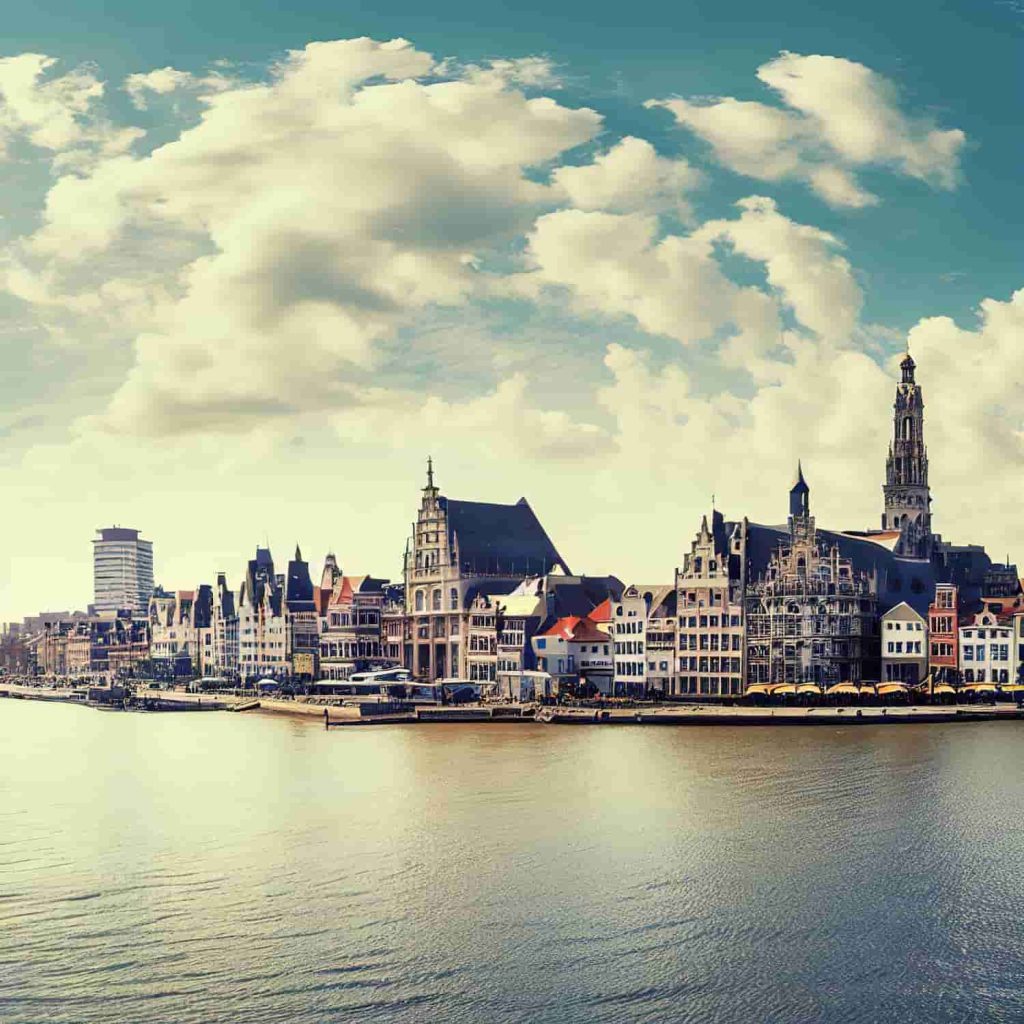
#1 Setting Realistic Goals While Travelling in Germany
Choosing the right time to travel to Germany is the first step in ensuring a budget-friendly adventure. The country experiences a wide range of weather and tourist seasons. Consider traveling during the shoulder seasons of spring (April to June) and autumn (September to October).
During these periods, you can enjoy milder weather, fewer crowds, and lower prices on accommodations and attractions. However, if you’re up for a winter wonderland, the Christmas markets in December are a magical experience, although accommodation prices might rise.
Next, setting a realistic budget is crucial. Determine how much you’re willing to spend and stick to it. Germany offers options for both luxury and budget travelers, so knowing your financial boundaries will guide your choices.
Researching affordable destinations within Germany is a money-saving game-changer. While Berlin and Munich are fantastic cities, consider exploring lesser-known gems like Leipzig, Dresden, or the picturesque villages along the Romantic Road for a more affordable experience.
Booking flights and accommodations in advance can significantly cut your expenses. Be on the lookout for deals and discounts, and consider flexible travel dates to find the best rates. Online tools and apps can help you compare prices and grab those early-bird discounts, so be sure to harness their power.
#2 Figuring Your Way Around Transportation While Travelling in Germany
In Germany, the public transportation system is not just efficient; it’s a budget traveler’s dream come true. Trains, trams, buses, and subways crisscross the entire country, making it easy to get around.
Major cities like Berlin, Munich, and Hamburg boast extensive networks, while even smaller towns are well-connected. Public transport is punctual, clean, and a great way to soak up the local atmosphere while you travel in Germany affordably. Consider purchasing a multi-day pass for unlimited travel within a city, which can be more cost-effective than individual tickets.
Saving on Train and Bus Tickets
When it comes to saving on train and bus tickets, consider the following:
- Group tickets: If you’re traveling with friends or family, group discounts are often available.
- Regional tickets: For shorter journeys, explore regional train tickets, which can be notably cheaper.
- Early booking: Purchase your train tickets well in advance to access the best fares.
- Flexible schedules: Traveling off-peak or during weekdays can result in lower ticket prices.
- Discount cards: Look into rail cards like the BahnCard for reduced fares on Deutsche Bahn services.
The Benefits of Investing in Rail Passes
For extensive types of travel in Germany, especially if you plan to visit multiple cities, consider a rail pass. The German Rail Pass offers unlimited travel for a set number of days within a month. It’s not just convenient but also cost-effective, saving you from the hassle of booking individual tickets and offering considerable savings.
If none of these are up your travel alley, consider carpooling and ridesharing services like BlaBlaCar. These options can be cheaper than traditional taxis and sometimes even public transport. Plus, you might have the chance to meet locals and fellow travelers, enhancing your experience.

#3 Budget-Friendly Accommodation While Travelling in Germany
There are several ways to save money while travelling in Germany. One of the main bleeders of money is finding the right accommodation for you. It needs to be safe, meet all your personal goals and needs, sustainable and restful. Worry not, because even on a budget, we have several options for you:
Option 1: Hostels and Budget Hotels
One of the cornerstones of budget travel in Germany is the availability of hostels and budget hotels. Whether you’re in a major city or a charming countryside village, you’ll likely find a hostel that suits your budget.
These accommodations often offer dormitory-style rooms or private rooms at wallet-friendly rates. Many hostels are not just places to sleep but also hubs of social activity, where you can meet fellow travelers and share experiences. Budget hotels, on the other hand, offer more privacy while keeping costs down. Look for accommodations with shared facilities to save even more.
Option 2: Airbnb and Vacation Rentals
For a taste of local life, consider Airbnb and other vacation rental platforms. These platforms provide a range of lodging options, from cozy apartments to charming cottages.
By opting for a rental, you can often prepare your meals, reducing dining costs. Moreover, you’ll experience a slice of everyday life in Germany that hotels may not offer.
Option 3: Camping Options
Germany is a paradise for nature lovers, and camping is a fantastic way to immerse yourself in its beautiful landscapes while staying on budget. The country boasts a network of well-maintained campgrounds.
Camping can be done with tents, caravans, or in rustic cabins. The fees are generally lower than traditional accommodations, and you’ll have the added benefit of connecting with nature.
How to Find Deals and Discounts
- Use online booking platforms and apps.
- Check websites like Booking.com, Expedia, and Hostelworld for special offers.
- Sign up for loyalty programs and newsletters for exclusive discounts.
- Be flexible with your travel dates to take advantage of varying rates.
- Keep an eye out for special promotions or events in your chosen destination, as they can affect accommodation prices.

#4 Explore Germany’s Vibrant Cuisine on a Budget
If you are going to Germany, you might as well make it a point to try as much of its diverse cuisines as possible. Don’t be disheartened about not dining in the fancy Michelin star restaurant, because the best of Germany’s foods is found among the locals.
Eating at Local Eateries and Street Food Stalls
To truly experience Germany’s culinary scene while keeping your budget intact, look no further than local eateries and street food stalls. Wander away from the bustling tourist districts, and you’ll discover cozy corner restaurants and vibrant food markets offering authentic and affordable dishes. Doner kebabs, bratwurst, currywurst , and hearty sandwiches are just a few options that won’t break the bank. Plus, these places often provide a glimpse into the daily life of locals, making your dining experience all the more rewarding.
The Benefits of Self-Catering
Self-catering can be a game-changer when it comes to budget dining. If your accommodation allows it, take advantage of local grocery stores and markets to prepare your meals. Picnicking in parks or along the riverside is a charming way to savor your self-made sandwiches, cheeses, and fresh fruits. Not only does self-catering save you money, but it also allows you to customize your meals to your taste.
Sampling Regional Dishes on a Budget
Germany is renowned for its regional cuisine, and each area has its specialties. Explore local dishes that are not only delicious but also budget-friendly. In Bavaria, try käsespätzle (cheese noodles), while in the Rhineland, indulge in a hearty plate of haxe (pork knuckle). Sampling regional specialties is a fantastic way to immerse yourself in the culture without splurging.
Avoiding Tourist Traps
While Germany has its share of tourist traps, you can steer clear of them with some savvy tactics. Seek recommendations from locals or fellow travelers, and don’t be afraid to venture a bit off the beaten path. Avoid dining at restaurants with menus translated into numerous languages, as these are often pricier. Embrace the cozy corners where locals gather, and you’re likely to find both authentic experiences and budget-friendly prices.

#5 Making the Best Out of Germany’s Tourist Spots
Now this, you need not worry about. The city in itself is a tourist attraction and there is so much to see, you will never feel like you have missed out on anything.
Look For Free or Low-Cost Attractions
Germany is home to a plethora of remarkable attractions that won’t dent your budget. Museums like Berlin’s Museum Island and the Deutsches Museum in Munich offer specific days or hours with free admission. Stroll through the historic streets of towns like Rothenburg ob der Tauber, where every corner exudes charm at no cost.
Explore the scenic beauty of the Rhine River, or enjoy the stunning architecture of cathedrals like Cologne Cathedral, where entrance is often free. Remember to check websites, guidebooks, or local advice for any free events or exhibits in the cities you visit.
Using City Passes for Discounts
City passes are a budget traveler’s best friend when it comes to sightseeing. Cities across Germany offer passes that provide discounts on public transport, free entry to numerous attractions, and even guided tours.
For example, the Berlin Welcome Card or the Munich City Pass will grant you access to many iconic sites at a reduced rate. These passes are not only cost-effective but also provide convenience, as they often include public transportation, saving you both money and time.
Participating in Guided Tours and Excursions
While guided tours might sound expensive, they can be surprisingly budget-friendly. Many cities offer free walking tours where you can explore the city’s history and culture, leaving you with the option to tip your guide according to your budget.
Additionally, look for specialized tours like food or street art tours, which provide unique experiences at reasonable prices. Guided excursions to scenic destinations like Neuschwanstein Castle or the Black Forest can also be cost-effective when booked through group tours or public transport.
Enjoying the Great Outdoors
Germany’s natural beauty is a gift that keeps on giving, and the best part is that most of it is free. Hiking through the Bavarian Alps, cycling along the Mosel River, or picnicking in the vast Black Forest costs nothing but the energy to explore.
The country’s abundance of parks and lakes offers opportunities for swimming, sunbathing, and relaxation. Don’t forget to take in the picturesque landscapes that are on display year-round, whether you’re chasing the colors of spring, basking in the summer sun, or witnessing the magic of a snowy winter wonderland.
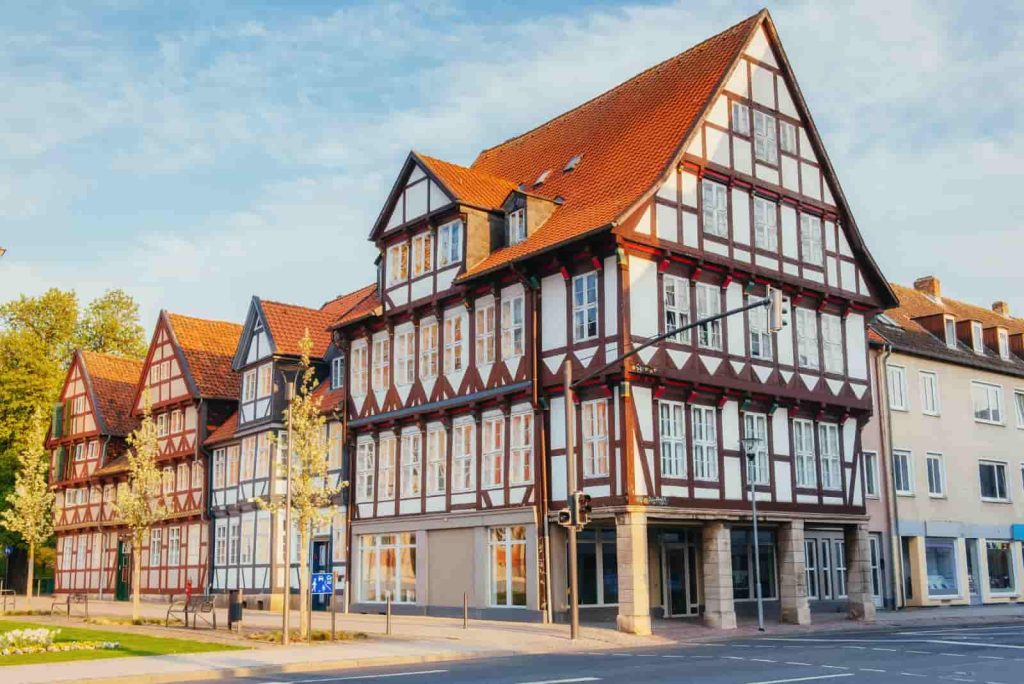
#6 Money Saving Tips: Travelling Germany on a Budget
Every budget-friendly trip is bound to go wrong once in a while. That’s why you need these extra back-up tips to make your travel through Germany a breeze.
Using Cash or Cards in Germany
When it comes to handling your money when travelling in Germany, it’s essential to strike a balance between cash and cards. Credit and debit cards are widely accepted in urban areas, but carrying some cash is handy for small purchases and in rural regions where card acceptance may be limited.
To avoid currency conversion fees, consider obtaining a travel-friendly credit card that offers favorable exchange rates. Moreover, always inform your bank about your travel plans to prevent any payment disruptions.
Taking Advantage of Student and Youth Discounts
If you’re a student or a young traveler, Germany offers a wealth of discounts that can significantly reduce your expenses. The International Student Identity Card (ISIC) provides access to a variety of student discounts on transportation, accommodation, and attractions. Additionally, keep an eye out for youth hostels, which often offer budget-friendly lodging tailored to younger travelers.
Avoiding Unnecessary Expenses
While exploring Germany, it’s essential to distinguish between needs and wants. Take a moment to reflect on whether you truly need that souvenir or another restaurant meal. Instead of shopping at expensive tourist traps, visit local markets and shops for unique, affordable items. Skip the guided tours or attractions that don’t align with your interests and budget.
Budgeting and Tracking Your Spending
Lastly, create a daily budget and stick to it. Utilize budgeting apps or simply keep a journal of your expenses. This will help you stay on track and be aware of your spending habits. Remember that a little restraint can go a long way in making your Germany adventure both memorable and cost-effective.
Prost to Penny-Pinching: Your Budget-Friendly German Travel Odyssey!
Remember, budget travel in Germany isn’t about deprivation; it’s about liberation! It’s about unlocking the hidden gems of this captivating country, indulging in the local culture, and forging unforgettable memories without financial regrets.
By choosing the right time to visit, mastering public transportation, and seeking out affordable accommodations, you’ve equipped yourself for an exceptional journey. Whether you’re savoring bratwursts, dancing at local festivals, or scaling ancient castles, you’re doing it with savvy savings.
Featured Post

How to Rent a Car in Germany? A Simple Breakdown for Newcomers

Thriving a Remote Worker in Germany: 5 Essential Tips for Maximizing Your Potential

Applying For a PR in Germany? 7 Important Things to Consider For a Smooth Sailing Process
Latest post.

Exploring the Diverse Seasons of Germany

Everything You Must Know About the Social Security Number in Germany!

Decorating Your Studio Apartment Boosts Your Mood
- Rheinsberger Str. 76/77, 10115 Berlin
- [email protected]
- +49 30 30808161 / 62
- +49 1749024284
Urban Ground Navigation

Ultimate travel guide to Germany
Welcome to the best travel guide to germany where I share all my best tips and germany travel guides, all in one page to make it easier to plan your holiday to Germany. Located in the heart of Europe, Germany is a fascinating country to visit. Known for its rich culture, diverse natural landscapes, rich food culture that includes world class beers and wines, there is something for everyone here. You have a lot of choice, from the capital Berlin with its dark but interesting history, world class museums and incredible nightlife scene to Hamburg with its rich musical heritage and rich harbourside architecture to Munich with its famous beer garden culture, beautiful gardens and world class art museums- there is a lot to choose from ( that is a just a handful of cities to give an example ) or maybe head east and checkout Leipzig , the most alternative cultural city in Germany or Dresden with its stunning architecture and amazing street art scene or maybe Gorlitz , one of Germany’s most best preserved cities- you have so much choice. In the end it all depends on how much time you have. It is such a huge country. I have lived in Germany for 6 years now and still haven’t seen some key cities or attractions like the famous Neuschwanstein Castle.
Why should you visit Germany?
I will dig a little deeper into what I think makes Germany unique and why you should consider visiting here.

1.Incredible food culture
German food often gets a bad rap for being bland and boring but its is hearty, perfect comfort food. From traditional dishes like bratwurst and schnitzel to more modern dishes, there is something for everyone to enjoy. It can be also be quite unusual and interesting: checkout my guide to the strangest most unique dishes you can try in Germany . If you are a foodie, then definitely put Hamburg on your list and follow this hamburg food guide . Plus, if you are a wine lover and looking for a holiday that combines wine with picture postcard towns and culture, then you should checkout my guide to Germany’s smallest wine region , the Saxon Wine Route .

Staasgallerie Stuttgart
2. Rich Culture
Germany is blessed with an incredible range of historic castles that will offer you a unique glimpse into the country’s rich history. ( If you fancy staying in a castle without splurging, checkout my guide to the best castle hostels in Germany ) Germany is also home to some of the best museums in the world where you can discover world class art like Picasso, Kandinsky, Caspar David Friederich or if you are a fan of American pop art, a visit to the Staasgallerie Stuttgart is a must ( has an incredible collection of American Pop Art with Lichtenstein and Warhol prominently featuring ) If you are a street art lover, you will be spoilt for choice in Germany. Here is my guide on how to create your own streetart tour of Germany . Also, Germany is home to some incredible festivals : my favourite festivals in Germany are the Oldenburg Film Festival ( amazing platform for independent cinema ) and Vogelball in Hamburg ( read about this festival and other cool things to do in my introduction to Hamburg guide )

Sunset, Wyk Auf Fohr
3. Spectacular Natural Beauty
From the Black Forest to the Bavarian Alps and the North Sea, Germany is blessed with so much natural beauty. If you are looking to get off the beaten track and into nature, checkout my guide to the things to do in Fohr or maybe one of the North Frisian islands like Wangeroog e or if you are planning a trip to Bavaria, consider a visit to Garmisch Partenkirchen .
4. Affordable Travel
One of the reasons why I love Germany and made this country my base is that is really affordable for a Western European country, So if you are a budgettraveller like me, this country is perfect. PS Checkout all my Germany on a budget travel guides.
5. Friendly People
One of the biggest myths about Germany is that are cold, reserved people. I have found Germans are known for their warmth and hospitality, making it easy to make new friends during your stay.
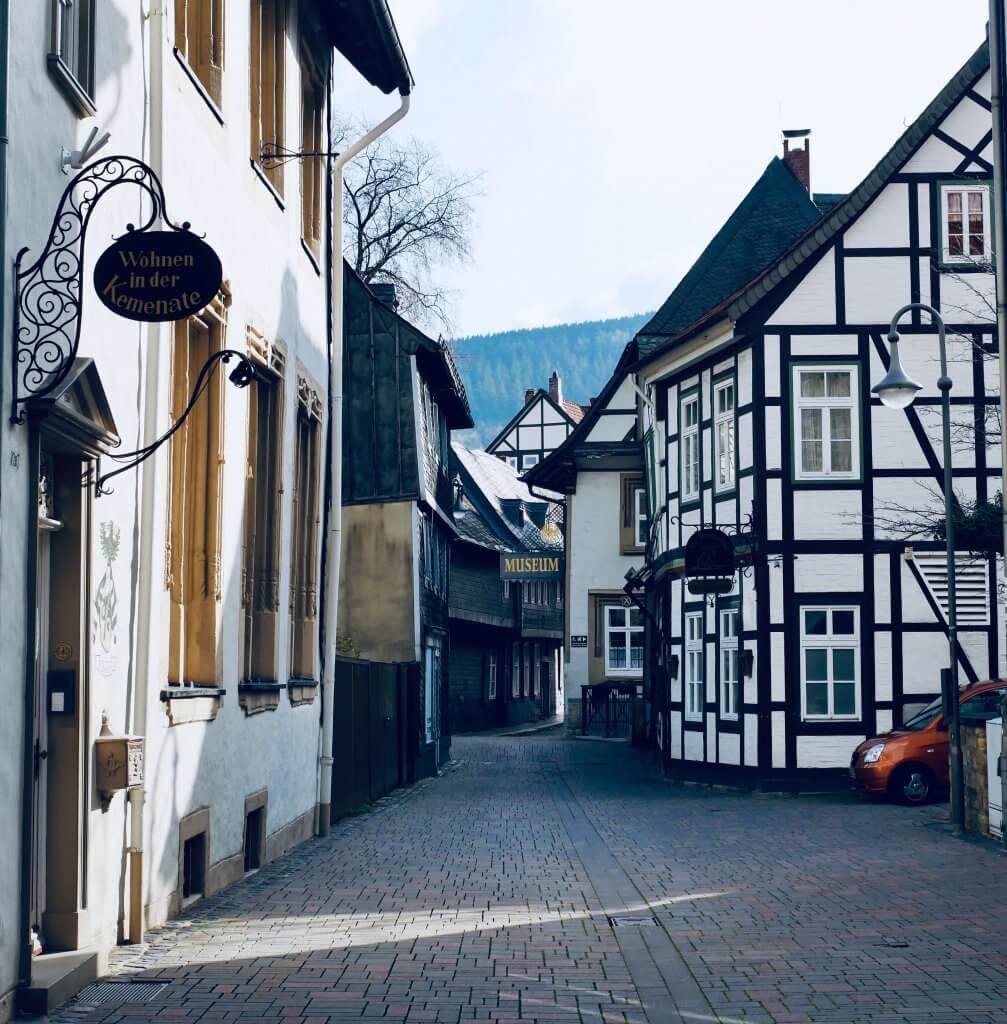
Planning Your Trip to Germany: 5 things to consider
While Germans speak excellent English, it also helps to learn some key German phrases when travelling through Germany.
Here 15 basic German phrases to master
– Guten Tag: “Good day” or “hello.”
– Auf Wiedersehen : “Goodbye.”
– Bitte : “Please.”
– Danke : “Thank you.”
– Entschuldigung : “Excuse me.”
– Ja : “Yes.”
– Nein : “No.”
– Gute Nacht : “Good night.”
– Hallo : “Hi” or “hello.”
– Bitte schön : “You’re welcome.”
– Ich Liebe Dich : “I love you.”
– Ein Bier : “A beer.”
– Ein Glas Wein : “A glass of wine.”
– Können Sie mir helfen ? Can you help me?”
– Wo ist das Badezimmer ?: “Where is the bathroom.
2. Currency
In Germany, the Euro is the main currency. There are plenty of ATM’s to withdraw cash at airports and train station but try to have some Euros handy with you before you fly. Ideally don’t leave this till the last minute and buy Euros at the airport where you will get the worst exchange rate. Always carry cash when you are in Germany. For a country as advanced as Germany, it is shocking how bad the country is when it comes to accepting card payments.
3. Visa and Entry Requirements
Depending on your nationality, you may need to get a visa before entering Germany. Checkout the website of the Federal Foreign Office of Germany which has an excellent overview of visa requirements for visiting Germany.
The climate in Germany varies, depending on where you are visiting and the time of year. Summers can be hotter in the south then the north. The north tends to be wetter ( Hamburg for example ) also. With climate change and the lines blurring between seasons, it is always tough to predict so do check the forecast ( I recommend Accuweather ) before traveling and pack accordingly.
5. Mobile Internet in Germany
Here is my guide on how to get affordable mobile internet access in Germany.
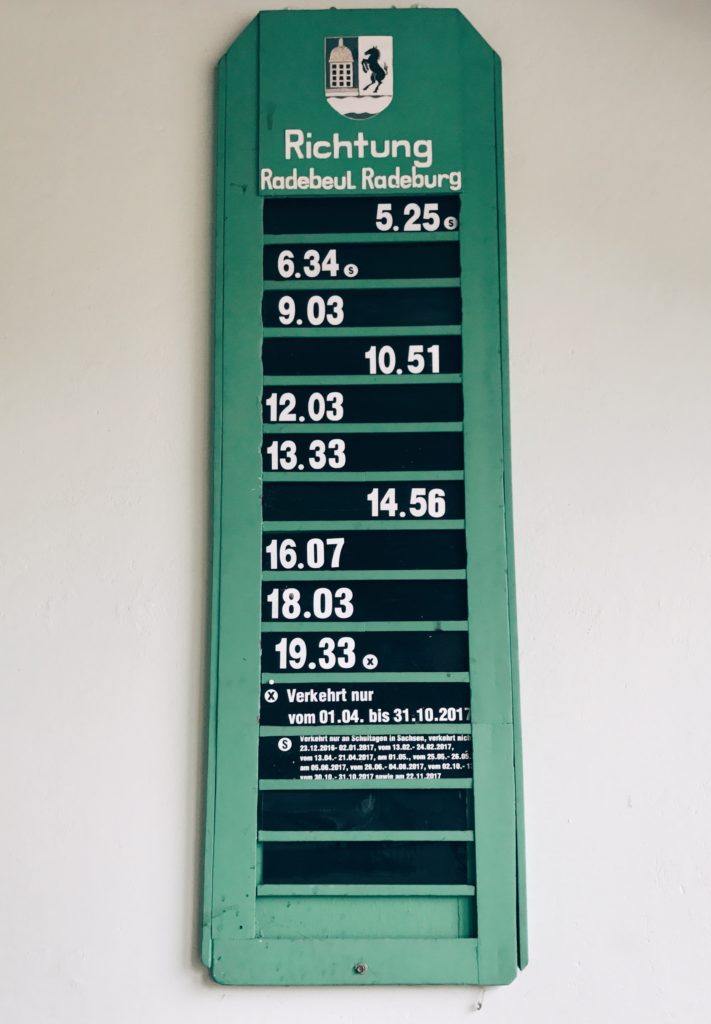
Radebeul Radeburg Steam Railway- One of Germany’s most unique train journeys is a must when visiting Germany
How to use Public Transport in Germany
Germany has a fantastic public transportation system that allows you to travel at ease, no matter what your budget. The main train operator is Deutsche Bahn plus there are a few niche, low-cost train operators like Flixtrain . You can get some incredible deals on train travel booking 2-3 months in advance ( Super Saver Tickets) so do try to book these in advance. If you are travelling on a budget and looking to book more closer to your date of travel, definitely look into low cost bus companies like Flixbus who have some incredible fares ( Berlin to Munich for as little as €21.99 ) There is obviously airlines like Ryanair and easyJet but give the time, cost of travelling to and from airports in Germany plus the hassle of flying nowadays ( cost of luggage ) keep this as your last resort. Also worth noting that all key German cities have Uber and Bolt.
If you are a first time user of Uber, use my code: hywvm824pb5s which will give you €5 of your first 5 trips.

Circus Berlin Hostel
How to book accommodation in Germany
There is a whole range of accommodation options catering to all types of travellers and budgets.
If you are on a tight budget, Germany has a rich hostel scene. Some of my favourite independent hostels in Germany include the Circus Hostel Berlin , Superbude Hamburg , Die Wohnhgemeinschaft , Eden Hostel and Multitude Hostel Leipzig and the Dock Inn Warnemunde .
There is the Jugendherberge network of hostels in Germany – think of it as the equivalent of the YHA Hostels in UK and Australia. The Jugendherberge hostels are bit different from your average hostel: not so so big on the social factor but otherwise in terms of location, facilitates, location and value- they are unbeatable. From hostels on treetops to all inclusive hostels by the North Sea in Neuharlingsiel to the abandoned holiday resort that Hitler built in Rugen ( subsequently converted into a youth hostel ) , there is an astonishing range of hostels to choose from.
In terms of budget friendly hotels, my go to site is booking.com
In terms of price, value for money, I am a big fan of Ibis Budget Hotels and also Motel One ( tend to be pricier depending on the city ) plus Moxy is popping up in some locations. There is also A&O Hostels/Hotels but there are the most bland, boring hostels/hotel brand in Germany and I would not recommend staying here.
Before you travel, just in case you are asked at immigration, keep a print out of your hostel or hotel booking ( In case your wifi does not work in Germany ) and also proof of your travel insurance.
When you check in to your accommodation, by German law you need to show your ID so keep your passport / National ID ready. You will have a short form to fill in so keep a pen handy too. ( I always forget to carry a pen ) Payment ,unless done in advance a, is usually required at the time of check-in. The hotel may accept cash or credit cards, so be prepared with the necessary payment method.
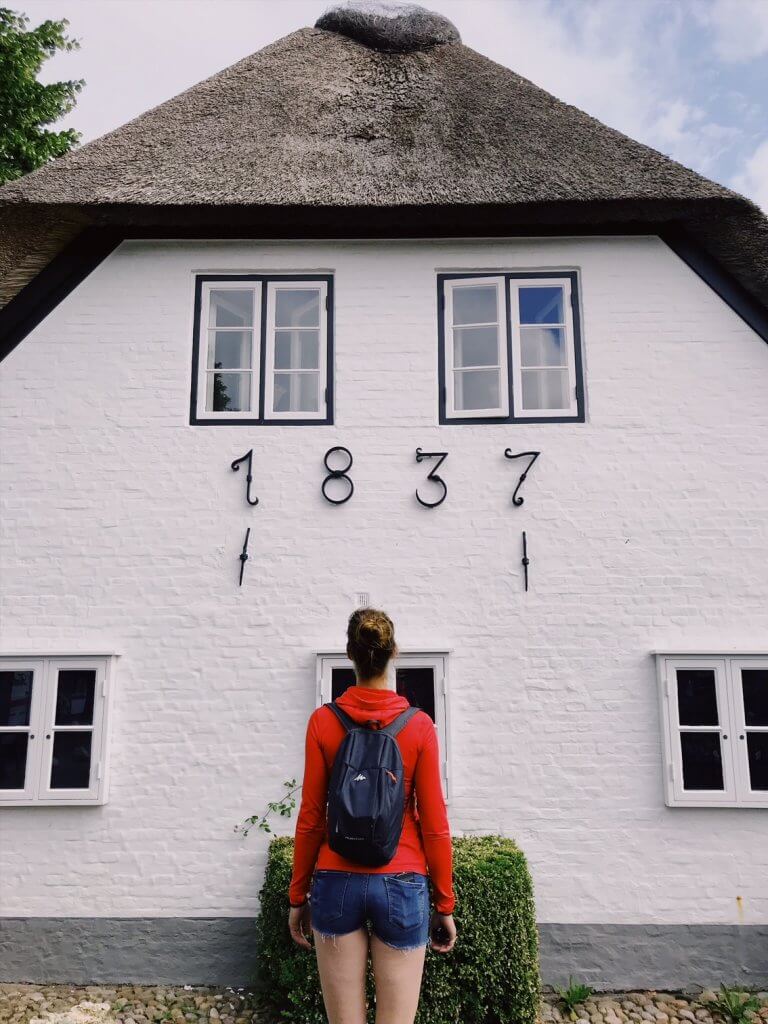
Essential Germany travel guides
1. Things to do in Bautzen
2. 48 hours in Meissen , the porcelain city of Germany
3. 7 best things to do in Bochum
4. Best things to do in Dortmund
5. Perfect day trip from Berlin: Potsdam
6. Best things to do in Goslar
7. Self guided walking tour of Berlin Mitte
8. Free things to do in Berlin
9. Best budget places to stay in Berlin
10. 48 Hours in Bremen
11. 48 Hours in Nuremberg
12. Football break in the Ruhr Valley ( Piece for the iPaper )
13. Short break in Hamburg ( For Wanderlust Magazine )
14. Short break in Lubeck ( For Wanderlust Magazine )
- Travel Planning Guide
Travel Budget for Bavaria Visit Bavaria on a Budget or Travel in Style
- Bavaria Costs

- Bavaria Hotel Prices
- Cities in Bavaria Hotel Prices
- Best Adults Only Hotels in Bavaria
- Best Cheap Hotels in Bavaria
- Best Business Hotels in Bavaria
- Best Romantic Hotels for Couples in Bavaria
- Best Family-Friendly Hotels in Bavaria
- Best Hotels for First Time Visitors in Bavaria
- Best Luxury Hotels in Bavaria
- Best Hotels for One Night in Bavaria
- Best Hotels for One Week in Bavaria
- Best Party Hotels in Bavaria
- Best Pet-Friendly Hotels in Bavaria
- Best Hotels for Scuba Diving in Bavaria
- Best Hotels for Skiing in Bavaria
- Best Hotels for a Weekend Getaway in Bavaria
- Is Bavaria Expensive?
- How much does a trip to Bavaria cost?
- Germany Costs
- Wernigerode
- Baden-Baden
- How much does it cost to travel to Bavaria? (Average Daily Cost)
- Bavaria trip costs: one week, two weeks, one month
Is Bavaria expensive to visit?
- How much do I need for a trip to Bavaria?
- Accommodation, Food, Entertainment, and Transportation Costs
- Travel Guide
How much does it cost to travel to Bavaria?
You should plan to spend around $162 (€151) per day on your vacation in Bavaria. This is the average daily price based on the expenses of other visitors.
Past travelers have spent, on average for one day:
- $39 (€36) on meals
- $22 (€20) on local transportation
- $177 (€165) on hotels
A one week trip to Bavaria for two people costs, on average, $2,270 (€2,118) . This includes accommodation, food, local transportation, and sightseeing.
All of these average travel prices have been collected from other travelers to help you plan your own travel budget.
- Travel Style: All Budget (Cheap) Mid-Range Luxury (High-End)
- Average Daily Cost Per person, per day $ 162 € 151
- One Week Per person $ 1,135 € 1,059
- 2 Weeks Per person $ 2,270 € 2,118
- One Month Per person $ 4,864 € 4,539
- One Week For a couple $ 2,270 € 2,118
- 2 Weeks For a couple $ 4,540 € 4,237
- One Month For a couple $ 9,728 € 9,079
Are You an Experienced Traveler?
Help other travelers! Answer a quick question about your past travels. Click here: let's do it!
How much does a one week, two week, or one month trip to Bavaria cost?
A one week trip to Bavaria usually costs around $1,135 (€1,059) for one person and $2,270 (€2,118) for two people. This includes accommodation, food, local transportation, and sightseeing.
A two week trip to Bavaria on average costs around $2,270 (€2,118) for one person and $4,540 (€4,237) for two people. This cost includes accommodation, food, local transportation, and sightseeing.
Please note, prices can vary based on your travel style, speed, and other variables. If you're traveling as a family of three or four people, the price per person often goes down because kid's tickets are cheaper and hotel rooms can be shared. If you travel slower over a longer period of time then your daily budget will also go down. Two people traveling together for one month in Bavaria will often have a lower daily budget per person than one person traveling alone for one week.
A one month trip to Bavaria on average costs around $4,864 (€4,539) for one person and $9,728 (€9,079) for two people. The more places you visit, the higher the daily price will become due to increased transportation costs.
Independent Travel
Traveling Independently to Bavaria has many benefits including affordabilty, freedom, flexibility, and the opportunity to control your own experiences.
All of the travel costs below are based on the experiences of other independent travelers.
Prices in Bavaria are reasonable and comparable to your average travel destination. Hotels, food, and sightseeing are generally within normal price ranges.
Within Europe, which is known to be an expensive region, Bavaria is a moderately priced destination compared to other places. The overall cost of travel here is fair for the region and comparable to many other destinations.
For more details, and to find out if it's within your travel budget, see Is Bavaria Expensive?
How much money do I need for a trip to Bavaria?
The average Bavaria trip cost is broken down by category here for independent travelers. All of these Bavaria travel prices are calculated from the budgets of real travelers.
Accommodation Budget in Bavaria
Average daily costs.
Calculated from travelers like you
The average price paid for one person for accommodation in Bavaria is $88 (€83). For two people sharing a typical double-occupancy hotel room, the average price paid for a hotel room in Bavaria is $177 (€165). This cost is from the reported spending of actual travelers.
- Accommodation 1 Hotel or hostel for one person $ 88 € 83
- Accommodation 1 Typical double-occupancy room $ 177 € 165
Hotel Prices in Bavaria
Looking for a hotel in Bavaria? Prices vary by location, date, season, and the level of luxury. See below for options.
Find the best hotel for your travel style.
Kayak helps you find the best prices for hotels, flights, and rental cars for destinations around the world.
Transportation Budget in Bavaria
The cost of a taxi ride in Bavaria is significantly more than public transportation. On average, past travelers have spent $22 (€20) per person, per day, on local transportation in Bavaria.
- Transportation 1 Taxis, local buses, subway, etc. $ 22 € 20
Recommended Services
- Private Scenic Transfer from Nuremberg to Munich with 4h of Sightseeing Viator $ 268
- Private Transfer from Munich to Vilshofen with 2 hours for sightseeing Viator $ 251
Flights to Bavaria
Rental cars in bavaria, food budget in bavaria.
While meal prices in Bavaria can vary, the average cost of food in Bavaria is $39 (€36) per day. Based on the spending habits of previous travelers, when dining out an average meal in Bavaria should cost around $16 (€14) per person. Breakfast prices are usually a little cheaper than lunch or dinner. The price of food in sit-down restaurants in Bavaria is often higher than fast food prices or street food prices.
- Food 2 Meals for one day $ 39 € 36
Recommended
- Lunch Like a Local: Munich's ORIGINAL Viktualienmarkt Food Tour Viator $ 141
- Private - Viktualienmarkt Food Tour and Beyond - best Munich tastings Viator $ 229
Entertainment Budget in Bavaria
Entertainment and activities in Bavaria typically cost an average of $28 (€26) per person, per day based on the spending of previous travelers. This includes fees paid for admission tickets to museums and attractions, day tours, and other sightseeing expenses.
- Entertainment 1 Entrance tickets, shows, etc. $ 28 € 26
Recommended Activities
- Munich Segway Tour Viator $ 44
- Camp Zeppelin Tour in Spanish Viator $ 19
Tips and Handouts Budget in Bavaria
The average cost for Tips and Handouts in Bavaria is $59 (€55) per day. The usual amount for a tip in Bavaria is 5% - 15% .
- Tips and Handouts 1 For guides or service providers $ 59 € 55
Scams, Robberies, and Mishaps Budget in Bavaria
Unfortunately, bad things can happen on a trip. Well, you've just got to deal with it! The average price for a scam, robbery, or mishap in Bavaria is $9.38 (€8.75), as reported by travelers.
- Scams, Robberies, and Mishaps 1 $ 9.38 € 8.75
Alcohol Budget in Bavaria
The average person spends about $25 (€23) on alcoholic beverages in Bavaria per day. The more you spend on alcohol, the more fun you might be having despite your higher budget.
- Alcohol 2 Drinks for one day $ 25 € 23
- The ORIGINAL Munich Christmas Market Festive Wine Tour -with food Viator $ 141
- Private mulled wine tour in Würzburg Viator $ 55
Water Budget in Bavaria
On average, people spend $8.51 (€7.94) on bottled water in Bavaria per day. The public water in Bavaria is considered safe to drink.
- Water 2 Bottled water for one day $ 8.51 € 7.94
Bavaria On a Budget

Food and Dining
Transportation.
We've been gathering travel costs from tens of thousands of actual travelers since 2010, and we use the data to calculate average daily travel costs for destinations around the world. We also systematically analyze the prices of hotels, hostels, and tours from travel providers such as Kayak, HostelWorld, TourRadar, Viator, and others. This combination of expenses from actual travelers, combined with pricing data from major travel companies, gives us a uniqe insight into the overall cost of travel for thousands of cities in countries around the world. You can see more here: How it Works .
Subscribe to our Newsletter
By signing up for our email newsletter, you will receive occasional updates from us with sales and discounts from major travel companies , plus tips and advice from experienced budget travelers!

Search for Travel Costs
Some of the links on this website are sponsored or affiliate links which help to financially support this site. By clicking the link and making a purchase, we may receive a small commission, but this does not affect the price of your purchase.
Travel Cost Data
You are welcome to reference or display our travel costs on your website as long as you provide a link back to this page .
A Simple Link
For a basic link, you can copy and paste the HTML link code or this page's address.
Travel Cost Widget
To display all of the data, copy and paste the code below to display our travel cost widget . Make sure that you keep the link back to our website intact.
- Privacy / Terms of Use
- Activities, Day Trips, Things To Do, and Excursions
- Work & Careers
- Life & Arts
Germany raises forecasts on boost to outlook for industry and consumers

- Germany raises forecasts on boost to outlook for industry and consumers on x (opens in a new window)
- Germany raises forecasts on boost to outlook for industry and consumers on facebook (opens in a new window)
- Germany raises forecasts on boost to outlook for industry and consumers on linkedin (opens in a new window)
- Germany raises forecasts on boost to outlook for industry and consumers on whatsapp (opens in a new window)
Guy Chazan in Berlin and Martin Arnold in Frankfurt
Simply sign up to the German economy myFT Digest -- delivered directly to your inbox.
The German government has slightly upgraded its growth forecast for this year, as it sees early signs of a recovery in household spending power and industrial output in Europe’s largest economy.
Germany was the world’s worst-performing major economy last year, with gross domestic product contracting 0.3 per cent and experts warning that it risked becoming the “sick man of Europe”.
But the government said Germany’s economy would grow 0.3 per cent this year, slightly up from its last forecast in February of 0.2 per cent. It forecast an expansion of 1 per cent in 2025, which would still be weaker than expected in many of the world’s major economies.
The energy price shock caused by Russia’s cuts to gas exports after its invasion of Ukraine and a decline in global trade hit Germany harder than other leading economies, while a surge in inflation and high interest rates weighed heavily on Germans’ consumer spending.
But evidence of a turnaround, though modest in scale, is beginning to mount, helped by the fact that wholesale gas and electricity prices have returned to levels before Russia’s full-scale invasion two years ago, providing much-needed relief for industry.
Robert Habeck, economy minister, said Germany was seeing “increasing signs that the economy is gradually recovering and the outlook brightening”. He said industrial production had been “rising noticeably” since the start of the year, even in energy-intensive industries.
Habeck’s ministry added that lower inflation, the prospect of lower interest rates later this year, rising wages and incomes, a stable labour market and stronger exports would all boost activity.
That chimes with the expectations of some leading economists, who predict that inflation will slow more than wages, boosting household spending power and making it likely the European Central Bank will start cutting interest rates in June.
German consumer price inflation slowed to 2.2 per cent in March, its lowest annual rate since June 2021, and the government now expects it to average 2.4 per cent over the whole of 2024, down from 5.9 per cent in 2023.
“Finally people have more money in their pockets and will, as things stand, spend this money,” Habeck said. “Purchasing power is increasing.”
The upward revision for growth came as one of Germany’s leading economic think-tanks, the Ifo institute, announced that business confidence had risen to its highest level for almost a year, lifted by hopes that lower inflation will boost household spending.
The Ifo said its business climate index , based on a survey of 9,000 companies, had risen 1.5 points to 89.4, above the forecasts of economists polled by Reuters, to reach its highest level since May 2023.
Ifo said sentiment improved in most sectors, particularly services. “Companies were more satisfied with their current business. Their expectations also brightened,” said Clemens Fuest, Ifo president.
But Habeck warned that, despite the positive economic news, Germany had to pick up the pace on structural reform. It had “fallen way behind” in terms of competitiveness, and there was an urgent need to reduce bureaucracy, reform European capital markets and tackle a dire skills shortage.
“The biggest short-term structural challenge is the reluctance [of many industries] to invest,” he said. “Any real upturn would be delayed if the construction industry [and] the machine-building industry don’t make the necessary investments in the transformation or in new capital goods.”
Promoted Content
Follow the topics in this article.
- Eurozone inflation Add to myFT
- Eurozone economy Add to myFT
- Global Economy Add to myFT
- German economy Add to myFT
- Energy crisis Add to myFT
International Edition
Money latest: Why you shouldn't buy a TV in May; how to get free upgrade on a flight
Data shows TVs get more expensive in May and mobile phones in October. Read this and all the latest consumer and personal finance news below, plus leave a comment in the box.
Thursday 2 May 2024 10:46, UK
- New ISA rules were supposed to help savers - right now they've just made everything more complicated
- Why you shouldn't buy a TV in May (or a mobile phone in October)
- Key dates for Spotify customers, energy bills, free childcare and interest rates in May
Essential reads
- How to nab yourself a free upgrade on a flight
- You're probably washing and storing your clothes wrong. Here's what you should do instead
- State pensions 'could be in doubt for future generations'
- One of UK's top chefs reveals best Cheap Eats in Norfolk - and cling film tip for amazing veg
- Money Problem : 'Builders won't repair dodgy work - what are my rights?'
- '£2,000 landed in my account' - The people who say they're manifesting riches
Ask a question or make a comment
One of the world's leading economic authorities has warned the UK that borrowing should remain expensive until the rate of price rises eases further and stays there.
Interest rates, which are at a post-2008-era high of 5.25% , should stay there, according to the Organisation for Economic Co-operation and Development (OECD).
"The fiscal and monetary policy mix is adequately restrictive and should remain so until inflation returns durably to target," the OECD's economic outlook for 2024 said.
It's an endorsement for the approach of the Bank of England whose statements on inflation have not indicated an imminent rate cut.
It may not come as a surprise, but the prices of a whole range of items fluctuate throughout the year.
It isn't always easy figuring out what is best to buy when - but a price comparison website has dug into the numbers.
PriceSpy has analysed its price history data to help direct shoppers to the best time of year to buy common, popular products.
This table should help:
Its analysis shows June is a great month to get yourself a lawn mower but if you're after a barbecue, you're best off waiting until December.
Organised parents can take advantage of LEGO price drops in September for Christmas presents.
PriceSpy estimates consumers can save more than £800 on the "peak pricing premium" by following its advice.
Following our feature on how assigning a lasting power of attorney may be more important than drawing up a will, a Money reader got in touch with a query...
As a married couple of 53 years, all our accounts are in joint names - so do we need lasting power of attorney? Thank you! David
We asked Joanna Grewer, partner at Roythornes Solicitors, to respond: "If you have accounts in joint names then the account can be accessed by the person who has capacity.
"However, this won't entitle the capacitous person to deal with any of the income which comes into that account for the non- capacitous person, such as pensions, or to manage any outgoings in that person's name.
"If both parties lost capacity, then there would be no access to funds at all."
This feature is not intended as financial advice - the aim is to give an overview of the things you should think about. Submit your dilemma or consumer dispute, leaving your name and where in the country you are, by emailing [email protected] with the subject line "Money blog". Alternatively, WhatsApp us here .
By James Sillars , business reporter
Another cent has come off oil costs over the past 24 hours - hopefully signalling better news for drivers ahead.
A barrel of Brent crude is currently costing just over $84 and had been trading at $83 in Asian trading.
It had stood above $90 a month ago as the crisis in the Middle East played out.
Evidence of a cooling in tensions between Israel and Iran have assisted the downwards trend.
The FTSE 100 began the day by erasing the losses seen on Wednesday.
A solid set of results for Shell helped the index climb by 0.3% in early deals...
Shell shares were more than 1% higher on the back of better than expected profits.
It revealed further shareholder awards in the form of a dividend and share buyback.
Online gamblers who lose £500 a month or more will face financial vulnerability checks.
Checks will come into force from 30 August.
The figure will reduce to £150 a month from 28 February next year.
The Gambling Commission said this would help identify acutely financially vulnerable online customers, such as those subject to bankruptcy orders or with a history of unpaid debts.
The checks will only use publicly available data and will not require gambling operators to consider an individual's personal details such as postcode or job title.
As well as light touch checks, the commission said a pilot of enhanced assessments would go ahead, aimed at preventing cases where customers are able to spend large amounts in a short time without any checks, resulting in significant gambling harm.
It's not uncommon to feel uncomfortable with flying - but we'd probably all feel a bit better if we were sitting in first class, wouldn't we?
The lucky few might be able to pay for themselves, but for the rest of us, frequent flyer experts Flight Hacks have shared their top tips to get a free upgrade (and you can let us know your tips for getting upgrades in the comments box above)...
Stay loyal to one airline
Many airlines have a rewards scheme that offers free upgrades, early check-in and even free flights to loyal customers.
One research survey found 80% of staff said a customer in the airline's frequent flier scheme would be more likely to receive a free upgrade.
Plus, getting early check-in could place you first in line to secure a seat in the plane's front section.
Travel alone or during quieter times
Let's face it, a single person on an empty flight is much more likely to get an upgrade than a family of six on a booked-out plane.
Try flying in the middle of the week or at off-peak times to get a quieter plane.
Dress to impress
If you're dressed smartly and look like a frequent flier, this can boost your chances of getting an upgrade.
Business travellers are an airline's favourite type of passenger as they fly regularly and are more likely to spend freely on their company cards - so it could be worth dressing in business attire.
Don't be afraid to ask
It doesn't hurt just to enquire, as long as you're polite.
Be flexible
Airlines will frequently overbook flights to compensate for no-shows and ensure the planes are full.
If there aren't enough seats after everyone checks in, they will often offer incentives to passengers willing to switch to a later flight.
This can mean seat upgrades or cash incentives.
Take advantage of special occasions
If it's your birthday, honeymoon or a special anniversary, it could be worth casually dropping this into conversation with the check-in staff.
Be polite when checking in
Perhaps all of these tips should be caveated with the need to remain polite.
As there is often no strict criteria on how airline staff may choose to give out free upgrades, the number one tip is to be nice.
Travel expert Immanuel Debeer, from Flight Hacks, says "being respectful and friendly is by far the best way to increase your chances of an upgrade".
"There are plenty of simple tricks to increase your chances of getting an upgrade, but the most important thing to remember is that airline staff are human."
Every Thursday Savings Champion founder Anna Bowes gives us an insight into the savings market and how to make the most of your money. Today she's focusing on ISAs after new rules came in last month. ...
New ISA rules were introduced from 6 April that should make opening and funding ISAs simpler. But what many people may not realise is that ISA providers do not need to implement most of the new rules – and many haven't yet, or may have no intention of doing so.
As a result, savers have been left scratching their heads, unsure if their ISA provider will allow them to make use of the rules or not.
What are the key new rules?
Harmonise ISAs to those over 18: This is not an optional change. The minimum opening age for adult cash ISAs is now 18, so not good news for those aged 16 and 17 who previously could have funded a junior ISA and an adult cash ISA.
Allowing multiple ISA subscriptions: People should now be allowed to open and pay into multiple ISAs of the same type in a single tax year. Previously people could only pay into one of each type of ISA every tax year, unless their ISA provider offered what we called "portfolio ISAs".
A portfolio ISA (other names for this have been used such as "ISA wallet" with Paragon Bank) allows savers to open more than one cash ISA with the same provider in the same tax year - but only a small number of providers offer it, such as Paragon, Aldermore and Charter Savings Bank, Nationwide and Ford Money.
With the new rules, savers assume they can open more than one ISA with either more than one provider or with the same provider. However, our research has shown that while many providers will allow you to open another cash ISA with them if you have already opened and funded an ISA with someone else in the current tax year, this doesn't mean they have adopted the portfolio ISA rule – so you may not be able to open two ISAs with them.
Partial transfers allowed: Partial transfers of ISA funds for the current tax year should be allowed, rather than being forced to transfer the whole amount of your current tax year ISA. Previously you could only make a partial transfer of old ISAs; you'd have to transfer the current tax year's ISA entirely.
Once again not many have adopted this rule yet.
The bottom line
So, while in theory these new changes should have made ISAs more flexible, in reality they have added an extra complication for savers and the bottom line is that you need to ask your existing and potential ISA providers about which of the rules they have adopted or are looking to adopt.
The pet supply retailer has opened two convenience stores in a move to branch out from its typical retail park sites.
The stores, which are in Sutton, south London, and Whetstone, north London, will sell a range of pet owner essentials and offer an advice counter.
They are much smaller than the usual Pets at Home stores and will not have the typical vet and grooming services.
Speaking to Retail Week, the chain did not confirm whether it would be opening more high street stores in the future.
Pets at Home Sutton store manager Rachel Etherington told the news outlet the location would "allows us to provide pet owners with convenient access to all their pet care essentials, as well as expert advice from our specially trained colleagues, right on their doorstep".
The Fed has issued its latest policy statement, announcing it will keep interest rates at the same level.
It did note inflation has eased over the past year, and it is still leaning towards eventual reductions in borrowing costs.
However, it pointed to recent disappointing inflation readings, suggesting moves towards more balance in the economy had stalled.
If you're wondering why we're telling you this, it's because there is a link between the Fed's interest rate and the Bank of England's base rate.
The interplay between the two can affect the value of the pound and currency alternatives such a gold.
Market expectations for the UK base rate are often heavily influenced by what's going on in the US.
Untreated sewage was released into designated shellfish waters for 192,000 hours last year, new research has found.
The hours of sewage dumping were spread across 23,000 separate incidents.
Some fishing waters in Cornwall were forced to close last year after high levels of e.coli were found in oysters and mussels, and norovirus can also be transported via human waste.
Read the full story here ...
Shares in luxury carmaker Aston Martin have plummeted as much as 14% today after it announced bigger than expected losses.
Aston Martin revealed adjusted pre-tax losses of £111m for the first three months of the year, compared with £57m a year earlier.
Analysts had expected a loss of £93m.
The losses were due to higher finance costs and the timings of its car launches.
B&Q is introducing plastic plant pot recycling stations at more than 100 of its stores across the UK.
Customers will be able to drop off their unwanted pots in store so they can be recycled and turned into new planters.
B&Q's 100% recycled plastic Blacksmith Planters will be available in stores for £4.
Be the first to get Breaking News
Install the Sky News app for free


IMAGES
VIDEO
COMMENTS
Food Budget in Germany Average Daily Costs. Calculated from travelers like you. While meal prices in Germany can vary, the average cost of food in Germany is $43 (€40) per day. Based on the spending habits of previous travelers, when dining out an average meal in Germany should cost around $17 (€16) per person.
Prices start at €18.90 for a 24-hour pass that includes transport within the main metro area. The Frankfurt Card is even cheaper, costing just €12 for an unlimited 24-hour public transport pass with various discounts on museums, zoos, and tours as well. It's €19 for two days, and includes travel to/from the airport.
The average cost of a 7-day fun trip to Germany from North America is $1800 per person. This budget covers your $800 round-trip flight tickets from most major airports and leaves you $130 to spend daily. The $130 daily average covers $50 for accommodation, $20 for transportation, $30 for food, and $30 for activities and attractions.
A comprehensive budget travel guide to Germany with tips on things to do, costs, ways to save, transportation, accommodation, and more! Nomadic Matt's Travel Site. ... Food - Food in Germany is very cheap (and hearty). Meat is a staple of most meals, especially sausages; there are over 1,500 different kinds of sausages in Germany (sausages ...
Hostels are located in most major tourist cities around Germany, such as Berlin, Munich, Frankfurt, Hamburg, and Cologne. They are also in smaller cities like Leipzig, Nuremberg, Dresden, Heidelberg, and Dusseldorf. Hostels in Germany cost around 16-30 Euros per night for a dorm bed.
Food and Activities: - Exploring Germany on a Budget. Daily food budget: $30-40. Free walking tours: Berlin and Leipzig. Museums: $10-15/entry. Total food and activities costs: $600-800. Overall, this itinerary offers a diverse range of experiences and sights throughout Germany, while still staying within a budget.
The cost of a trip to Germany can vary greatly depending on your travel style and itinerary. On average, budget travelers can expect an average cost of around 50-70 euros per day on accommodation, food, and transportation.
Berlin Travel Costs. Hostel prices - Dorms cost 17-25 EUR per night while private rooms for two cost around 45-56 EUR per night. Free Wi-Fi and lockers are standard in all hostels in Berlin. Most hostels also offer free coffee/tea and have a kitchen and bar on site.
Nuremberg on a Budget. Nuremberg is a gorgeous medieval city with a whole lot of history. It's located an hour north of Munich, which makes it worth a visit when you travel Germany. Basically, all of the main attractions in Nuremberg are within walking distance of each other, so you'll save tons of money on transport.
Germany Budget Travel Guide 2023. April 24, 2023 Robyn Good Add comment. Germany is a fascinating country to explore, with a rich history, diverse culture, and stunning scenery. The country is also a great destination for budget travelers, with many affordable options for accommodation, food, and activities.
Here are some tips for saving money on accommodation in Germany. Stay in Hostels/ Budget Accommodation: hostel dorms 10-20 Eur up to 45-55 in peak X. The cheapest accommodation options in Germany are definitely hostels. In the off-season, you can get a hostel bed for as little as 10-20 euros per night!
Germany on a Budget: €525-€600/ Week + Flights. If you are trying to stretch every penny you have and are being VERY conscious about your spending, you might be able to spend about 600 Euro/ week, which includes daily lodging, food, transportation, and daily activities.
Traveling and sightseeing in a cheap way (hostels, cheap food), you can fit into a budget from 71.31 EUR (76.56 USD) to 87.47 EUR (93.91 USD). On the other hand, a slightly higher standard (3-star hotel, meals in restaurants) you should expect to spend from 118 EUR (127 USD) to 153 EUR (164 USD). You should additionally take into account that ...
Germany is also known for its vibrant festival culture, and attending local festivals and events can be a budget-friendly way to experience the country's traditions and celebrations. From Oktoberfest in Munich to Christmas markets across the country, these events offer a lively atmosphere, local food, and often free entertainment.
On average, a meal at an inexpensive restaurant or a fast-food joint will cost around 7-10 EUR per person. For a mid-range restaurant, expect prices to range from 15-25 EUR per person. If you're looking for a fine dining experience, be prepared to spend 40 EUR or more per person. 3.
Allocating around $500 to $800 for accommodation expenses for a 5-day trip to Germany is a reasonable estimate. Food and Dining Costs. Germany is known for its delicious cuisine, from hearty traditional dishes to international flavors. When it comes to dining out, there are options to suit every taste and budget.
Discover cost-effective ways to explore Germany and get budget travel tips and considerations for an affordable journey while travelling in Germany. ... Eating at Local Eateries and Street Food Stalls. To truly experience Germany's culinary scene while keeping your budget intact, look no further than local eateries and street food stalls. ...
Budget Accommodation in Germany. If you are really looking to travel on a shoestring in Germany, then your best bet is to find cheap accommodations on your route. Hostel dorm rooms are available for 10-20 EUR per night and if you want a private room, you can spend up to 60 EUR per night at either a hostel or budget hotel.
Flammkuchen. If you crave a slice of pizza while touring Germany, then you must try Flammkuchen which is the German version of pizza. To make it dough is rolled into a rectangular shape then toppings such as thinly sliced onions, cheese, lardons, mushrooms, vegetables, etc. are added. The dough is then placed in a wooden oven to bake.
Welcome to the best travel guide to germany where I share all my best tips and germany travel guides, all in one page to make it easier to plan your holiday to Germany. Located in the heart of Europe, Germany is a fascinating country to visit. Known for its rich culture, diverse natural landscapes, rich food culture that includes world class beers and wines, there is something for everyone here.
Food Budget in Bavaria Average Daily Costs. Calculated from travelers like you. While meal prices in Bavaria can vary, the average cost of food in Bavaria is $39 (€36) per day. Based on the spending habits of previous travelers, when dining out an average meal in Bavaria should cost around $16 (€14) per person.
German consumer price inflation slowed to 2.2 per cent in March, its lowest annual rate since June 2021, and the government now expects it to average 2.4 per cent over the whole of 2024, down from ...
Money latest: McDonald's to start selling bigger burgers - as it makes very rare changes to classic items. The fast food giant has revealed its chefs have created a "larger, satiating burger" in a ...